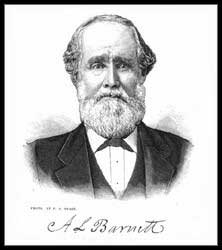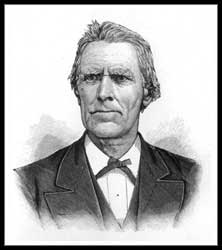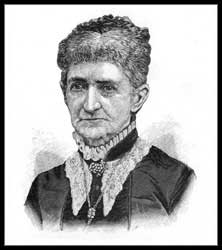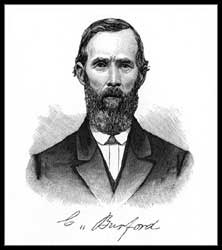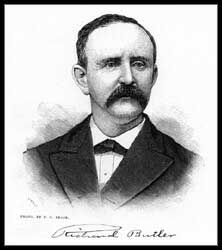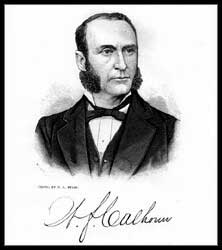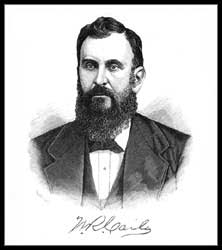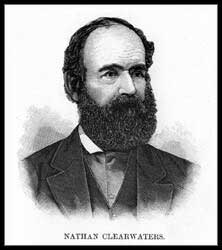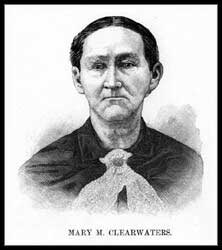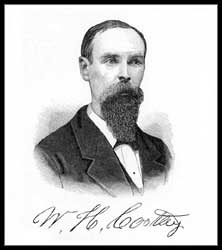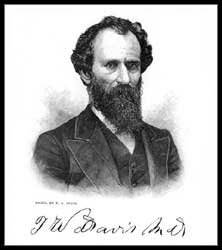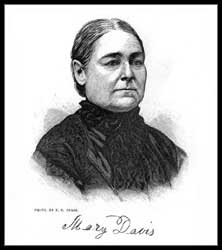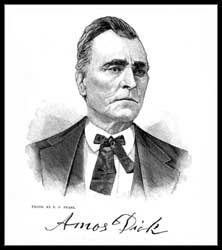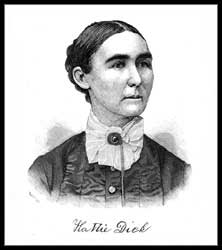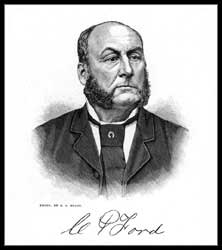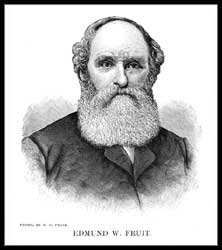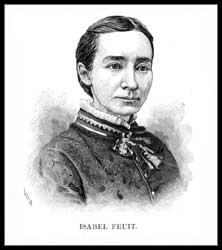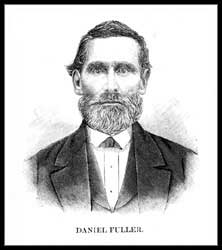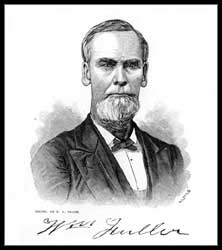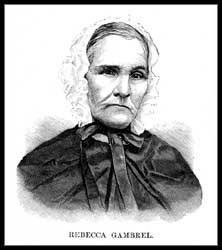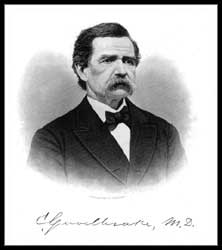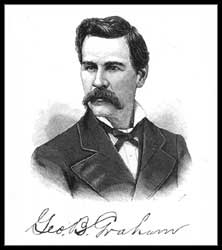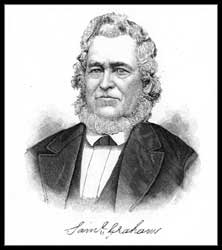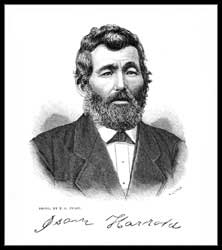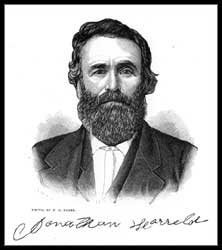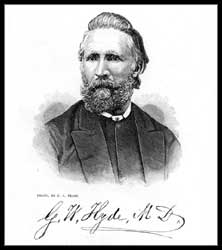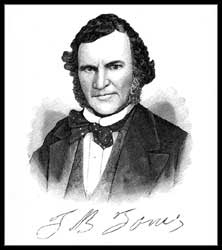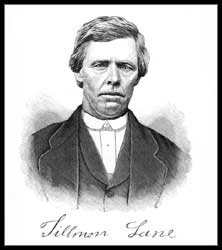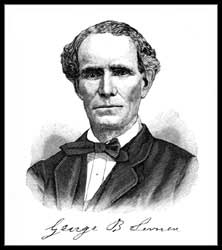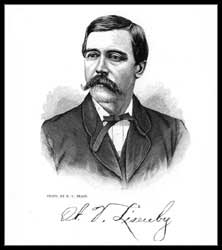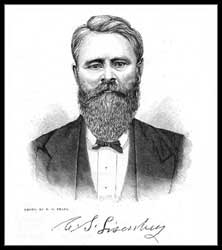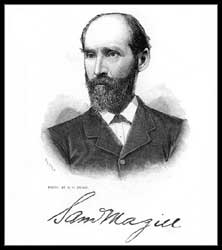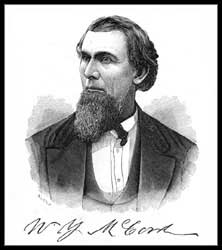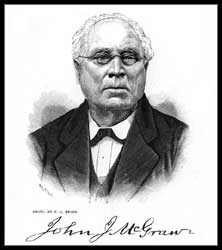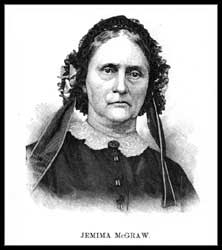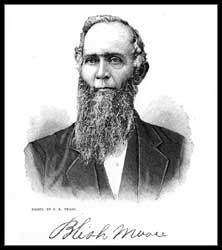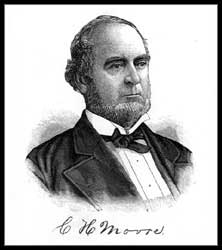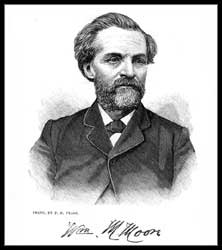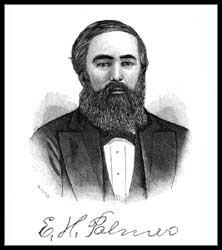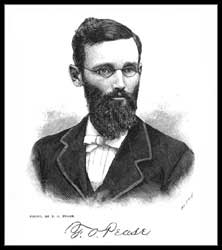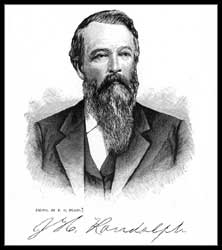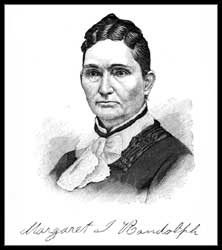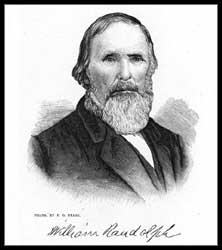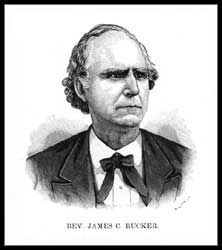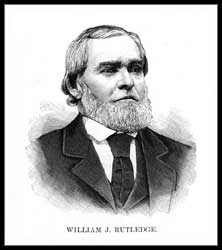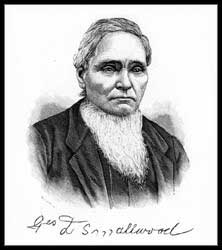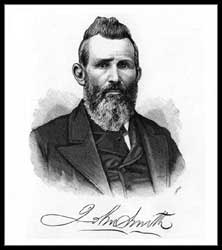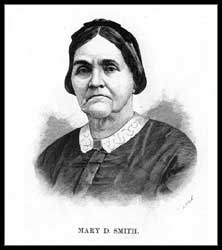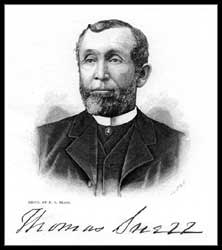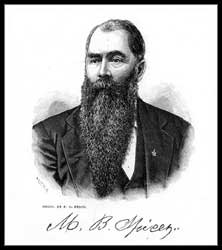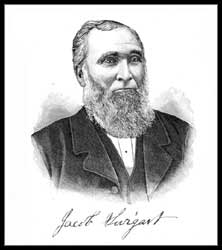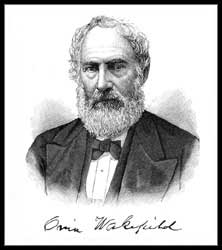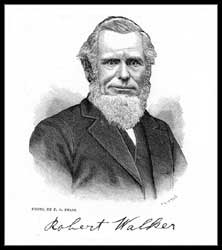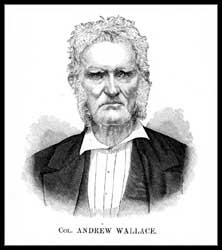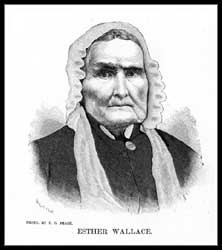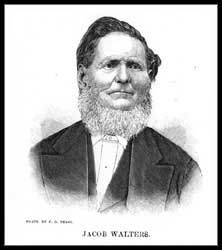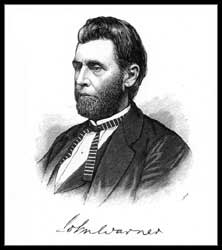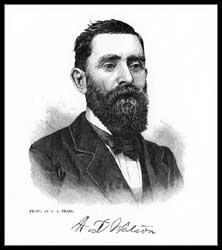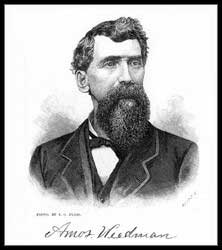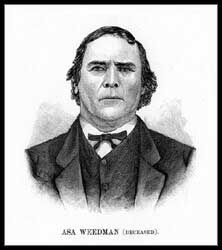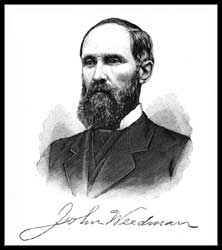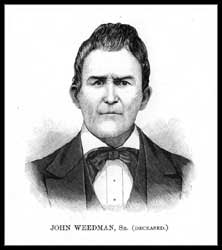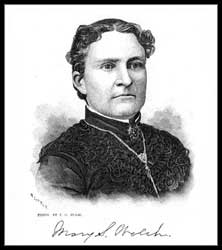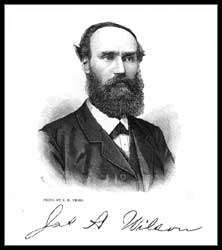BIOGRAPHICAL SKETCHES
History of DeWitt County, Illinois: with illustrations descriptive of the scenery, and biographical sketches of some of the prominent men and pioneers. Philadelphia, PA.: W. R. Brink & Co., 1882.
DANIEL H. ARBOGAST. (Page 236)
Was born in Clark county, Ohio, May 27th, 1827. David Arbogast and wife, the grandparents of the subject of this sketch, were natives of Germany. They emigrated to America and settled in Virginia. The family moved to Ohio at an early day and subsequently moved to Madison county, Indiana, where the grandparents died. Henry, his son (and father of D. H.), was born in Pendleton County, Virginia, in August 1791. He came from Clark county, Illinois, in October 1838, and the following winter settled near Lexington in McLean county. In March following he moved to DeWitt county and settled on section ten in DeWitt township, where he resided until a short time before his death. He died December 6th, 1871, in his eighty-seventh year. He married Mary Huffman, daughter of Christian Huffman. She was born in Pendleton county, Virginia, in 1787. She died April 12th, 1853, in her sixty-seventy year. By the union of Henry and Mary Arbogast there were fifteen children, twelve of whom grew to maturity, and eight are still living. Daniel H. was in his twelfth year when the family came to DeWitt county. He here grew to manhood and remained at home at work on his father's farm, until he was twenty years of age, then he commenced working for himself. He worked for the farmers around in the neighborhood, rented land and raised a crop, and did such general work as fell to his hand. He soon after got into handling stock, and was principally engaged in that business from 1855 to 1870. In the latter year he commenced the manufacture of brick, and has given nearly all of his attention to that business since that time. He manufactured all the brick with a few exceptions that are in the brick buildings now standing in Farmer City. Taking all-in-all Mr. Arbogast has been unusually successful. He has met, like most of men, with some reverses, yet has no particular reason to complain of his lot. On the 25th of February 1849 he was united in marriage to Miss Minerva Payn. She was born in Tennessee, May 29th, 1829. She is the daughter of John A. G. and Catherine Payn, who came to Indiana in 1830, and in 1841 settled in Will county, Illinois. Mrs. Arbogast was stopping with her grandfather Payn in this county when she was married. Nine children have been born to Mr. and Mrs. Arbogast; seven sons and two daughters. Their names in the order of their birth are, Elizabeth J., who is the wife of Arthur Webb; Lydia Ann, wife of John Sweeney; John, who married Susan Muir; Amos, married Mary Griffith; Edward, Sherman, Walter; Grenade who died in his tenth year; and George who died in his infancy. Both he and his wife are members of the M. E. Church. Politically he has been a Republican since 1856, when he voted for John C. Fremont. His maternal grandfather Huffman was a soldier in the Revolution, and his father Henry was a soldier in the Indian War of 1817. Mr. Arbogast is a plain straightforward man, and much respected in the community.
ALEXANDER L. BARNETT. (Page 177)
This country, the asylum for the oppressed of all lands, has been greatly enriched by virtue of religious persecutions throughout different parts of Europe. Perhaps none of these persecutions has contributed more of patriotic zeal in proportion to the number who sought homes here, than that of the old Scotch Presbyterians. Driven from their mountain-fastnesses, they first sought protection in Northern Ireland, and from thence came thitherward. To this class belong the ancestors of A. L. Barnett. When William Penn was directing the tide of emigration to his colony near Philadelphia they joined the movement; thence went to Virginia. So that John Barnett, the father of the subject of this sketch, was born in Augusta county, Virginia, January 28th, 1781. His wife, Sallie Kenney, was of the same stock with himself. About 1789 the Barnetts threaded their tedious way over the mountains to Kentucky, the "land of promise" in the eyes of pioneers, John riding behind his father on a pack-horse. They located in Bourbon county, where Alexander was born October 15, 1810, being the third of the family in order of birth. At present there are but three living: Alexander, James, and Sarah; whilst Robert Franklin, Mary (who was killed by lightning), Juliet, Elizabeth, and William have passed away.
Mr. Barnett acquired a fair education when young, which has become rich in experience during his active life. He came to DeWitt county in the year 1832. Was elected surveyor (the first in the county) May 6, 1839, an office he held continuously for twenty years and six months. Then after a respite of almost equal time he was again elected in 1879, and now holds the position. Politically he has been during most of his life a Democrat, having cast his first ballot for Martin Van Buren. In 1832 he lost his vote (a fact always regretted, as he was an admirer of Andrew Jackson), because being on his way from Kentucky to Illinois; but he had the honor of seeing a number of enthusiastic hoosiers drinking to "Old Hickory's" health. Of late years, he has identified himself with the Greenback party.
He was married to Elizabeth H. Hall, November 20, 1834, by whom he has had twelve children, five of whom died in infancy-three of them being triplets, and died when quite young-and there are now living six. His wife is a most estimable woman, a member of the Christian church, and quite an active laborer in the Master's cause. Mr. Barnett is possessed of a strong, vigorous mind, excellent constitution and great determination of character. He is a man whom his neighbors love to honor.
JOHN and MINERVA BISHOP. (Page 211)
John Bishop was born at Exeter, England, and was the son of Nathaniel and Ann (Beardsley) Bishop, who had a family of nine children; five girls and four boys. In 1829 Nathaniel Bishop left England for New Brunswick, Nova Scotia, and settled with his family on the James River. John, a mere youth, found employment in the lumber business so extensively carried on in that vicinity. In 1847, in conjunction with a brother, he came to Illinois and purchased a farm at Elgin, in which occupation he continued until 1853 when, with his brother, William, he launched out into the grain and stock business at Freeport. In the Summer of 1855 they came to Clinton, erected an elevator and engaged in the grain and lumber business, which they successfully operated in partnership together; and no firm stood higher at home or abroad for honesty and liberality in business than that of John and William Bishop.
In August, 1863, John Bishop was united in marriage with Miss Minerva Moore, the daughter of Isaac and Philona (Blish) Moore. Miss Moore came to Clinton about 1848, and resided with her brother, C. H. Moore, until the date of her marriage.
In 1867, John Bishop sold out his interest in business to his brother William, and retired to the peace and quietness of private life. In an imposing building, which he had erected in the north part of the city, he and she spent their time and money in beautifying their house, taking care of their flowers, and entertaining their friends. None enjoyed the society of their friends and neighbors more than Mr. and Mrs. Bishop. Their house was always open, and the closing of their doors by death was regarded as a great calamity to all the social interests of the city. Generous to all, their charities were of that quiet kind which was concealed from all but the givers and receivers. Mrs. Bishop's death occurred in 1880, some time after that of their youthful daughter and only child. Mr. Bishop did not long survive his wife, but died on the 10th of August, 1881.
WILLIAM BOOTH. (Page 213)
The present efficient Prosecuting Attorney for DeWitt county was born in Greene county, Ohio, on the 24th of April, 1849. His father, John by name, was a farmer, who brought his family to this county in 1857, locating in Waynesville township. William Booth attended the common district school until 1864, when, full of patriotic fervor—although both too young and too small to carry a musket—he slipped away from home and became a drummer-boy with Co. I, 145th Regiment, Illinois Volunteers. It is related that both himself and an associate got into the breeches he drew when be first became a "soger-boy". He was with the command about five months. Upon his return home, he applied himself to his books with renewed zeal; attending a select school in Waynesville, taught by Prof. Turner, then the Wesleyan University at Bloomington, where he graduated in 1873. To him belonged the honor of being valedictorian in a class of nine. Returning home, he accepted the Principalship of the Waynesville Public Schools, in which position he continued for three years. He next entered the law office of Rowell & Hamilton, in Bloomington, as a student; then went to Springfield, where he continued reading under the guidance of Orendorff & Creighton. In January, 1879, he was admitted to practice at the bar, and at once located in Clinton, where he was elected Prosecuting Attorney. He was dependent upon his own exertions largely in securing an education. At college he refused to join other students in many pastimes engaged in from sheer necessity. At Springfield his last five dollar bill went for board just before his admittance to the bar. The firm with whom he studied loaned him money with which to pay for his license. Possessed of plenty of pluck and energy, he is acquiring a fine practice in his chosen profession, and is making many friends. In politics he is a straightforward and outspoken Republican, one who is proud of having cast his first ballot for Gen. U. S. Grant for President. He is a member of the Order of the Knights of Pythias, in whose workings he takes a lively interest.
CARY BURFORD. (Page 233)
The Burford family, on the paternal side, is of Scotch ancestry and Scotch-Irish on the maternal. Milton Burford, the grandfather of Cary, was a native of Virginia. Soon after the Revolutionary War he moved his family to Kentucky, where his son, whose name was also Milton, married a Shields. In 1807, the family moved to the Territory of Indiana and settled in Harrison county. Cary Burford was the son of Milton. He was born in Mercer county, Kentucky, April 5, 1806. He grew to manhood in Indiana, and there, on the 29th of January, 1829, married Miss Anna Shields, daughter of Jesse and Katie Shields. She was born in East Tennessee, near Knoxville, February 26, 1806. Her family, as well as the Burfords, were pioneers of three states; viz:, Tennessee, Kentucky, and Indiana. Mr. Burford, after his marriage, engaged in farming till 1831, when he turned his attention to mercantile pursuits and opened a general store in Mockport, and the next year went to Amsterdam; and soon after moved on a farm, tilled it, and sold goods, in which he continued fifteen years. He was there robbed, had his house burned, and he left that part of the country and went to Missouri and other states. In 1854 he settled in Marion county, Illinois, and engaged in farming until 1865, when he moved to McLean county. In 1869, he moved to Leroy and in 1870 came to Farmer City, and here went into business under the firm name of C. Burford & Sons. In 1873 he practically retired from business, and until his death, which occurred August 23, 1879, lived a quiet life, calmly awaiting the dread summons that was to usher him into a brighter and better life.
At the age of twenty-seven he joined the M. E. Church, and from that time forth lived as a true and devoted Christian. In later years he became a member of the Cumberland Presbyterian church, and was ever after a ruling elder in that Christian denomination. In 1873, at the organization of the First National Bank of Farmer City, he became the first vice-president, which position he retained until his death. By the marriage of Cary and Anna (Shields) Burford, there were twelve children, ten of whom reached maturity, two died in infancy. Their names, in the order of their birth, are: Mary Jane, wife of Abraham Fleshman, of Harrison county, Indiana; Catherine Isabel, wife of James Highfill, a resident of same county; Margaret, wife of Thomas Highfill, died in 1864, leaving three children; Anna Elizabeth, wife of Samuel Briley, a resident of McLean county, Illinois; Jesse Hilton, eldest son, is one of the firm of Burford Bros. He married Anna H., daughter of Elihu and Frances Gessford, by which union there are four children, named: Mattie Helen, Cora May, Stella Frances, and Pearl. Cary S., of the same firm, married Miss Barbara L., daughter of Asa and Delilah (Hand) Weedman. They have two children named Nellie and Jessie. Nancy H., the wife of W. W. Murphey; William T. married Elizabeth, daughter of Isaac and Nancy Becket, by which union one daughter living, named Maud. Mrs. W. T. Burford died January 15, 1876. He afterwards married Miss Emma, daughter of A. J. and Jane McWilliams. James C. married Miss Barbara L., daughter of Conrod and Katy Hottle. They have two sons named Guy and Ivan. John H. married Miss Mattie, daughter of Otho and Providence Merrefield. Jesse M., Cary S. and William T. carry on the mercantile business, and are recognized as among the most enterprising and substantial business men of Farmer City. They are all men of well-known honesty of character and, in both business and private capacity, enjoy the confidence and esteem of the entire community. The sons, as well as their father before them, are Republicans in politics and advocates, in both theory and practice, of the cause of temperance. Jesse M. is a member of the I. O. O. F., and William T. of K. of Pythias.
RICHARD BUTLER. (Page 175)
Editor and proprietor of the Clinton Public, is a native of Canada, was born in Coteau du Lac on the 11th of November, 1834. His father and mother were born in Ireland, and came to Canada but a few months before the birth of their son. His father, Michael Butler, was a soldier in the British army, and died at the age of thirty-four. His mother died in March, 1874, leaving Richard the only surviving member of a family of thirteen children. During the early years of the life of the subject of this sketch he fully experienced the keen pang of poverty. His mother being left a widow with four young children, and without means, had to fight the battle of life with the odds against her. Richard's education was limited, having when he was but ten years old to begin work to help support the family. For two years he worked with a confectioner and baker in Montreal, but his health failing he had to try a change of occupation. He drifted from one class of work to another till finally he became an apprentice in the office of the London Free Press in 1849. From there he went to Hamilton and worked in the Canada Christian Advocate and other printing offices. In 1852 he went to Rochester, New York, and from that time to the present has been a resident of the United States, excepting a short time he spent in Hamilton, Canada, before and after his marriage. On the 19th of October, 1857, he was married to Miss Kate Scoll, of Niagara, Canada, the services being performed by W. G. Wright, pastor of the M. E. Church. In 1859 he left Canada, and came to Cincinnati, Ohio, where he worked as a compositor in the book room of the Methodist Book Concern, and on the Cincinnati Daily Enquirer. On the 1st of March, 1862, he bought the office of the Oxford (Ohio) Citizen, which paper he published, excepting a few months he was in the army during the war, till 1869, when he sold the Citizen and bought the Oberlin News. Butler's idea of a newspaper did not suit the faculty of Oberlin College. They wanted a religious paper; he published a newspaper in which the local events of Oberlin had due prominence. In disgust he sold his paper after two years' hard work, to a theological student who had graduated from Oberlin College, and years afterward lost $1,000, through this same religious youth. His recollections of Oberlin are not pleasing in view of that $1,000 he lost by one of its shining lights. He then determined to follow Horace Greeley's advice and come west. His first point was Burlington, Iowa, where for a time he held the position of city editor on the celebrated Burlington Hawkeye. Not feeling at home while working for other masters than himself he came to Clinton, and on the 1st of March, 1872 bought the Clinton Public. During his ten years in Clinton he met with fair success in business, and is now filling the office of postmaster. Butler is an ardent Republican in politics and a strong believer in the temperance cause. Both of these issues find in him a vigorous champion. He is not a believer in a third party movement to advance the cause of temperance, but insists that the Republicans are the true friends of all reforms, and that the only hope for success in temperance legislation lies through the Republican party. In the local city elections he advocates the anti-license principle, and with some measure of success, for during the past ten years the city has been under an anti-license administration for more than one-third of the time. As an Editor and manager of a newspaper, Mr. Butler has demonstrated his ability to give the people of De Witt county an excellent journal to whose support they can graciously contribute.
W. F. CALHOUN. (Page 183)
Was born in Perry county, Pennsylvania, November 21, 1844. His parents were John and Catharine Calhoun, nee Kiner. W. F. Calhoun enlisted as a private in Co. H, 133d Penna. Vols. Infty. July, 1862 was the second Bull Run fight, South Mountain, Antietam, Fredericksburg and Chancellorsville, after which he was mustered out by reason of expiration of term of service. Soon after he enlisted as a private in Co. K. 20th Penna. Vol. Cavalry, which regiment was sent to the Shenandoah valley in the winter of 1864, and participated in the battles fought by Siegel, Hunter and Sheridan. At the battle of Piedmont, near Harrisburg, Virginia, on the 6th day of June, 1864, the company to which he belonged and Co. E. of the same regiment, in a charge on the enemy's rifle pits, captured five hundred men, and in an effort to recapture them, General Jones, commanding the rebel forces was killed. In this charge Calhoun's horse was killed under him. After this battle the colonel appointed him orderly sergeant of his company. During the campaigns of Sheridan he was frequently detailed to carry orders across territory in possession of the enemy, and at other times to do scouting service with small details of men. He accompanied his regiment in Sheridan's last raid from Winchester to Petersburg, and from thence to Dinwiddie Court House and Five Forks, where the 5th U.S. Cavalry and the 20th Penna. Vols. opened the series of engagements that ended in the surrender of General Lee's army. An incident of the Doctor's army life is worthy of record. At the battle of Fredericksburg, where his regiment before charging on the enemy at Mayre's Hill was ordered to unsling their knapsacks, his contained a Testament, the gift of his mother, whose name and place of residence was inscribed on the fly-leaf. Another regiment opened the knapsacks; one of the men carried the Testament with him, and during the battle was killed. The party burying the dead, thinking the Testament bore the name of the person killed, inscribed that name on the grave-mark, and is so recorded in the national cemetery at Fredericksburg. The Testament was returned to his mother after the war, and by this means the facts were made known. The Doctor came to Illinois in October, 1865, locating in Ottawa, La Salle county, where he began the practice of dentistry in 1867. There he was married to Miss Blanche Derthick, who was born in Medina county, Ohio, February, 1852. In 1870 the Doctor moved to De Witt county, where he has since resided. For two years he was Mayor of Farmer City. In 1877 he was the Republican candidate for county clerk - made a gallant fight, but democrats and greenbackers having combined against him, he and the entire ticket were defeated. In 1880 he was chosen chairman of the Republican County Central Committee, and at the State Convention of that year was chosen a member of the State Central Committee. During the campaign he made a number of speeches.
WILLIAM R. CARLE. (Page 265)
The world loves to honor those who through their own exertions and by virtue of native ability acquire enviable positions in life. Success is largely measured by one's acquisition of property, and he who begins in poverty and unaided works his way to wealth is looked upon as successful in life. To this class belongs William R. Carle, who was born in Wellsburg, West Virginia, March 24th, 1832. His parents were John Carle and Rebecca Carle, (nee Miller) natives of Pennsylvania. His grandfather, Ephraim P. Carle, who lived in New Jersey, was a Hollander; his wife, Nancy Clark, was of Scotch origin. William R. was the eighth in order of birth in a family of nine children. His father was a carpenter by trade but forsook its following for the more lucrative business of manufacturing cotton cloth. He erected a factory in Williamsburg and, in company with others, opened a store in connection therewith. In 1857 the company failed, so that William, whose advantages had been good for the acquisition of knowledge, found himself confronting a cold world, penniless. Although poor in means, he was rich in energy, tact and talent. He left his native home for the west; reaching St. Louis he found cholera rearing its harvest of death, and so made his way north-ward to Bloomington. Here he took charge of a public school just outside the limits of the city. For this work, his attainments, commanding presence and excellent judgment well fitted him. His success is attested by many patrons, and further by the fact that his services were in demand. He taught in Major's Grove without interruption, summer and winter, for three years; when having saved some means, he formed a co-partnership with David S. Hord in the grain business. The new firm bought a warehouse just being constructed and had the misfortune to lose it by fire when it was ready for occupancy. With commendable energy they built upon its ruins and within thirty days were in occupation. In 1859 he disposed of his interest to his partner. As indicative of the fact that his a-b-c's in the grain trade was dearly bought experience, he found himself barely square with the world financially upon closing out his share in the business. In April, 1859, he formed a co-partnership with Sabin Taylor, to prosecute the grain trade in Clinton, which they did in the place now occupied by Emmett Kent. He disposed of his interest in July and in August located in Wapella, where he worked for an old Englishman named Dixon for $1.25 per day. At the expiration of two months' service, Dixon proposed a partnership if he would raise one hundred dollars. He at once went to Bloomington, where he was well known, and borrowed the amount on thirty days' time. This business move proved eminently successful and through its means was laid the foundation of a competency enjoyed by the subject of this sketch. Mr. Carle continued in the grain trade until the fall of 1862, when he disposed of it to E. Kent & Co. and bought a stock of general merchandise. In the dry goods trade he continued until 1865, when he again entered the grain trade combining with it dealing in lumber, this time in connection with E. B. Harrold. This arrangement was continued a year, when he pursued the business alone until 1869; when he went to California on account of failing health, returned after a single season's sojourn in the Golden State, and resumed the general merchandise business here. In the fall of 1870, he was elected a member of the 27th General Assembly, by a majority of two hundred and forty votes. As a member, the fine business tact, integrity and earnestness that have ever followed him through life gave him a reputation as an able legislator. The same year, 1870, he was elected President of the Clinton National Bank, a position he held for three years. Mr. Carle has continued in the grain trade since his return from his California trip, and also for part of the time in general merchandising. Politically, Mr. Carle is an active outspoken Democrat, as undeviating in his devotion as the needle to the pole. In religion he is just as firm and faithful to the Disciple's faith, contending earnestly for the restoration of the primitive order of things. Possessed of rare social qualities, unquestioned integrity of character, he enjoys the respect and esteem of hosts of friends. His tall, athletic figure, being six feet four inches in height and proportionally built, commands attention among his fellows. His business career, so uniformly successful since he gained his first foothold in 1869, calls for admiration and emulation.
NATHAN CLEARWATERS. (Page 221)
The subject of the following biographical sketch is one of the pioneers of De Witt county, and the oldest settler now living in the township. He is a native of Green county, Tennessee, and was born May 7, 1807. Reuben Clearwater, his father, was a native of North Carolina, and his mother, whose maiden name was Jane Miller, was born on the south branch of the Potomac river, in Virginia. She came with her parents to Tennessee, and there married Reuben Clearwaters. The family removed to Highland county, Ohio, in 1810, and in 1820 went to Indiana, and settled in Franklin county; then went to Monroe, and subsequently to Putnam county; and in 1830 came to Illinois, and settled in Vermillion county. Two years later he moved to Buckle's Grove in McLean county, and there remained until his death, which took place in 1866, at the advanced age of 85 years. His wife died in 1864, aged 72 years. Nathan remained in Vermillion county until 1832, when he came to what is now known as Santa Anna township, then a part of McLean county. He squatted on a tract of land, on which the town of Farmer City now stands. When the lands came into market he purchased the forty and afterwards entered three other "fortys." He laid out the town, and his wife gave it the name of Mount Pleasant; a name which it retained until a few years ago, when it was changed to Farmer City. When Mr. Clearwaters came to this part of the county there were but three families living here. The heads of the families are all gone, and he and his wife are the only remaining settlers who came here in 1832. He married Mary M. Danner while he was living in Montgomery county, Indiana. The date of the marriage was August 7th, 1828. She was born in Harrison county, Indiana, November 29th, 1812. There were eleven children, the offspring of that marriage. The names of those living, in the order of their births, are Absalom, Melenda, who is the wife of John Griffith; America, wife of Hardy Shoemaker; Reuben Allen Patton, Wesley. Both he and his estimable wife are members of the M. E. Church. Mrs. Clearwaters is one of the six persons who helped to form the first class in Methodism in this part of the county in 1833. The others were Dennis Hurley and wife, Richard Kirby and wife, and Julia McCord. Mr. Clearwaters is an original Jacksonian Democrat. He cast his first vote for the hero of New Orleans in 1828, and from that time to the present has given his allegiance to that political organization.
Much of the history of Nathan Clearwaters and his brother pioneers will be found in the Pioneer chapter of this work, and in history of Sana Anna township; and it would be mere repetition to reproduce it here. We can but pay our tribute of respect to this venerable couple who have come down to us from a former generation, and we echo the sentiment of the entire community when we say that both carry with them the esteem, goodwill, and kindly feelings of all who have the pleasure of knowing them.
PETER V. H. COOL. (Page 237)
Peter Cool, the grandfather of the present Cool family, was a native of Pennsylvania and of German descent. He emigrated to Ohio and in 1853 came to Illinois and settled in Bloomington, where he died. He married Sophia Harris, and one of the offspring of that union was Noah H. Cool, the father of Peter. He was born near Zanesville, in Muskingum county, Ohio, and came to Bloomington, Illinois, in 1855; he died in 1880. He married Mary Van Horn, who was born in Virginia, but was a resident of Ohio at the time of her marriage. By that marriage there were eight children, three sons and five daughters; Peter Van Horn Cool is the eldest of the family. He was born in Perry county, Ohio, March 8, 1840. He came with his parents to Bloomington in 1855, and at the age of seventeen commenced learning the trade of baker which he continued until 1862, when he was appointed to the police force of Bloomington and remained on the force for nine years. In 1871, he went back to baking and continued in Bloomington until January 1874, when he came to Farmer City and worked at his trade for J. S. Baltzell, with whom he continued for three years; then worked for David Kelly for two years; then went into business for himself and started a bakery, restaurant, and was a dealer in fancy groceries, and in that business he has continued to the present. He has suffered some serious losses since he has been in business. On the 22d of August, 1880, his stock was burned, entailing a loss of nearly fifteen hundred dollars. His only capital with which to start up again was grit, knowledge of business, and a determination to succeed. On the 7th of May 1862, he married Miss S. A. Doonan, a native of New York, but resident of Bloomington. There are ten children by that marriage, seven of whom are living; three sons and four daughters. Their names, in the order of their birth, are: Adah, Maffett, Elmer, Mary, Fanny, Courtney, Nellie and Joseph Cool. Mr. Cool is a member of the K. of P. and belongs to Kenilworth Lodge, Farmer City. Politically, he supports the men and measures of the Republican party. At present he is a member of the board of aldermen of the city, and represents the 3d ward in that body. He is an advocate of temperance and was elected upon the Prohibition ticket. He was for six months acting mayor of the city.
Mr. Cool is one of the enterprising business men of Farmer City. He has by industry, and energy, and close attention to his business, built up a good trade which is constantly increasing: he is a pleasant and agreeable gentleman, and has many friends in Farmer City.
WILLIAM H. COSTLEY. (Page 331)
Whose portrait appears above, was born in Greene county, Ills., Feb. 19,1845, His parents were Win. and Alzena B. Costley. His father was a farmer, a native of Illinois, of Scotch-Irish extraction. He served in the Mexican War. He died November 3d, 1851. Mrs. Alzena B. Costley, nee Brown, was a Kentuckian by birth, and belonged to the family of that name who early settled in Greene and adjoining counties. She is yet living. The subject of this sketch received a fair common-school education, chiefly in Sangamon county. Although young in years when the war broke out, he was patriotic, and in the month of January, 1863, he enlisted in Company "D", Twenty-sixth Regiment Illinois Infantry. With his command he was in the battles of Lookout Mountain, Mission Ridge, Chickamauga, Resaca, Dallas, New Hope Church, Kenesaw Mountain, and through the Atlanta Campaign, with Sherman, to the Sea; winding up his military career at Washington, D. C., where he participated in the Grand Review. He was discharged at Louisville, Kentucky, July 20th, 1865. He was united in marriage to Miss Maggie B. Johnson, an Indianian, December 7, 1865. By this union there have been born five children, two sons and three daughters, namely: Minnie Frances, John Lewis, Mary Ada, Lucy Jane, and Charles Irvin. Mr. Costley is now engaged in farming near the village of Weldon. He began life a poor boy, and by exertion and industry has attained a competency in life. In politics he is a straightforward, outspoken Republican, as he always has been; his first vote having been cast for Abraham Lincoln. He is an active member of the Knights of Pythias, in whose work he takes great interest.
ANDREW M. CUMMING. (Pages 237)
When the Cumming family came to Illinois it was then known as the frontier state, and was yet comparatively a wilderness. The family is of Scotch-Irish ancestry. Andrew Cumming the grandfather of the subject of this sketch, was a native of the town of Rockbridge, Rockbridge county, Virginia. He there married, and in 1812 moved to Tennessee, and there died. His son, Paxton, father of Andrew M., was born in Rockbridge, VA., in 1801, and was a youth of eleven years when the family moved to Tennessee. He there grew to manhood, and at an early age he became converted and joined the M. E. Church. He prepared himself to enter the ministry of the church, and was regularly ordained and appointed to a circuit. His circuit extended into Carolina, and while preaching in North Carolina, he made the acquaintance of Pricella Eliza Davidson, who was a native of Haywood county, and in due course of time they were united in marriage. She was born in 1812; she was a near relative of the noted Vance family, and a full cousin of Governor Vance.
Mr. Cumming determined to leave the South and come North. He was a genuine lover of freedom, and therefore opposed to that human slavery that existed in the southern states, and which was for so many years a blot and stain on our boasted civilization. To escape its baneful influences, and that his children might be reared and educated under the broad shadow of a state and people who opposed it, he came north to Illinois, landing in what is now known as DeWitt county, in the fall of 1836. He located and entered two hundred and forty acres of land, three miles west of Farmer City, in section 31; it was raw, unimproved land. There he remained, opening up his farm and preaching, He continued in the latter for two years, when he was placed upon the list of superannuated ministers. He remained upon his farm until his death, which occurred in 1830. His wife still survives him, and afterward married Rev. David White, who is chaplain for the U.S. Army, now stationed at Fort Hays in Kansas. By the marriage of Rev. Paxton Cumming and Miss P. E. Davidson there were six children, three of whom are living. Andrew M. is the eldest; he was born in Haywood county, North Carolina, February 16, 1830, and was in his seventh year when the family came to Illinois. After his father's death, his brother took the family back to North Carolina, and there young Cumming remained until his fourteenth year, when his mother returned to DeWitt county. At the age of seventeen years he went to Bowling Green, Kentucky, where he was regularly apprenticed to the trade of a blacksmith for four years, when he again returned to Illinois, and stopped in the town of DeWitt, in this county, where he opened a shop and carried on the blacksmithing trade. Two years later he came to Mount Pleasant, now Farmer City, and here he carried on the trade for eighteen years, then sold out and engaged in the hardware business, in connection with B. P. Harrison, in which he continued until his health failed him, when he moved upon his farm and followed agricultural pursuits until 1881, when he purchased a stock of boots and shoes in Farmer City, and again entered into mercantile pursuits.
In May, 1874, he, in connection with other leading business men of Farmer City, organized and established the First National Bank of Farmer City. The success of that institution and its solidity and financial standing is well known throughout Central Illinois. Mr. Cumming is its vice-president. On the 24th of August, 1852, he was united in marriage to Miss America, daughter of Silas Waters, of Leroy, Ill. She was born in Vermillion county, Ill. By this marriage there are three children living, viz.: Ella, who is wife of William A. Whetzell, now principal of Paxton Public Schools; William, and S. M. Cumming. Both he and his wife are members of the M. E. church. He is an honored member of the ancient order of A. F.. & A. M, Chapter and Council of R. & S. M. Politically, he was originally an old line Whig; in 1856 he joined the Republican party, and has remained a member of that political organization. He has held local offices and has been a member of the board of aldermen of Farmer City. Mr. Cumming, as will be seen by the above, is an old citizen of DeWitt county. He has lived for many years among these people, doing business and acting the part of an honorable and upright citizen. His life has not been without its trials, nor has it been entirely barren of good results. He started in life poor; his only capital was industry, honesty, a determination to do right, and a knowledge of his business acquired in four years of apprenticeship. With that capital he has succeeded to a competency; and it may be added, that in the same time he has firmly established for himself a reputation for honesty, sobriety and honorable dealing, which is a far better legacy to bequeath to his posterity than great riches.
EBER DAVENPORT. (Page 307)
Squire Davenport, the grandfather of the subject of the present sketch, was a native of Vermont. He subsequently removed to New York, where he died. He was a soldier in the Revolutionary War. His son, who was also named Squire Davenport, was born in 1785, in Vermont, and was a soldier of the War of 1812. He left Vermont when a young man, and traveled over the country; and was for a number of years piloting and boating on the Mississippi. He settled in Ohio, but lived in various other states owing to his roving disposition. He came to Illinois in 1829, and settled in Morgan county, and, a few years later, moved to Greene county in same state, and remained there eleven years, then came to Waynesville in 1842. He married Ruth Harris, a native of New Jersey. She died in 1837 in Greene county. Eber is the fifth in a family of eight children. He was born in Morgan county, Ills., Jan. 7,1830. His education was limited to about ten months in all; therefore, his education may be said to be mainly self-culture. He worked with his father at the cooper trade. In 1852 he married, and soon after started in the manufacture of brick, making them by the old hand-process. His business gradually increased, and in 1877 he added the manufacture of tile, in which he has continued to the present. He has given much of his time to the study and improvement of machinery for the manufacture of brick and tile. He patented an improved brick kiln. It is a combination of a down and upward draft, thereby getting the benefit of a return heat, which saves fuel as well as labor. So far, kilns built upon this plan have proved satisfactory. He has always thought that human ingenuity ought to be able to devise means by which the work of horses or their power could be utilized. He is therefore at work experimenting upon a steam propeller, or a wagon driven by steam, for ordinary farm and road use. His experiments, so far, promise to lead to practical and satisfactory results. On the 22d of April, 1862, he was united in marriage to Miss A. M. Tinker, a native of Ohio. Her parents, Jonathan and Lucinda Tinker, came to Illinois at an early day. By this union there have been four children, three of whom died in infancy. Lyman Lovejoy Davenport is the only son. He is now in his twenty-first year. Both Mr. and Mrs. Davenport are members of the Presbyterian Church. He united with that Christian organization in his childhood. He is a most profound and earnest believer in the principles of the Orthodox Church, and at all times is ready to combat the heresies and fallacies of the so-called liberal thought— Spiritualism, and other modern innovations and unbeliefs —that have crept into the church. Politically he was originally an old line Whig, and cast his first presidential vote for Gen. Scott in '52. He soon after espoused the cause of the Anti-slavery party, which action naturally led him into the Young Republican party. He was one of the pioneers of that party, and supported John C. Fremont in 1856. He has represented his township in the Board of Supervisors. He is an advocate of temperance, and has belonged to all the organizations for the suppression of the vice of intemperance, and was the first Worthy Chief of the first Templar Lodge of Waynesville.
Dr. THOMAS W. DAVIS. (Page 267)
Thomas Davis was born October 27th, 1827, in Seneca County, Ohio. His parents were John and Hannah Davis, (nee Kashner). His father, a farmer, was born in Maryland. His grandfather, a Welshman, ran off from home, took to the sea at the age of seventeen and came to America prior to the Revolutionary war, in which he took part as a cavalry man. The military spirit was transmitted to the son, who bore his part in the war of 1812. In 1849, John Davis came to his death by falling from a load of hay. In 1859, the subject of this sketch came to Illinois and located in Wapella, where he has since resided. Until nineteen years of age he worked on a farm, when he went to blacksmithing, which avocation he followed for six years, during which time he husbanded his means with a view to attending Medical Lectures, which he did in the Western Reserve Medical College in Cleveland, Ohio, and from which institution he graduated in 1857. For two years before coming west he practiced his profession in Nevada. He is a member of the County, District and State Medical Societies, and takes high rank among physicians. He was married to Mary Patterson, August 17th 1856, by whom he has three children living, namely: Hippocrates, Veselius and Bursilia. Politically, the doctor is an ardent Republican, a natural outgrowth of the Whig principles impressed upon him in early life. His second presidential ballot was cast for John P. Hale, who was nominated as a Free Soiler Candidate. In religion, he holds to the Universalist faith. He is a member of the Masonic, Odd Fellows and Good Templar orders. A skilled and careful physician; an earnest, thoughtful man; a kind and indulgent father; a whole-souled neighbor and friend, Dr. Davis is an honor to his profession.
WILLIAM C. DEVORE. (Page 239)
The Devore family on the paternal side are of French ancestry, and on the maternal side of German descent. Nicholas H., the father of W. C., was a native of Virginia, but removed to Ohio at an early age. He lived in Cincinnati and in Brown county. In 1833 or '34 he went to Chicago, and in 1836 came down to Piatt county, and was there when the town of Monticello was laid out. He was the first post-master of the village. He died in 1842. He was by trade both a carpenter and blacksmith. While a resident of Piatt county he married Miss Susan Barnes, a native of Marion county, Ohio. She was born in 1817, and was the daughter of William and Sarah Barnes, who came to Piatt county in 1833. The marriage took place in 1836. She still survives her husband and is a resident on the old home farm, where the family first settled when they came to Illinois. William C. is the youngest of four children, two of whom are living, viz.: Sarah M. who is the wife of J. N. Bondurant, and the subject of this sketch. The father was born in Piatt county, Illinois, December 28th, 1842. He was raised upon the farm and attended the country schools, wherein he received a fair English education. At the age of twenty-two he commenced learning the printer's trade at the Piatt County Union in Monticello, and afterwards at the Piatt County Republican. He then went to Toledo, Tama county, Iowa, and commenced the publication of a paper called the Tama County Republican. One year later he removed to Farmer City, and assisted John S. Harper to start the Journal. In the fall of 1873 he established the Herald, and continued its publication until August, 1875, when he sold out. In the Spring of 1876 he went to Lovington, in Moultrie county, Illinois, and there published the Free Press, which he continued for three years. In April 1879, be came back to Farmer City, moved material and office here, and continued the publication of the Journal under an arrangement made with its former editor and proprietor. Mr. Devore is a good newspaper man, and has demonstrated his ability to conduct a country newspaper and make it a financial success. He has, since casting his first vote, been an adherent and advocate of the principles of the Republican party.
On the 19th of November, 1877, he was united in marriage to Mrs. Mattie A. Stratton, nee Kimler, a native of McLean county. There is one child by that marriage, named Katie Ethel Devore.
AMOS DICK. (Page 201)
Who is one of the prominent retired farmers of DeWitt county, was born in Muhlenberg county, Kentucky February 18th, 1812, and was the son of Peter and Christina Dick. Mr. Dick's father was a native of North Carolina, and of German and English descent. When he arrived at the age of maturity he went to Kentucky where he afterwards married his wife, Miss Christina Shut, who was a native of Pennsylvania, and of clear German ancestry; her forefathers having emigrated to America at a very early date. Peter Dick was a farmer, an avocation he followed for nearly a quarter of a century in Kentucky. He then, with a view to better his condition in life, emigrated to Illinois and settled in Sangamon county; this being in 1829. In the spring of 1831, be moved into what is now Cass county, where he lived until his death, March 1, 1849, aged 68 years. His wife survived him three years, and died December 7th, 1852, aged 64 years. They raised a family of eight children, five boys and three girls, who married and raised families. The subject of this sketch, being the third, was in his seventeenth year when he came to this state. His advantages for receiving an education were limited, but by a close application in after life, he has qualified himself sufficiently to transact most any ordinary business. He was united in marriage January 1st, 1843, to Miss Barith J. Combs, a native of Kentucky; she died September 15th, 1862, leaving four children, viz.: Thomas J., John K., James A., and Ruth J. Mr. Dick was married the second time October 19th, 1869, to Miss Harriet N. Scott, who was born in Sangamon county, Illinois. They have one child, Emma. Mrs. Dick's parents were among the first settlers of that county, having emigrated there in 1819 from Kentucky. The old homestead is a short distance east of where Pleasant Plains in that county now is.
Mr. Dick was educated to farm pursuits, and in consequence has made that his life occupation. He started out in the battle of life unaided, and by hard work, good management and economy he has acquired sufficient of this world's goods to live the remainder of his life in comparative ease. He lived in Cass county until 1865. February of that year, he came to Waynesville township and bought a farm, where he was actively engaged in his chosen vocation, farming and handling stock, until quite recently. He gave each of his children a farm, thereby enabling them to start in life more full-handed than was his lot. He reserved his homestead place near Waynesville, upwards of two hundred acres. In November 1881, he came to Clinton, where he now resides. In politics, Mr. Dick has always been a Democrat. In 1877 and 78 he represented his township in the County Board of Supervisors being the Representative of his township when the Midland Railroad Company sued Waynesville township for $50,000 bonds given by the township, in which suit the company was defeated by failure on part of the company to fulfill their contract. Religiously Mr. and Mrs. Dick are members of the Christian Church.
DR. JOHN A. EDMISTON. (Page 199)
Was born in Logan county, Ohio, February 6,1839, where his grandfather, Robert Edmiston, had located in an early day, being one of the pioneers of the county. He in turn hailed from Kentucky. The Edmiston ancestors were originally of Scotch-Irish extraction. Robert Edmiston, the father of the subject of this biography, was a farmer by occupation. John A. received a common-school education, which was supplemented by a partial academic course of instruction at Bellefontaine, Ohio, and Paris, Edgar county, this state. At the age of seventeen years he struck out to make his own livelihood, and found it in teaching. The great west, as Illinois was then known, had its attractions for him, and thither he came; remained awhile in Edgar county, and in 1857 came to DeWitt , where he entered upon the study of medicine with Drs. Goodbrake and an uncle, T. K. Edmiston. During the years 1858-9 he attended a course of lectures at Rush Medical College, Chicago, Illinois, and returned to Ohio, where upon the breaking out of the war he volunteered in April, 1861, in the 13th Regiment Ohio Vols., for three months' service. At the expiration of this time, he filled with enthusiasm in the cause of the Union, made his way to Cape Girardeau, Missouri, where he joined the 20th Regiment Illinois Volunteer Infantry, as a private. He soon after became hospital steward, under his old preceptor, Surgeon Goodbrake. Immediately after the battle of Fort Donelson he was appointed 1st lieutenant, Co. E; went on duty in this capacity the morning of the Shiloh fight; in August was appointed captain, and remained so until the close of the war. After the war he returned to Clinton, and in 1865-6 attended another course of lectures at Rush Medical College, from which institution he graduated February 24, 1866. Soon after he formed a partnership with his uncle in the practice of medicine, which continued until 1870. He then engaged in the drug business, which he followed for five years, and since which time he has practiced his profession. He is an active member of the DeWitt Co. Medical Society, of which he has been several years president. Politically, he is an ardent, outspoken Republican; he is a member of the Masonic order; religiously, is a Presbyterian. He was united in marriage December 17, 1867, to Miss Mary Haynie, a most accomplished lady. Mrs. Edmiston has been for fifteen years leader of the singing in the Presbyterian church, a position for which her talents have pre-eminently fitted her.
ROBERT M. EWING. (Page 239)
The editor of the Reaper was born in Clark county, Kentucky, July 23d, 1822. The Ewing family were originally from Virginia. He is the youngest son of three children of William and Sarah (Coombs) Ewing. Mrs. Ewing's parents were natives of Loudon County, Virginia. R. M. Ewing had fair advantages in youth for receiving an education. He attended the common schools until his sixteenth year, when he entered college at Georgetown, Kentucky, and remained there two years. In 1841 he came to Illinois and stopped at Quincy and taught school. In the winter of 1841-42 he went to Missouri and the same year returned to Quincy, and engaged in the profession of teaching. In 1844 he went to Pike County, then to Morgan, and at Waverley engaged in manufacturing wagons, in which business be continued for three or four years, then removed to Menard County and taught school. He remained in Menard County until 1862, when he removed to Clinton in DeWitt County. In 1872 he came to Farmer City and engaged in the grocery trade, in which he continued until the fall of 1879, when he established the Reaper, a newspaper which he still continues to edit. On the 27th of April, 1848, while a resident of Waverley, he married Miss Martha M. Chambers, a native of Greene County, Ills. She died July 31, 1878. He is a member of the order of A. F. and A. M. Politically he was originally an old line Whig, and supported Henry Clay for the presidency in 1844. In 1860 he voted for Abraham Lincoln and remained a Republican until 1880, when he supported General Hancock for the presidency. Martin L. Griffith, the publisher of the Reaper, was born in DeWitt County, Illinois, April 10, 1860. He is the son of John and Melinda Griffith. His mother is a daughter of Nathan Clearwaters, one of the pioneers of DeWitt County. His father is a native of Pickaway County, Ohio, and came to this county when a young man. He is a carpenter by trade, and is also a farmer. Mr. M. L. Griffith learned the printer's art in the office of the Reaper.
Both Messers. Griffith and Ewing may be regarded as the founders of the Reaper. The paper is edited with ability and typographically is neat and clean. It enjoys a good circulation.
C. P. FORD. (Page 209)
Was born in Fayette county, Kentucky, March 3d, 1827. His parents were Thomas and Malinda Ford, whose maiden name was Hackett. His father followed brickmaking for many years; came to Illinois, locating in Jacksonville, Morgan county, in 1829. The subject of this sketch had very meager opportunities for acquiring an education. He labored in his father's brick yard-the first manual labor he ever performed-then, on a farm and afterwards learned the saddle and harness business, which he followed for about nineteen years. He located in Clinton in 1854, where he pursued his business until the breaking out of the war for the Union. ON the 27th of June, 1861, he enlisted as First Lieutenant, accepting the place of Regimental Quartermaster of the Twenty-fifth Illinois Vol. Infantry. Was promoted to a Lieutenant Coloneley and subsequently to a Coloneley during the term of his service. After the war he collected direct taxes for the United States in Tennessee. Was appointed postmaster at Clinton in 1868, which position he held for four years. He was married to Miss Mary D. Bowren, of Clark county, Kentucky, February 22d, 1849. By this union there have been born five children, four of whom are living namely, William D., Richard Y., Edward E., Katie M.
Col. Ford is a staunch outspoken Republican of whig antecedents. Learned his ideas of politics of Henry Clay, who was his beau ideal of political manhood in youth. He is an excellent worker in the cause of Republicanism, one whose influence is often sought. In manners he is pleasing and affable; in his friendships true and lasting. The Colonel has many friends in the vicinity in which he lives.
EDMUND W. FRUIT. (Page 251)
The Fruit family were among the early settlers and pioneers of DeWitt county. On the paternal side they are of Welsh ancestry, and on the maternal Scotch-Irish. Two brothers, bearing the name, left Wales, and emigrated to America prior to the old French war. Both were soldiers in that struggle, and were with Braddock in his disastrous defeat by the French and their Indian allies. In the battle the brothers were separated, and one was never heard of afterward. John Fruit, the survivor, from whom the present family have sprung after the war, settled in the Carolinas. Thomas Fruit, the father of Edmund W., was born in North Carolina, October the 5th, 1784. In 1802 he went with his father to Kentucky, and settled in Christian county, where he remained until 1834, when he came to Illinois, and settled in what is now known as DeWitt , then a part of Macon. They landed here November 15th, of that year. In 1827, in company with some friends and land explorers, they came to the State and entered land. When he came here to reside permanently, he settled on section 14, in what is now known as Tunbridge township. There he remained until his death, which occurred December the 15th, 1871.
While a resident of Christian county, Kentucky, he married Elizabeth Thompson, the date of which marriage was July the 31st, 1806. She died March 28th, 1866. By that marriage they bad six sons and six daughters. Edmund W. is the eighth in the family. He was born in Christian county, Kentucky, September the 21st, 1823. His education was limited to the common school's, and was of a meager character, and confined to three months tuition, all told. When the family came to Illinois he was eleven years old. From that time forward he was compelled to do a man's work, and help provide for himself and other members of the family. He remained his father's principal support, until he passed his twentieth year. He then purchased forty acres of land and broke it, and in the following winter made rails and fenced it. The next year he broke prairie, and did general work. In the fall of 1844, he went back to Kentucky to m an elder brother, and while there made the acquaintance of Miss Elizabeth Boyd, whom he married on the 6th of March, 1845. He remained in Kentucky eighteen months, which time was occupied in farming and working for his brother. In the fall of 1846, he returned to DeWitt county, settled on his land, and built a log cabin, a view of which may be seen on another page. There he lived for several years, then built a frame-house, and in 1858 built and removed to his present residence. His wife died August the 8th, 1856. By that marriage there were five children-three of whom are living, whose names are Sydney Jane, who is the wife of John Barnett, a resident of Atchison county, Mo.; James A., who married Sarah Jane Stoutenborough, and Mary Elizabeth, wife of Franklin Barnett On the 5th of November, 1857, Mr. Fruit married Sarah E. daughter of Uriah and Jemima Blue. She died April the 28th, 1873. Two children living by that marriage. Their names are Arthur W., and Laura B. Fruit. After the death of his second wife he married Susan E. Blue. She died January the 16th, 1880, without issue. On the 4th of November, 1880, he married Miss Isabel, daughter of Garrett and Sarah Ann Blue. She was born in Hampshire county, Virginia. Politically, Mr. Fruit was originally a Henry Clay Whig. In 1864 he joined the Democratic party, and is still a member of that political organization. In his religious belief he is a Universalist.
Mr. Fruit has been the architect of his own fortune. He started in life poor, but by the practice of industry and economy he has succeeded to a handsome competency. He is the undisputable possessor of nearly fifteen hundred acres of as fine land as can be found in Central Illinois. All of it is well improved and under cultivation. His occupation and highest aim in life was to be a successful and independent farmer, and he has succeeded to that proud position. In stock-raising, particularly in sheep, he has been very successful. Wherever known, Hr. Fruit enjoys the reputation of a good farmer and successful man; honorable in all his dealings, and strictly honest in every business transaction.
DANIEL FULLER. (Page 313)
Among the successful agriculturalists and stockmen of DeWitt county, stands prominently forward the name of Daniel Fuller, who is a native of Pennsylvania, born in 1824, and the second in a family of eight sons.
His father and mother, Daniel and Nancy (Whitlach) Fuller, were also natives of Pennsylvania; and the subject of this sketch obtained his education in the district schools of that State. He worked upon his father's farm until he was twenty years of age, at which time he left for Ohio; in that State he bought and fed stock for the eastern market; driving his cattle and hogs when fattened to Pennsylvania. In this enterprise, however, he was not very successful. Finally, returning to his native state, he became the owner of a small farm, consisting of one hundred acres. Thinking he could succeed better farther west, he sold his farm for $900, —and in company with his brothers, Barnett and David, came to DeWitt county in 1850. Their elder brother, William, having emigrated to Illinois some years before, was already occupying a farm in this county. Daniel Fuller did not at once settle upon a farm, but operated in the buying and selling of stock throughout the state; finding a ready market for his cattle and hogs in St. Louis; driving at one time as many as 1700 hogs there.
In 1850, (the year of his arrival in this state), Mr. Fuller purchased one hundred and sixty acres of land, in section twenty of Rutledge township, where he now resides. He has since added to his original purchase, until he is now the fortunate possessor of 1400 acres of rich farming land: 1030 acres of which is situated in Rutledge township, the balance in the neighboring county of McLean. Mr. Fuller has exercised good judgment in his selections, and has now the privilege of refusing as much as $50 per acre for portions of it.
In April, 1855, Daniel Fuller was united in marriage with Miss Sarah Foley, a native of Virginia, and daughter of G. L. and Elizabeth Foley, who came to DeWitt county in 1848. By this marriage Mr. F. has a family of four children; all living, viz.: John W. Fuller, born in 1856. Nancy M., (wife of James Vance). Louisa, and Emma F. Fuller, the first and last two named still residing with their parents.
Mr. Fuller has represented the township of Rutledge as supervisor. In politics he has always been a democrat, and cast his first vote for J. K. Polk.
WILLIAM FULLER. (Page 193)
Some men pass half their lives in determining for what nature fitted them. In the light of William Fuller's success as an attorney coupled with the fact that his admission to the bar was after he had attained his forty-fourth year we opine that he belongs to this class. William Fuller was born February 19th, 1823, in Greene county, Pennsylvania. His parents, Daniel and Nancy Fuller, were of the good old Pennsylvania stock of farmers from whom have sprung so many of the energetic men of today. His father coupled with his farming operations the vocation of blacksmith, in which he excelled. It devolved upon him to manufacture sickles, scythes and fine work generally. His parents were of Irish birth. His father a native of the city of Dublin. He was born in Chester county, Pennsylvania, from whence he was taken at the age of three years to Fayette county. William Fuller was the oldest of a family of eight boys, of whom all but one are now living. He received a fair common-school education. His aptness to learn secured for him the position of teacher in his native county when still a youth. He had the honor of teaching the first free school ever opened in his own district. In November 1848 he came to DeWitt county where he taught for four winters, varying these duties by farming during the summer. He had in his possession a few law books which he most industriously studied, and which laid broad and deep his knowledge of the general law and determined him largely in his choice of a profession. These were yet primitive times in DeWitt, and so he found himself chosen as the advocate of many clients in the lower courts, where he gained a fine local reputation as a pettifogger. Pedagogics was his business, but old farmers as they witnessed his pleadings declared pettifogging his real forte. At one time he enjoyed the largest practice of this character, vested in any one individual in the county. In 1854 be was elected sheriff of the county, an office he filled to entire satisfaction. Had been elected prior to this time as a Justice of the Peace, which he only held for the brief term of three months, preferring to appear as an advocate to sitting in judgment on cases brought before such a court. In 1867 he was, after an examination, admitted to the bar as an Attorney, since which time he has continually and successfully practiced. In politics he is a Democrat of the strictest order, outspoken, bold and defiant. Has taken a hand in every campaign since he was a boy. His first vote was cast for James K. Polk. He is a member of the Masonic Order. He was united in marriage to Miss Rebecca Parker, in Madison county, Ohio, February 23d, 1846. By this union there are six children living four boys and two girls. Mr. Fuller is a man of courage, enterprise and strict integrity of character.
REBECCA GAMBREL. (Page 301)
The subject of this sketch is the oldest settler now living in DeWitt County. She is the daughter of John and Nancy Barr, and was born in South Carolina, April 21st 1806. Her father was a native of the North of Ireland. He emigrated to America and settled in the Carolinas; afterwards removed to Tennessee, then to Indiana, and in 1837 came to Illinois and settled in Logan County where he died. He married Nancy Hamilton, a native of South Carolina. She also died in Logan County, Ill. Rebecca is among the older children, of which there were eleven. Four of them still survive, viz., Mrs. Gambrel, John, Thomas and Lewis Barr. On the 15th of May, 1823, Rebecca was united in marriage to Prettyman Marvel, who was a native of Georgia. The marriage was solemnized in Indiana. Two years after that event, Mr. Marvel left Gibson County, Indiana, came to Illinois, and settled near where the town of Waynesville now stands. At that time they were the only white residents or people in this section of the country. The nearest settlement was ten miles away. Other settlers, however, came soon after, and together these early pioneers subdued the wilderness and made it habitable for their posterity and coming generations. Prettyman Marvel was born May 8th, 1801, and died July 23d, 1842. In September, 1847, Mrs. Rebecca Marvel married Thompson P. Gambrel. He was a native of Kentucky; from there removed to Indiana, and in 1847 came to Illinois. He died August 31st, 1877. By her marriage with Prettyman Marvel there were eleven children, and none by the latter marriage. Mrs. Gambrel at the age of seventeen became a convert and member of the Cumberland Presbyterian Church. One year after her marriage with Mr. Marvel he experienced religion, and they both joined the M. E. Church. During the late war she joined the M. E. Church, South. (For a full description of the country, and the settlers, neighbors of Prettyman Marvel, the reader is referred to the Pioneers and History of Waynesville Township to be found in another part of this work.)
William P. Gambrel, one of the active business men of Waynesville, is the son of William and Mary A. Gambrel. He was born in DeWitt County, March 28th, 1859. His education was received in the common schools of the county, and in its High School of Clinton, and one year spent in Wesleyan University, at Bloomington, Ill. On the 15th of October, 1879, he was united in marriage to Miss Laura E., daughter of R. W. and Catherine Sweeney, residents of Clintonia Township, DeWitt On. By that union there is a child named Henry H. Gambrel. In October, 1879, Mr. Gambrel engaged in the grain business, in which he still continues. He is a member of the Masonic and Odd Fellows Orders; politically, is a democrat. He is a member of the Board of Trustees of Waynesville.
DR. CHRISTOPHER GOODBRAKE. (Page 181)
Few physicians in Central Illinois enjoy a wider or more honorable reputation in their profession than Dr. C. Goodbrake, or as his army comrades prefer to call him, Major Goodbrake, he having attained this rank as Surgeon in the army.
As his name would indicate, he is a native of Germany. His father, John Goodbrake, a citizen of Hemengen, near Stuttgard, in the kingdom of Wurtemberg, Germany, was of the number of those who learned to love the spirit of freedom prevailing throughout the United States, and eager to share in its blessings, determined to leave the "faderland" for a residence beyond the blue waters of the Atlantic. His home in Wurtemberg had lost its charms for him in the light of wondrous stories of America's undeveloped resources; so in 1821 he obtained at Leonberg passports for self and family, in readiness to make the voyage thither. So patriotic was he, that upon reaching Amsterdam he refused to take passage in any vessel above which the stars and stripes did not float, hence sojourned there for ten or twelve days, when the Northumberland set sail. The trip, at that time, required from sixty to as many as one hundred and twenty days, but under the skilful guidance of Captain Otto, the vessel reached the port of Norfolk, in the unparalleled time of forty-four days - the quickest time ever made up to that date across the Atlantic, between Amsterdam, Holland, and Norfolk, Virginia. From Norfolk he went to Baltimore, and from that city he made his way by wagon to Columbiana county, Ohio, where he settled. His family consisted of wife and seven children; three of whom were boys and four were girls. Of these, the subject of this sketch was the sixth in order of birth. He was born in Wurtemberg, June 14th, 1816, so that he was but five years of age when brought to this country. His earliest schooling was under the training of George Ritchey, his next under one of the most skilful teachers in eastern Ohio, Samuel McGrew. To him the doctor is largely indebted for the formation of studious habits and close application to whatever he assumes to do. His father, too, grand old patriot that he was, instilled into his mind a love for his country that has never forsaken him. A fine scholar himself, he greatly aided his son in the pursuit of his studies, so that by the time the subject of our sketch had attained his majority, he was in possession of a good English education, with a fair knowledge of Latin grammar.
Early in life Christopher determined on becoming a practitioner of medicine, and in 1837 he left his home to enter the office of Dr. J. W. Whitaker, Pittsburgh, Pennsylvania, with whom he remained as a student three years. Having acquired a fair knowledge of medicine, he commenced its practice in Portsmouth, Ohio, where he remained for three years; thence he went to Allegheny City, Pennsylvania, where he remained until 1847, when he came to Clinton, where he has since resided. Ambitious to excel in his profession, and determined on greater proficiency in its knowledge, he attended a course of lecture in Rush Medical College, during the session of 1854-5, when he graduated. Upon the breaking out of the war of the rebellion in 1861, he was among the first to offer his services to the government; in fact to him must be accredited the honor of being the first in this county so to do. In response to Gov. Yates' call for volunteers, a number enlisted in Clinton on the 19th of April, 1861, who were organized as company E, 20th Regiment, Illinois Volunteers. The doctor's recognized skill secured for him the appointment of Surgeon. In the first engagement participated in by this regiment at Fredericktown, Missouri, October 21st, 1861, the doctor was the only Surgeon on the field till after the enemy retreated. After receiving its "baptism of fire" at Fredericktown, this regiment was in the skirmish at Charlestown, the battles of Fort Henry, Fort Donelson, Shiloh, Corinth, Britton's Lane, Jackson, Champion's Hill, siege of Vicksburg, and Atlanta, in each of which the doctor bore his part.
At La Grange, in the fall of 1862, the Seventeenth Army Corps was organized, with General McPherson as commander and General John A. Logan as commander of the Third Division; the doctor being the ranking Surgeon, was appointed to the position of Surgeon-in-chief of this Division. This honorable distinction he most worthily held until his resignation was accepted. At the expiration of the term of service for which he had enlisted, June 13th, 1864, upon the earnest solicitation of General McPherson, and his Medical Director, coupled with a promise that his resignation would be accepted at the expiration of the Atlanta campaign, he re-enlisted, retaining his position. He remained until September 19th, 1864, when he tendered his resignation. The doctor's horse, "Old Roan," was a great favorite with him, having been taken from home, and having carried him through more than three years' service. He was anxious to take him home. Transportation had to be secured, which at the time was a difficult thing to accomplish. General Sherman suggested that another horse would soon fill his place in the doctor's affections; but no, take him home he would, he declared, even though to do so he would have to put on a rebel uniform, and thus make his way through the country. After much effort he succeeded in obtaining the necessary papers, and brought his horse home with him. Since the war the doctor has given his attention to his profession, in which he takes high rank. His contributions to medical science have been well received and favorably commented upon by medical journals. Some of his surgical operations have awakened general interest, and elicited the highest encomiums of fellow-surgeons. The doctor is quite active in medical societies, anxious as he is to promote the interests of the profession. He is a member of the American Medical Association, of the Illinois State Medical Society, of which he was President in 1857; of the Alumni Association of Rush Medical College, of which he was chosen President in 1879; and of the De Witt county Medical Society. To him, in fact, physicians of his county are indebted for the organization of a local society, which was organized May 6th, 1856. In honor of his being the founder of the society, he was chosen its first presiding officer; at present he is the Secretary of the society.
He takes great interest in the cause of Education, and in everything calculated to advance the substantial interests of his adopted home. He held the office of Mayor of Clinton for a year, the duties of which he discharged with credit alike to himself and constituents. He served five years on the Board of Education of the Clinton schools.
One of his especial delights is in the progress of Masonry. He was made a Mason in Portsmouth, Ohio, in 1842, in Aurora Lodge, No. 48. After coming to Clinton he took his membership, first to Bloomington, then in connection with others, he instituted the Lodge in Clinton. He took the chapter degree in Springfield, Illinois, and was made a Knight Templar in Apollo Commandery No. 1, at Chicago in 1857.
He was united in marriage with Charlotte Gleason, of Massachusetts, April, 1847, who died in March, 1872.
A skilful surgeon; a physician who keeps abreast of the times; the doctor lives in the enjoyment of a large practice. A true friend himself, of generous impulses, and cheerful disposition, he has hosts of well-wishers. Many good and true friends.
GEORGE B. GRAHAM. (Page 167)
The subject of this biographical sketch was born in Butler county, Ohio, October 15th, 1841. He came with his parents to DeWitt county, Illinois, in 1849. Here he had fair advantages for the acquirement of an education, under the instruction of Professor Turner. In 1867 he commenced the study of law with E. H. Palmer, and in 1869 was admitted to the bar, becoming at once the partner of William Fuller. He was united in marriage to Nancy P. Hutchins, February 15th, 1865. By this union there are four children living and two dead. Mrs. Graham was the daughter of John D. Hutchins, a very popular and influential citizen, who lived in the western part of the county, and whose energy was rewarded by the acquisition of large wealth. The Hutchins were among the pioneers of the county, and contributed largely to the development of its resources.
Mr. Graham is studious, attentive to business, an excellent judge of law, and cares more for success in its practice than for the honors of office; although, since 1873, he has been Master in Chancery, and in 1880 he was elected Mayor of Clinton, which position he now holds. A man of broad views, generous impulses, social qualities of a high order-success attends him.
SAMUEL GRAHAM. (Page 169)
Was born August 13th, 1806, in Warren county, Ohio. His parents were William and Phebe Graham. His father was a tailor by trade, although he exchanged that occupation for farming. He was born in county Down, Ireland in April, 1757, and died in Warren county, Ohio, in July, 1857-a centenarian, as his mother before him had been, having died at the good old age of one hundred and on years. He was brought by his parents to Lancaster county Pennsylvania, in 1759, thence went to Ohio, becoming one of the early pioneers of that State.
Samuel Graham had but meager opportunities for acquiring an education in youth, but made the most of his chances. He was married to Hannah Kirby, November 1st, 1829. By this union there have been born thirteen children, of whom twelve are now living, eight boys and four girls. Two of his sons are attorneys, one a doctor; the others are following various pursuits. Samuel Graham came to DeWitt county in 1849, and was elected Associate Justice of the County Court in 1853, in which capacity he served six years, when the adoption of township organization disbanded the court. He next served as Justice of Peace until 1865, when he was elected County Judge, which office he held acceptably to the people for four years. He is a member of the Masonic Order. He is in the enjoyment of his own home, where he spends the evening of life in ease and comfort.
William W. GRAHAM. (Pages 258)
The Graham family on the paternal side came originally from the west of Ireland, and are of Scotch-Irish ancestry. William Graham, the grandfather of W. W., emigrated with his parents to America while yet young and at a period prior to the Revolutionary war. He was a soldier in that memorable struggle. He lived to the great age of one hundred and one years, and Warren county, Ohio. His son, Samuel Graham, father of the present-Graham family, was born in Warren county, Ohio, in 1806. His mother's name was Elizabeth Frazier. He remained there until 1849, when he came west, to Illinois, and settled three miles east of Waynesville, in DeWitt county, where he purchased an old log school-house, and converted it into a dwelling. It was then the farthest house out on the prairie, and away from the timber. Dire were the predictions of the old settlers at Mr. Graham's temerity in venturing so far out on the prairie. He, nevertheless, remained there farming until 1864, when he sold out, and improved another place. In 1865 he was elected County Judge. He was for many years Justice of the Peace in Barnett township. At present he has practically retired to private life. He married Hannah Kirby, a native of Warren county, Ohio. Her parents were natives of New Jersey. The subject of this sketch is the fourth in a family of nine sons and four daughters. He was born in Union county, Ohio, November 25, 1837, where his parents moved and lived for four years, after which they returned to Warren county. He was in his twelfth year when the family came to Illinois. His education was limited and confined to the log school-houses of the primitive days of Illinois. He remained at home, at work upon the farm, until his twenty-fifth year; he then engaged in farming for himself in Barnett township, where he continued until 1873, when he removed to Clinton to take charge of the office of County Clerk, a position he bad been elected to by the people. After his term of office expired he moved back to the farm ; then back to Clinton, and engaged in livery business. In October, 1879, he removed to Kenney, and opened a livery, feed, and sale stable, in which he continued until April, 1881, when he sold out; since which time he has dealt a little in stock, but more particularly has given his attention to in duties as Police Magistrate, a position he had been elected to November, 1880.
On the 11th of December, 1862, he was united in marriage to Miss Harriet C. Cushman, a native of Champaign county, Ohio. She died July 21st, 1876. By that marriage there are three children. Their names in the order of their births are, Clayton L., who is book-keeper in a wholesale house in Chicago; Frank W. is a resident and clerk in Wellington, Kansas; and H. O. Graham, who is yet at home.
On the 31st of January, 1878, he married Miss Rosa E. Edmiston, a native of Bellefontaine, Ohio. One child, a daughter, named Jessie, is the fruit of the latter marriage. He is a member of the Knights of Pythias. On the subject of religion he is liberal in his beliefs; politically he is a Republican. In 1873 he was nominated for the office of County Clerk by the party in Convention assembled. The office was not of his own seeking. He was not even present at the convention, but at home on the farm. He was elected by a greater majority than any man on either ticket. In 1880, notwithstanding the town of Kenney was largely Democratic, he was elected Police Magistrate, which is evidence that he stands well in the estimation of the people.
GEORGE W. GRINER. (Page 318)
The Griner family on the paternal side are of German ancestry. James Griner, the great-grandfather of the present family, emigrated from Germany to America prior to the Revolutionary war. While on his passage across the ocean both parents died. He settled in New Jersey, and during the war for Independence was a captain in the service. He emigrated to Indiana soon after that state was admitted into the Union, and there died at the great age of one hundred and ten years. Charles, his son and grandfather of George W., was born in New Jersey. He came West to Indiana, where his parents were living, in 1837, and there died. He had two sons, William and Peter. George W. is the son of William, who married Margaret Brooks, a native of New Jersey, and she died in 1837. By that marriage there were three sons and two daughters. George W. is the youngest of the family. He was born in New Jersey, June 22d, 1835. He lived in Indiana with his father and family from 1837 until 1853, when he was in his nineteenth year. He then came to DeWitt County, Illinois, and here he stopped with his brother-in-law, and worked on a farm. Soon after went to work on a saw-mill. He continued to work around until March, 1856, when he moved to a forty acre tract of land in section thirty-one in Barnett Township, and there he has lived to the present. The land was raw and unimproved, and all of the improvements now on it were put there by Mr. Griner. On the 25th of November, 1855, be was united in marriage to Miss Mary, daughter of George Coppenberger, a native of Tennessee, and one of the first settlers of DeWitt County. He settled on Salt Creek about the year 1825. George Coppenberger married Nancy Henderson, who was a native of Kentucky, and also among the early settlers of DeWitt County. Mrs. Griner was born on Salt Creek, in Tunbridge Township, DeWitt County, May 28th, 1835. By her marriage with George W. Griner, there are six children living. Their names in the order of their birth are, Rachel Jane, born May 22d, 1857, and is the wife of James A. Trowbridge; Charles W. died in infancy; Nancy A., born October 14th, 1860, is the wife of George B. Kimball, a farmer in Barnett Township; George B., born July 16th, 1863; Olive M, born May 29th, 1866; May W., born April 16th, 1870; Myrtie, born July 1st, 1874 Both Mr. and Mrs. Griner are members of the Christian Church. Politically, Mr. Griner has been a Democrat since 1856, when he cast his first presidential vote for James Buchanan. He is not, however, a politician, and takes no further interest in politics than to express his opinion through the right of suffrage. Mr. Griner has been remarkably successful in life. He started poor, and had nothing but health and strength, and a determination to rise, and he was above depending upon others. With that idea in view, and assisted by his estimable wife, he has succeeded in gaining a competency, and at the same time has built up a reputation as a fair, honest and honorable man, which is far better, and brings more pure enjoyment than great riches.
MATHEW HAMMITT. (Page 307)
Was born in Morgan county, Ohio, December 13th, 1826. The family is of Welsh descent. They settled in New Jersey, and afterwards moved to Virginia. Benjamin, the grandfather of Mathew, married Ruth Vanmeter about the year 1778. His son Samuel, father of Mathew, was born in Ohio county, West Virginia, April 12th, 1789, and moved to Zanesville, Ohio, while very young. He remained in Ohio until 1833, when he came West to Illinois, and settled in DeWitt county on section 16 in Waynesville township, then a part of McLean county. He died September 26th, 1861. He entered three hundred and twenty acres in sec. 19 in same township, and improved it. He married Catherine E. McElhiney. She was born in Baltimore, Dec. 18, 1791, and when five years old her parents removed to Ohio county, West Virginia, and there grew to womanhood, and then moved to Zanesville, Ohio, when she married Samuel Hammitt, April 4th, 1812. In a few years they moved to Morgan county, and from there to Illinois, near where Mathew Hammitt now lives. Mrs. Hammitt died November 22, 1857. By the marriage of Samuel and Catherine E. Hammitt there were eleven children, four sons and seven daughters. Mathew is the seventh in the family. He was yet in his boyhood when the family came to Illinois. He remained at home assisting his father upon the farm until his twenty-third year. In 1819 he moved to where he now lives. On the tract of land was a small log house, and here he has lived and made the improvements which now beautify this place. On the 6th Dec., 1849, he married Miss Sarah Baker, daughter of Jas. and Christina (Roberts) Baker. Mrs. Hammitt was born in Morgan county, Ohio, Oct. 7th, 1831. Her father was one of the first settlers of Ohio. He came West in 1834, and settled in McLean county, Ills., where Mrs. Hammitt was living at the time of her marriage. There were five children born unto Mr. and Mrs. Hammitt, three of whom are living. Their names, in the order of their birth, are: Letitia, who is the wife of H. A. Kephart, farmer and resident of this township; Benjamin, who is also a farmer in this township, married Alice Gates; and Margaret Hammitt.
In religious matters Mr. Hammitt is liberal in his belief. Politically, he has been a life-long Democrat. In 1848 he cast his first presidential vote for Lewis Cass, and from that time to the present has remained a true and staunch adherent and advocate of democratic principles. In 1877 he was elected to represent his township in the Board of Supervisors. He was re-elected in '78 and '79. During his occupancy of this office he has discharged the duties incumbent upon him with fidelity and to the best interests of the entire county. Mr. Hammitt is one of the old settlers of DeWitt county. He has lived here as man and boy for nearly fifty years, and in all that time, among those who have known him best, has borne the reputation of an honest and straightforward man.
ISAM HARROLD. (Page 273)
Virginia, the old dominion state, has contributed her full share of emigrants to Illinois. Especially was this true when the state first attracted attention. From Virginia originally came the Harrolds, and in that state October 23d, 1814 was Isam Harrold born. His parents were Jonathan and Rebecca Harrold. He received a fair common school education in Indiana, where his parents lived for a few years prior to coming to Illinois, which they did in the year 1833, locating in the vicinity of Waynesville. On the 9th of April, 1840, he was united in marriage to Miss Mary Ann Lisenby, the ceremony being performed by Squire Peter Crum. By this union there have been born seven children, six of whom, Louisa, Rebecca, Ruth, Winfield S., Nancy and Laura are living. His most excellent wife was of that honored pioneer family the Lisenbys, a family whose influence has ever been felt for good. In politics Mr. Harrold is a Republican. In 1836, when be cast his first ballot be voted the Whig ticket, and says be has never found cause to forsake the doctrines first held by the Whigs and being carried out by the Republicans. In religious faith he is a Universalist, whilst his wife is a member of the Christian Church.
JONATHAN HARROLD. (Page 271)
Whose portrait appears on this page was born in North Carolina October 8th, 1812. He was the son of Jonathan and Rebecca Harrold to whom were born nine children, namely, Absalom, Jonathan, James M., Isam, Mitchell, Mary, Naomi, Eli, and Sophronia. Of these Isam and Eli are farmers in Wapella Township, DeWitt county. James M., is in Vernon county, Missouri; Naomi, now Mrs. James M. Fears lives in California; the other five are dead. The Harrolds are of English and Welsh extraction and were very early settlers in America. Jonathan Harrold Jr. was raised on a farm and educated to farm pursuits. When he arrived at maturity he left his native state and located in Indiana where he married Miss Abigail Bishop. Seven children blessed this union. In 1840 he came to DeWitt county where he engaged in farming. His father came here in 1833, and died in 1838. In 1856 he lost his wife by death, and in 1859 was married to Miss Rebecca Draper. By this last union there were born five children. In 1869 Mr. Harrold moved from where he first located to Wapella township where he lived until his death which occurred October 11th, 1881. His wife survives him and lives on the old homestead. Five of his sons live in Wapella township and farm a large tract of land in partnership under the name of E. B. Harrold & Bros. They are also extensively engaged in the cattle business in Texas. Jonathan Harrold Jr. was a lover of justice as between man and man, was industrious and ambitious to excel in his vocation, and was respected of all who knew him.
CAPT. GEORGE W. HERRICK. (Page 238)
The Herrick family, of which the subject of this sketch is a member, is an old one, and was for many generations residents of the State of Massachusetts. They trace their origin and ancestry from the Norman-French. The forefathers emigrated from England to the colonies in America in the colonial days. Some of their descendants came west from New England soon after the close of the last century. Of these was Ezra Herrick, the grandfather of George W. After the close of the war of 1812 he removed to Huron county, Ohio, where he followed the occupation, of farmer and there remained until his death. His son Latt Herrick, was born in Massachusetts, May 14th, 1795. While yet in his infancy his father removed the family to New York, and subsequently to Ohio where they remained until December 1834, when Mr. Herrick removed to DeKalb county, Indiana, and there died March 22d, 1872. He was a soldier of the war of 1812, and was with the army operating on the Canadian frontier. In his life he was a man of considerable prominence, and held several offices of honor and trust. He was a devout believer in the principles of Christianity and made a profession of faith, and was in his later years a member of the Congregationalist church. He married Lola Sutliff, a native of Connecticut, but at the time of her marriage, a resident of Huron county, Ohio. She was born October 1st, 1798, and died in August 1874. There were nine children by the marriage of Latt and Lola Herrick, six sons and three daughters., Four have survived the parents. George W. is the youngest of the family. He was born in DeKalb county, Indiana, on October 6th, 1841. He was reared upon the farm and received his early education in the common schools of his native county and therein was prepared for entrance to the Vienna Academy at Newville, Indiana. He remained there until 1861. In the fall of that year he entered the Law Department of the University of Michigan at Ann Arbor, and remained there through the term. The war breaking out he put aside his books, and in May 1862, he enlisted in Co. E 55th Regt. Ind. Vols. The command was ordered to Kentucky, and in August of the same year Mr. Herrick was taken prisoner at the battle of Richmond; a few days later he was paroled and discharged. He resumed his studies and in the fall of 1863 again entered the University at Ann Arbor and graduated from the Law Department in the spring of 1864. In August of the same year, he went to Princeton, Missouri, and opened a law office. In January and February of 1865 he recruited a company of men for the war, which was known as Co. D., 51st Regt. Mo. Vols. Upon the organization of the company, Mr. Herrick was elected Captain, and duly commissioned by the Governor of the State. The regiment did duty in South-east Missouri, until the close of the war. In 1870 Captain Herrick opened a law office in Farmer City, and here he has continued the practice until the present. He is a respected member of the honorable order of A. F. & A. M. On the 28th of May, 1870, he was united in marriage to Miss Dora O. Knight, a native of DeWitt county, Illinois, and daughter of Robert Knight. By this marriage there are four children, three sons and one daughter. Their names in the order of their birth are, Lott R., Blanche, Dwight and Lyle Herrick.
Captain Herrick's practice is confined to the general business of law in which he has been reasonably successful.
DAVID W. HICKMAN. (Page 257)
Lewis Hickman, the paternal grandfather of the present Hickman family, was born March 8, 1776. He married Sarah Thompson, who was born December 5, 1782. He came west Illinois, and died here in June, 1841; his wife died a few years later. His son, Rodney Hickman, father of David W., was born in Fayette county, Kentucky, June 19,1809. He came to Illinois and settled about one mile south-west of Clinton, in DeWitt county, where he purchased a tract of land, on which he lived until his death, which occurred October 11, 1842. On the 13th of June, 1837, he was united in marriage to Miss Elizabeth Ann Wallace, daughter of Col. Andrew and Esther (Campbell) Wallace. Col. Wallace was born in Virginia February 2, 1787; he emigrated with his parents to Kentucky in 1790, and there married Esther Campbell in 1810. In 1812 he was a soldier in the war between the United States and Great Britain, and was in the battle of the Thames. He emigrated to Illinois in 1831, and settled in what is now known as Tunbridge township, in DeWitt county, on the same place where Mr. Hickman now lives. His wife, the grandmother of Mr. Hickman, still survives, and is now in her ninetieth year. Mrs. Hickman was born in Bourbon county, Kentucky. By her marriage with Mr. Rodney Hickman there were three children, two of whom are living. John T., the other son, was born October 5, 1839. He at present is engaged in the loan agency business, in Wellington, Kansas. David Wallace Hickman, the subject of this sketch, was born in DeWitt county, Illinois, May 3, 1838; his early education was obtained in the pioneer schools of DeWitt county of thirty-five years ago. After the death of his father, he was taken and reared by his maternal grandfather, with whom he remained until 1858, when he went back to the Hickman place, near Clinton. In 1864 he went to the gold fields of Montana, and soon after went to Grand Round Valley, in Oregon, east of the Cascade mountains, where he remained through the winter of 1864-65. From there he went to Willamette Valley; he remained in the west until 1867, when he returned, via New York, home, and engaged in farming and stock-raising. In March, 1876, he moved on the old Col. Wallace place, where he still resides. On the 27th of November, 1872, he married Miss Emily Jane, daughter of Henry and Margaret Litsenberger. She was born in Hancock county, Ohio, March 7, 1846. Her parents came to Clinton county in 1856. Her mother died in March, 1874. Mr. and Mrs. Hickman have five children. Their names, in the order of their births, are: Anna Margaret, Hattie May, Henry Thomas, Grace and Rodney Elmer Hickman. Politically, he was a Democrat until 1876, when he joined the National Greenback party. In 1872 Mr. Hickman commenced the business of trading short-horned Durham cattle. His herd now embraces fifty head of fine, thorough-bred cattle. He has been very successful so far in the business, and we have no doubt will in time become one of the extensive cattle breeders of the State.
JAMES HIRST. (Page 235)
The subject of the following sketch was born in Leeds, England, January 8th, 1828. He came with his parents Edward and Hannah Hirst to America in 1840, and settled in Edwards county, Illinois. James, in 1848, went to Clark county, Ohio, where he engaged in farming, and continued there for seven years, then he came west to DeWitt county and worked for the Weedmans until he got married. He then rented land in the township and commenced farming. On the breaking out of the late war he enlisted for three years in company "I," of the 39th regiment Illinois Volunteers. The regiment was organized in Chicago, and from there ordered to St. Louis, and then to the front at Williamsport, Maryland, where the regiment was placed under the command of Gen. Landers. From the latter place the command went to Hancock, then to Black Oak Bottoms, then up the Potomac to guard the Baltimore and Ohio Railroad. At Bath, the command was attacked by "Stonewall" Jackson's forces and driven out and back to Martinsburg, from which point they went to Winchester, and were in the battle there, then up to White House Bridge, in the Shenandoah, then made a forced march of one hundred and five miles to Fredericksburg, and the next day were ordered back to keep Jackson from crossing the Shenandoah. From there, marched to Alexandria, then to Harrison's Landing, on the James River. The regiment went into winter quarters at Suffolk, and in the spring of 1863, went to Newbern, North Carolina, and embarked at Buford for Port Royal, South Carolina. Mr. Hirst was discharged at Folly's Island, October 22d, 1863, on account of physical disability, and returned home and re-engaged in farming and stock raising, in which calling be has continued to the present time. On the 15th of January, 1856, he married Ruby Dart; she died in 1863. Three children are the offspring of that marriage. On the 15th of October, 1866, he married Mary E. Kirby, nee Page. She is a native of New Jersey. She had two children by her former marriage, named William Henry and Flora E. Kirby. Mr. Hirst's children by his first wife are named Frances, Mary, Isabel and James Louis Hirst. By his last wife there is one child living, named Jane Winnefred Hirst. His wife is a member of the M. E. Church. He is an active member of the order of I. O. O. F. and also of the Encampment, and has represented both orders in the Grand lodge of the State. In politics he votes the Republican ticket. He has held various local offices, and has been township collector and road commissioner for eight years. In his habits he is temperate, but liberal upon the question of temperance. Mr. Hirst is a good citizen and a reputable man, and has many friends in Santa Anna township.
DR. GEORGE W. HYDE. (Page 197)
William Hyde, the father of G. W. Hyde, was born in Derbyshire, England, November 26th, 1807. He early began his seven years' apprenticeship at the joiners' and cabinet trade, which has always been his source of livelihood. In his early manhood he was a local preacher in the Wesleyan Methodist Church, and has since been an active member. He now lives (1882) at an advanced age in Birmingham, England. His uncle, Joseph Hyde, was a Wesleyan Methodist Minister, who was arrested and imprisoned in Whitefield's time for proclaiming the doctrine. He was imprisoned in the Derbyshire prison, and made his escape by scaling the walls surrounding the prison. So wonderful was the feat that the wall was ever after known as "Hyde's Leap."
About 1828 occurred the marriage of William Hyde and Susannah Walker. Five children were born to them: George Walker, Sarah Ann, married to Richard Woodfull, William and Alfred, all now of Birmingham except the first; and Ellen, deceased, who at her death was Mrs. Swain. Mrs. Susannah Hyde died during the last week of 1860; she lies in St. George's churchyard, Birmingham. The writer directs the following lines to the principal subject of these notes, viz. Dr. Geo. W. Hyde: He was born in Packington, in the same house in which his mother had been born. When he was one year old his parents settled in Birmingham. The boyhood of George was spent in the private and national schools of his day till be became 14 years of age. Labor at that time being scarce he sought to aid his parents somewhat financially. He became a billing clerk in a large brass foundry, where he remained some three years. During part of this time he attended the Polytechnic Institute, a night institution of learning. Between the ages of 14 and 15 years he became connected with the Juvenile Temperance Society and Rechabites. He continued in this cause, and when 16 years old was admitted to the adult society of the same name. Being somewhat efficient as a speaker, it was proposed to enter him in the list of regular speakers for the Birmingham General Temperance Society. In order to carry this out, it was necessary he should make a trial speech. At a meeting held at the Temperance Hall on Union Street, Lecturer Murphy presided, and the trial speech was made, which brought out warm encomiums from the chairman, and resulted in his election as a speaker. His various appointments were duly met. Just previous to this period of his life, at the age of 19, exposure brought on a severe attack of typhus fever, which confined him for six months, and which so broke his constitution as to give rise to the frequently precarious condition of his health during subsequent years. At the age of 20, he began to learn the joiner's and cabinet trade with his father. This trade he followed more or less as an actual means of support, but not constantly, his ill health requiring changes in employment, which probably would not otherwise have been made. On his 21st year, November 20th, 1850, he was united in marriage to Sarah Owen, who has ever been his efficient helpmate. She was born October 5th, 1828, between Lionell and Fleet streets, Birmingham, England. Her father, George Owen, was born in 1785, on the border of Wales, near Bristol, and was of Welch ancestry. At 17 years of age he became a sailor, but five years after he became engaged in the Iron Plate Works in Birmingham, where he remained till his death at the age of 58 years. His wife, Nellie (Warren) Owen, was born in Birmingham, in 1790, and survived him till March 4th, 1873.
Shortly before marriage, the subject of these memoirs was induced by an associate to begin the study of medicine. It was about this time that the question of reform in medical practice began to be considerably agitated in England, chiefly through the instrumentality of American physicians. Dr. Wooster Beach, a student of Dr. Jacob Tidd, of New Jersey, founded, 1826, the "New York Reformed Medical College," and soon issued the Reformed Medical Journal. He also early compiled some medical works. His principles were early advocated in Europe, and a class was formed in Birmingham and taught by a Dr. Norris. Advantages were of course limited. Animals were used for anatomical demonstration and clinical experiment. Antivenesection and antimineralism were studied and promulgated. It was the privilege of George W. Hyde, dissatisfied as he was with the existing practice of medicine, to unite himself with this class. Every spare moment was spent in this class work. Two years were thus improved. Although he did not give himself wholly to the practice yet it was his pride to undertake severe cases despaired of by other physicians. His own daughter was not the exception to this case, and no case that came under his care was lost. Strengthened in the practice by his success, he continued the study, taking the medical journal above mentioned, and such other reading as he could afford. The class had frequent correspondence with Dr. Wooster Beach of New York.
A change of climate becoming necessary to his health, Dr. Hyde determined to sail for America. Accordingly, leaving his family, a wife and three children, Mary A., Alfred W. and George Walter, in Birmingham, he set sail June 7th, 1857, and immediately experienced a change for better health. He landed at Point Levi, opposite Quebec, after 9 days and 20 hours sailing in the steamer Indiana.
He hastened by railway to Onarga, Iroquois County, Illinois, arriving July 1st, following. He was then on the frontier, as Iroquois County was new, and frontier life was made real by oxen, breaking plow and experiences generally incident to such occupation. His brothers-in-law, John and Abram Owen, were already in the hardware trade. Soon a co-partnership was formed, the firm being known as Owen, Hyde & Owen. The Dr. was urged to begin practice, but fear of ill health caused him to desist. At the opening of the rebellion, being refused admission to the army, he removed to the country to care for the family of a William Frazee, while the latter served his country as a soldier. The family removing, Dr. Hyde purchased 40 acres-of land on which he built a small dwelling, which he occupied till the close of the war. However, he farmed but little himself, his time being mostly occupied in his medical work made imperative by war's demands.
At the close of the war, he purchased property in Onarga and there lived till he located in Clinton, moving his family November 5th, 1872. In 1876 he enjoyed a course of lectures at the Eclectic Medical Institute, Cincinnati, receiving a diploma of the institution. He is a member of the State and National Eclectic Medical Societies. As regards his success as a physician in Clinton it is unnecessary to comment. Politically in England he was a Radical as opposed to Toryism. In America he espoused the Republican cause, casting his first vote for the immortal Lincoln, and since has voted successively and successfully for all Lincoln's patriot successors. In petty elections he is oblivious to party, but in National policy has found no party more in consonance with his own views, than the Republican. Religiously both he and wife have been members of the Baptist church since 1849, having been baptized by Dr. Charles Hill Roe, then pastor of Henage street church, Birmingham. He has occupied all official positions within the gift of the church. Both he and wife have been prominently identified with the temperance organization and progress since childhood.
The children have numbered seven. Three, Mary A., Alfred W., and George Walter, born in England, emigrated with their mother in 1859, in the steamship "North America," landing at Point Levi after a voyage of eleven days and eleven hours. William F F., was born in Onarga, and three babes have been buried. The only daughter, Mary A., was married August 15th, 1876 to Mr. S. P. Flemming, of Gettysburg, Pennsylvania.
Francis M. JEFFREY. (Page 305)
Was born in Fayette County, Indiana, September 21st, 1832. The family is Scotch descent on the paternal side. William Jeffrey, the great-grandfather of the present family, emigrated from Scotland to America, and was a soldier of the Revolution. He settled in New Jersey when William, the grandfather, was born. He moved to Utica, New York, where William, his son, and the father of Francis M. was born. The grandfather was a soldier of the war of 1812, and also in the Indian wars, and was at the battle of Tippecanoe. In 1811 he moved to Fayette County, Indiana, and remained there until 1856, when he came to Illinois and settled in this township. He married Ruth Allen, of New York, by whom there were four sons and four daughters. William, the father of F. M., was the eldest son. He was born in Utica, New York, October 27th, 1807, and died August 23d, 1877. He came to Waynesville Township in 1837, and has followed his trade of tanning, subsequently engaging in farming. He married Harriet DeCamp, who was born March 2d, 1813. She still survives her husband. By that marriage there were twelve children-four sons and three daughters still living. The subject of this sketch is the eldest of the children. He worked with his father at the tanning business, and on the farm until 1856, then went to carpentering, and continued at the trade until the breaking out of the war, when he enlisted for three years in Co. "F" 38th Reg't. Ill. Vols. The regiment became part of the 1st Brigade, 1st Division, 4th Army Corps. He participated with his regiment in the hard fought battles of Fredericktown, Champion Hills, Stone River, Liberty Gap, the first and second battles of Corinth, then in the Atlanta Campaign, Mission Ridge, Chickamauga, and Jonesboro, where the time of service of the regiment expired. He was wounded at the battle of Perryville, where the command was repulsed in their attempt to capture a battery. He received two wounds at Stone River. At the battle of Liberty Gap he was one of the sixty men who volunteered to capture a battery. They succeeded, but it cost them one-fourth of the men in killed and wounded. In that desperate undertaking Mr. Jeffrey was wounded in the head. After he was mustered out he returned home and resumed his trade of carpentering in which he still continues. On the 25th of December, 1850, he married Miss Sarah McEntire. She died in March 1857. Two children by that marriage both died. On July 21st, 1865, he was united in marriage to Miss Harriet Alice Kidd, who was born in Miama County, Indiana. She is the daughter of Captain Edmund Jones Kidd, a native of Carolina County, Virginia. He was a soldier of the war of 1812, with the rank of Captain. His wife, and the mother of Mrs. Jeffrey, was Christiana DeCamp, of Vermont. The DeCamps are of French ancestry. There have been born to Mrs. Jeffrey, four sons and four daughters, two sons and two daughters living. Their names in the order of their births are Roxie B., Mabel St. Clair, Edmund Ernest, and Charles Kidd Jeffrey. On the subject of religious belief, Mr. Jeffrey subscribes to none of the formulated creeds, but believes that in doing unto others as you would have others do unto you, is contained the genuine essence of true religion. He is member of the order of I. O. O. F. and Encampment, and belongs to Prairie State Lodge No. 104 and Encampment, No. 23, Atlanta, Illinois. Politically, he has been a Republican since that party came into existence and supported John C. Fremont for President in 1856. This, in short, is a brief history of Mr. Jeffrey. He was a gallant and brave soldier, and is a good citizen, an honest man, and as such enjoys the confidence and esteem of the entire community.
ELIAS JOHNSON. (Page 238)
Dennis Hurley was the first settler of Hurley's Grove, which now embraces a part of the land on which is built the town of Farmer City. He was born in New Jersey, April 1796. He was the son of James and Lydia (Riddle) Hurley. About 1814 he went to Newark, Ohio, and remained there until 1830 when he and his family and Richard Kirby and his family came west to Illinois and landed at Randolph's Grove in McLean county, October 1st of the year above mentioned. The first night the Hurley family stopped in an Indian tent, after which Mr. Hand, an old settler of the Grove, placed the Loom house at their disposal where they lived until Mr. Hurley built a cabin. He selected a site near where Mr. Johnson now lives, there put up the cabin and moved his family to it on the 27th of November, 1830; on the same day when commenced falling the deep snow, that is so well known to the old settlers. The following spring he moved across the creek, and when land came into market purchased it. There he lived until his death, June 27th, 1867. He married Mary Donnell in 1816. She was born in Lancaster county, Pennsylvania, September 20th, 1797. She died July 6th, 1850. There were fourteen children the offspring of that marriage, seven of whom are yet living. Of these children was Lydia M. who was born in Newark, Ohio, September 29th, 1822. She was eight years of age when her parents came to Illinois. She married Elias Johnson, February 24th, 1842. He was born in Jackson county, Ohio, February 19th, 1819. Silas Johnson, his father, came to Illinois in 1825 and settled in Vermillion county, and moved to DeWitt county in 1838. Silas Johnson married Elizabeth Craig, of Virginia. Two children have been born to Elias and Lydia M. Johnson. Mary E. is the wife of John McDonald. They have two children named Zua and Oddie. Hester A. was the wife of James Brennan, who died. She then married J. Q. Jones. Both Mr. McDonald and Brennan were soldiers in the late war. Both Mr. and wife are members of the M. E. Church. Mr. Johnson is a Republican.
JOHN JONES. (Page 235)
The subject of the following biographical sketch is one of the prominent and influential farmers of DeWitt county as well as an old settler. The family on the paternal side is of Welsh descent. Edward Jones the grandfather, was born in 1751. He came to America when quite a youth. William, his son, and father of John Jones, on the breaking out of the revolutionary war, espoused the cause of the patriots and enlisted under Washington. He remained in the service during the continuance of the war, and by his brave and gallant conduct earned the approbation of the great and good Washington. He was a carrier of dispatches, and was often entrusted with matters of great moment. He conveyed the glad tidings of the surrender of Cornwallis at Yorktown to the Continental Congress, and also to get aid for the sick and wounded. In 1809 or '10 he removed to Kentucky, and subsequently went to Tennessee, and died in Overton county in 1839. He married Susan Clark, who was of French descent and a native of Virginia. She survived her husband but a short time, and died in 1840. There were ten children born to the old patriot. The subject of this sketch is the only survivor. He was born in Mecklenburg county, Virginia, January 14th, 1801. He was a mere youth when his father removed the family to Kentucky. He grew to manhood in Tennessee, and learned habits of industry upon the farm. He remained in Kentucky until 1837, then he came West to Illinois and settled in Rutledge township, which was then a part of Macon county. One year later he moved to a tract of land known as the farm of the Rev. Paxton Cumming. He leased and farmed the land for two years, then moved to Benjamin Newberry's farm on section eighteen. One year later he purchased one hundred and twenty acres of William Jones. It was timbered land except about forty acres, which was prairie. It was raw, without any improvements whatever. Here Mr. Jones and his family settled permanently and commenced clearing and breaking the land, getting it under cultivation, and in other ways making the place productive and habitable. Here the old pioneer still lives, enjoying his eighty odd years, and serenely waiting for the dread summons to join that "innumerable caravan that is moving to the pale realms of shade." In 1825, while a resident of Tennessee, he was united in the holy bonds of wedlock with Elizabeth Fulington, a native of Tennessee. She is the daughter of David and Sarah (Belcher) Fulington.
There have been three children born to Mr. and Mrs. Jones, all sons. Their names in the order of their birth are Campbell, Preston and Albert. All are farmers and residents of Santa Anna township, in DeWitt county. The subject of our sketch has followed the occupation of farmer and stock raiser, and the family before him generally were tillers of the soil, and some few mechanics. He is a member of the United Brethren church, and has been a professing Christian for a number of years. In the erection of church buildings and in the furtherance and advancement of the cause of Christianity, he has always been liberal and has given freely of his means for that purpose.
Politically he has always voted the Democratic ticket. He cut his first presidential vote for Andrew Jackson in 1824, and from that time to the present has not missed a general election, and always and unhesitatingly gave his vote for the nominees of the Democratic party. He is one of the few surviving Jacksonian Democrats, and yet remembers with great pride his vote for "Old Hickory," the hero of New Orleans. Mr. Jones has been the architect of his own fortune. He started in life poor, and received no aid from rich relations nor did he gain a competency by any sudden turn of fortune's wheel, but rather by slow, persistent toil; gathering little by little, living economically and never venturing beyond his means, he at last reached a position of independence and beyond the want or danger of dependence upon others. And in all these years he has just as steadily built up a reputation for great honesty and sterling worth as a man and a citizen. He is kind, sociable and hospitable in his nature, and all who come beneath his roof are made genuinely welcome. Campbell Jones, the eldest son, was born in Tennessee, August 1st, 1828. His education was confined to and received in the log school-house of the pioneer era of the western country. It was exceedingly limited, and yet the stranger is slightly surprised at the varied and extensive knowledge possessed by Mr. Jones. The secret of it is self-culture, extensive and voluminous reading. With the exception of a few years Mr. Jones has lived with his father. He is a member of the United Brethren Church, and an advocate of the cause of temperance. Preston, the second son, was a brave and gallant soldier. He enlisted for three years in Co. "I" of the 107th Regt., Ill. Vols. He passed through all the grades and was mustered out as first Lieutenant of his company. Albert is the youngest son. When Mr. Jones came to DeWitt county, Illinois, there were but seven families living in the neighborhood where he settled. What a wonderful change has taken place in the State and county since that time. The story of the rapid improvement of this section of the country and the history of the old settlers who were Mr. Jones' neighbors in 1837 is best told in the Pioneer chapter of this work.
JOHN BRANSON JONES. (Page 303)
The Jones family, on the paternal side, are of Welsh ancestry, and on the maternal, English, and of the nobility while yet residents of England. Peter Jones, the paternal grandfather of the present family, was a native of Maryland; he settled in the Carolinas a short time after the Revolutionary war, where the family remained until about 1804, when they removed to Ohio, and subsequently in 1831 came to Illinois, and stopped in Sangamon county, and in the following spring came to what is now known as DeWitt county, where Peter Jones died in 1842. He married Mary Branson, by which union came John Branson Jones, whose portrait stands at the head of this sketch. He was born in North Carolina December 24, 1799; he came with his father to Illinois, and here settled on Sec. 16, now in Waynesville township, where be bought a claim, and afterwards rented land in same section, and there he lived until his death, which occurred April 10th, 1856. Mr. Jones in his life was in some respects a remarkable man, possessed of more than ordinary intelligence, and was one of those rugged minds that had for its basis much valuable common sense. During the Indian wars in Indiana he was commissioned as captain in the 39th Regiment Indiana Militia, dating from March 3d, 1832. Afterward he came to Illinois, and in 1840 he was commissioned by Governor Reynolds as Colonel of the 8th Regiment Illinois Vols. Col. Jones took great delight in military matters, and on general mustering days was a conspicuous figure on the field where were marshalled the hardy pioneers in mimic array. He married Miss Rachel Thomas, who is a native of Ohio, and was born April 5, 1803. She still survives her husband, and is now in her seventy-ninth year, and a resident on the same place where she settled with her husband over half a century ago. She is a woman of whom it may be said she was a true helpmate and partner of her husband, sharing in his joys and bearing with him the burdens of life with a true womanly spirit. Although suffering for a number of years from physical infirmities which are of such a character as would have borne down much stronger natures, yet so gentle is her disposition, so kind and self-sacrificing her nature, that no sign or word has ever escaped her which might be construed as an expression of discontent or repining at her lot, or that the grievous burden might be lifted from her.
There were twelve children born to John B. and Rachel Jones; Charles W. is the eleventh in the family; he was born on Sec. 16 Waynesville township, DeWitt county, Illinois, February 13th, 1842. His education is mainly self-culture, acquired by extensive and voluminous reading. He remained at home, at work on the farm, until 1861, when he entered in the first call for 75,000 troops to put down the rebellion; he became a member of Co. E of the 7th Regiment Illinois Vols. At the close of his enlistment he returned home, and in the fall of the same year re-enlisted for three years service in Co. D of the 8th Regiment Mo. Vols. He participated with this regiment in the battles of Donelson, Fort Henry, Crump's Landing, Shiloh, Corinth and Vicksburg. In the latter fight he was wounded in the attempt to storm the works; he was sent to the hospital, and soon after discharged from reason of physical disability caused by the wound. He returned home and re-engaged in farming and stock raising, in which he still continues. On the 27th of February 1875, he was married to Miss Sarah A. Vinson, by which union there are two children, named Rachel and John Branson Jones, aged respectively six and five years. In his religious beliefs, Mr. Jones subscribes to none of the formulated creeds, but is extremely liberal, and takes his stand with the advanced thinkers and the liberal thought of to-day. He is a Democrat, which ticket be voted until 1876, when he wandered from the Democratic fold and voted for Peter Cooper, but in 1880 came back to his first political love and cut his ballot for Gen. Winfield S. Hancock. He takes an active interest in political matters, and in one of the recognized leaders of his party in the county. In 1881 he was elected to represent his township in the board of supervisors, and in the discharge of the duties therein imposed upon him has given complete and universal satisfaction. Mr. Jones is to the "manor born," and is in every sense a genuine type of the Western man. Of broad and liberal views, in sympathy with the masses upon all questions affecting them, fearless in the expression of what he deems right, of ready tact and good address, we say he is the natural product of the broad prairies of the West.
DR. JOHN J. LAKE. (Page 259)
The subject of this sketch is credited with being the third white child born in Hancock county, Ohio. The date of his birth was June 16, 1830. The Lake family are of Irish ancestry. Three brothers of that name emigrated to America, and during the war for independence of the American colonies espoused the patriots cause and became soldiers in that memorable struggle. They fought with Washington from Bunker Hill to Yorktown. Asa M. Lake was a native of Vermont. He removed to Kentucky soon after the Revolutionary war, in which struggle he also participated. Some few years later he moved to the State of Ohio, which was shortly before admitted to the Union. He settled in Jackson county, and subsequently moved to Hancock county and there lived until his death, which occurred about 1854. He married Charlotte Greer, by whom there were seven children, six of whom lived to maturity; and five are now living. Dr. J. J. is the second in the family. He received his early education in the schools of his native county, and at the age of eighteen years he entered the Ohio Wesleyan University at Delaware, and remained in that institution for two years. In June, 1852, he came west, and stopped in Clinton, DeWitt county, Illinois, where he taught school; and among his pupils there were many of the present middle-aged men of all classes, who now reside in Clinton. He had prior to this time determined to adopt the profession of medicine as the business of his life, and with that idea in view, in 1855, he entered the office of Dr. Goodbrake, then and yet a practicing physician of Clinton. He pursued his studies diligently through the years 1855 and 1856, and in the fall of the first year named he entered Rush Medical College, at Chicago; and graduated, from that institution with the degree of M. D., February 18th, 1857. He returned to the county and commenced the practice of his profession in the town of DeWitt in this county, and remained there doing a large and successful practice until 1872. He then removed to Kenney, and there followed his profession until a few years ago, when he practically abandoned it, and engaged in farming. Whether he will continue out of the practice it is difficult to say. Our observation is that a man who has been so long in the practice can only quit it when compelled to do so from reason of physical disability or other equally controlling causes. He belongs to the progressive school of medicine, and keeps pace with and is well posted in all the discoveries that are daily made in the science of medicine. He is a member of the American Medical Association; State and DeWitt County Medical Societies. In the summer of 1855 he was united in marriage to Miss Susan Cottingham. She died in 187__. By that union there are four children living; their names are, William, Frank, Charles, and Frederick. On the 8th of September, 1876, he married Mrs. Rebecca Wallace, nee Farris, a native of DeWitt county, Illinois. By the second marriage there are the following children: Fanny Fern, Lillian, and Alitta Beulah. In religious matters Dr. Lake is what might be termed upon the broad-gauge; that is to say, he is liberal in his belief and is in sympathy with the advanced thought of the day on that question. Politically he is most soundly indoctrinated in the principles and theories of the Republican party; he is one of the pioneers of that political organization. He was the secretary of the first Republican meeting ever held in DeWitt county. In 1856 he with a few others had the boldness to cast his vote for the Anti-Slavery candidate— John C. Fremont, and from that time to the present he has on all occasions and at all general elections voted the ticket of his first choice. He is a respected member of I. O. O. F. As before intimated, Dr. Lake has abandoned the practice of medicine, and is now giving all of his attention to farming and stock-raising, in which he has been quite successful. Dr. Lake in his manners and address is a quiet, unassuming gentleman of good conversational powers, and of varied and extensive reading and information.
TILLMON LANE. (Page 325)
Who is among the prominent old settlers, was born in Monroe County, Kentucky, October 14th, 1823, and was the son of Ezekiel and Talitha Lane. In 1827 his father came to, Illinois, and settled in Hamilton County, where he lived until 1835; he then came to what is now DeWitt County, and entered land where the subject of this sketch now lives, in Creek Township, where he continued to reside until his death, October 19th, 1853, his wife having preceded him seven years. They raised a family of seven children, Tillmon being the eldest. He acquired such an education as the schools of his day afforded. He assisted his father on the farm until he arrived at the age of maturity. November 15th 1848, he was united in marriage to Miss Elizabeth Thompson, who was born in Sangamon County. They have raised a family of eight children, five now living. Mr. Lane's life occupation has been that of a farmer. In politics he has always been a Democrat. For a number of years he represented his township in the County Board. In 1873 he represented his county in the State Legislature. Religiously, he is a member of the Christian Church. He lives a half-mile north of Lane, a growing, little village he laid out in 1873.
GEORGE B. LEMEN. (Page 279)
Among the pioneers of DeWitt county few names are more highly respected than that of the person whose portrait adorns this page. George B. Lemon, who was born in Clark county, Ohio, Oct. 1st, 1809. His parents were John R. and Rebecca Lemen, who were pioneers in the settlement of Ohio from the mother of States, old Virginia. His father was a farmer, who for years was elected Judge of the County Court, his style of thought and action fitting him for this position. Mr. G. B. Lemen was married to Charity Swisher, March 18th, 1830, in Clark county, Ohio, by the Rev. Robert Miller. The union has been blessed by the birth of twelve children, eleven of whom are now living. Mrs. Lemen died September 23d, 1843. On the 26th of May, 1844, George B. Lemen was married to Mary J. Woods. The Lemons and Swishers came to this county immediately before the deep snow, and in the Chapter on Pioneers, their early life here is treated of. Politically, Mr. Lemen is an out-and-out Republican, to use his own language. A Whig, in times of whiggery, his first presidential vote was cast for Henry Clay, whom he has always considered to be the model politician. Mr. Lemen voted the whig ticket when there were but three Whig votes cast in the county. The unpopularity of the cause daunted him not. He is a member of the Methodist Episcopal Church, in whose welfare he takes great pride, also of the Masonic Order. In 1837 he was chosen as colonel of the militia of this county, a position he held with distinction to himself until 1848. The last parading was done when beating up troops for the Mexican war. When the war for the Union broke out, Col. Lemen cheered on with voice and act the boys in blue, and had the honor of presiding at the first meeting held in DeWitt county in the interest of the Union cause.
AUGUSTUS V. LISENBY. (Page 187)
The Lisenby family may be regarded as among the pioneer families of DeWitt county. A. V. Lisenby was born here Sept. 11, 1850. His parents were James and Martha Lisenby, whose maiden name was McKinley.
James Lisenby, the father of the subject of this sketch, came from Kentucky, where he was born, to Sangamon county, Ills., in 1828; thence to DeWitt in 1830; in 1833 returned to Sangamon to live with a brother; thence to the lead mines in southwestern Wisconsin; and in 1846 to DeWitt county, where he has since resided, and where he has held various positions of honor and trust. The last year of his service as county clerk he was stricken down with rheumatism, from which he has suffered continuously and which has necessitated, at times, change of climate.
A. V. Lisenby received a fair common-school education, chiefly in the public schools of Clinton. He was united in marriage to Miss Sarah McFarland, Sept. 17th, 1871, by the Rev. R. M. Barnes. His wife, an accomplished lady, is the musical life of the circle of friends with whom she associates.
Politically, Mr. Lisenby is a democrat, and on the democratic ticket he was elected county clerk Nov. 1, 1877, an office he fills with general acceptance, and for discharging the duties of which his early training has well fitted him. Prior to his election to this office, he had been for three years treasurer of the city of Clinton, and also had been engaged in the hardware business. Mr. Lisenby is a member of the Masonic Order, in the work of which he takes great interest; also, of the Knights of Pythias. The principles underlying these societies are his guiding stars, and by acting them out in life he is laying the foundation for that success always attendant upon integrity of character and energy.
CHARLES S. LISENBY. (Page 329)
Was one of the prominent farmers and business men of DeWitt county. He was born in Monroe county, Kentucky, January 30, 1822, the eldest son in a family of seven children, two sons and five daughters.
The Lisenbey family are of English descent on the paternal side, and on the maternal side Irish. His grandfather, Abraham Lisenbey, was born in North Carolina, and married Rebecca Lyon, a native of Tennessee, in which State Benjamin G. Lisenbey and Margaret Simpson his wife—the father and mother of the subject of this sketch—were also born, but subsequently removed, in the early part of this century, to Kentucky. Benjamin G. Lisenbey brought his family to Sangamon county, Ills., when Charles S. was but little more than six years of age; and, two years later (in 1830), settled in what is now Creek Township, DeWitt county.
Charles S. was industrious and persevering, and his life from youth to age was one of almost incessant labor; and the slight education he received was obtained in the district schools. While living with his father, be improved for himself a farm in Creek Township, preparatory to his marriage; and on the 4th of March, 1847, he married Miss Eliza A. McKinley, a native of Ohio, and daughter of Wm. and Susan McKinley of Farmer City (formerly called Mount Pleasant), this county.
Mr. Lisenbey acquired considerable property, owning one-fourth of the entire town of Weldon, which place he took an active part in laying out and first settling; and his farm lands in the immediate neighborhood consisted in the aggregate of over one thousand acres.
He filled the official position of supervisor from Nixon township several terms. Politically, he consistently adhered to the democratic party. In 1881 he erected an elevator at Weldon, and, with the assistance of his two sons, carried on an extensive business there as lumber, grain, and coal merchants. He was a very industrious, enterprising, liberal man, and enjoyed the confidence and esteem of his friends and neighbors. His death occurred Jan. 23, 1882, leaving his wife, two sons and three daughters to survive him.
Note: The name was misspelled as Lisenbey in this article.
HON. LEWIS LUDINGTON. (Page 236)
The Ludington family, of which the subject of this sketch is a member, are the descendants of Henry Ludington, a native of England, who emigrated to America prior to the old French war. He was a soldier in that war. At the breaking out of the Revolution he enlisted under Washington, and rose rapidly from one position to another until he became a colonel of a regiment. His command was stationed in South Carolina, and there he participated in the battles of Eutaw Springs, King's Mountain, and the Cowpens. After the close of the war he returned to Putnam County in New York, where he had settled soon after coming to America, and where he died a number of years after. He married an Ogden, of which union was Frederick Ludington, the father of Lewis. He was a farmer and merchant; and lived and, died on the homestead, which still remains in the family. He died in 1852. He married Susan Griffith, a native of Dutchess County, New York. She survived her husband a few years, and died in 1856. There were fifteen children born to them, all whom, except one, reached the years of maturity. The eldest son Harrison and Nelson Ludington came West in 1837, and settled in Milwaukee, Wis. The former rose in prominence and became Governor of the State in 1876. Nelson removed Chicago in 1852 and was one of the first lumber dealers in city. He has attained considerable prominence, and is well, known throughout the West. Lewis, the subject of this sketch was born in Ludingtonville, Putnam County, New York, May 1, 1838, and is the youngest of the family. He received education in the common schools and academies of his native county, and was thus fitted for entrance to college, but not being pleased with the prospect of spending several years in close study abandoned the idea of receiving a collegiate education, and too up school teaching. Eighteen months spent in that profession convinced him that it had no allurements sufficiently enticing, make him follow it as a means of livelihood. In 1857 He came west, and stopped at Bloomington, where he found work in a lumber-yard, at nominal wages. Eighteen months later he returned to New York and spent the winter 1858-9 at home. In the spring of 1859 came back to Bloomington and soon after went to Wenona, Ill., and engaged in the lumber trade and grain business, in which he continued until 1862, when raised a company of one hundred and twelve men for the war. On the organization of the company he was unanimously elected captain. His was the first name on the muster roll. The company was mustered in as Co. H of 104th Regiment Illinois, Volunteers. The regiment joined Buell's forces at Louisville, KY. The first battle in which Co. H participated was at Hartsville, where it and the entire command, numbering fourteen hundred men, were captured by Gens. Hood and Morgan's forces. The rebel General Morgan was so impressed with the gallant conduct of Capt. Ludington that he permitter him to retain his side-arms, a courtesy which was not extended to any other in the Federal command. Five days after the battle they were paroled, ordered to Nashville, and from there sent to Columbus, Ohio, and exchanged, then ordered to report to Gen. Rosecrans at Nashville; order countermanded, and they were sent to Camp Douglas, at Chicago, to guard prisoners, where remained until May, 1863, when they joined Rosecrans' forces at Murfreesboro, and became a part of the 14th Army Corps of the Army of the Cumberland. At the battle of Chickamauga Capt. Ludington was the ranking captain, and was in command as major of the regiment. In the second day's fight, while repelling the charge of the rebels under Longstreet, he was wounded in the left knee, which shattered the joint. He was carried off the field and sent sixty miles, to Bridgeport, Ala., from thence to Nashville, and thence to Chicago. Five months later he reported at Nashville unfit for duty, and by order of Gen. Thomas was mustered out of the service, the date of which was January 19, 1864. He returned to Winona, and in October, 1864, removed to Bloomington. In 1870 Major Ludington came to Farmer City, and engaged in the lumber business, in which he continued until 1878, since which time he has been buying and shipping grain.
Politically, Maj. Ludington is a sound Republican. In 1880 his fidelity to his party, and worth as a man and citizen, received recognition by being nominated and elected to represent the counties of Macon and DeWitt in the 32d Gen. Assembly of the State. He served on several important committees, and was chairman of the committee on public buildings and grounds. He was favorably mentioned for speaker of the House, and had a number of warm personal friends who supported him for that position. He ably defended the Anti-Pool bill, which had for its object the regulation by legal methods of the growing power of monopolies, and to correct the abuses of the pooling system adopted by railroads. He became the chief spokesman and advocate of the bill, and had practically charge of it on the floor of the House. His long experience in shipping over railroads placed him in possession of many facts unknown to many members of the legislature. In that matter, as well as others, it may be said of Mayor Ludington that he sustained the reputation of a careful and prudent member, bringing to the practical work of the House a large share of valuable business experience and much good sense. His actions were always dictated by a just regard for the interests of his constituents and an honest desire to please those who had honored him with their outrages. In doing this he sometimes sacrificed his own interests, but there always remained with him the consciousness that he did his duty, and was faithful to the interests of the many as against the few. He is a respected member of the Order of A. F. of A. M., and also the Chapter. On the 16th of August, 1864, he was united in marriage to Miss Jennie N., only daughter of George and Harriet (Phillips) Scott. She is a native of Putnam county, Ill. They have one child living, a daughter, named Hattie S. Ludington.
SAMUEL MAGILL. (Page 165)
One of the leading merchants of Clinton, has been a resident of DeWitt county since October, 1854. He is a native of Vermont, where he was born July 14th, 1826. His parents were of Irish birth. His father, Hugh Magill, was a manufacturer of cotton goods, which business he prosecuted in Malone, New York, whither he moved when Samuel was a youth. In connection with this business he also opened a stock of general merchandise, where the subject of this sketch acquired his business tastes and habits.
The family consisted of four brothers and two sisters, namely: William, Samuel, Rebecca, Henry, Robert, who died January 15, 1874; and Mary Ann.
Mr. Magill is strictly a man of business. He first came to Illinois, stopping in Bloomington, in 1852; and two years thereafter he located in Clinton. Possessed of keen perception and correct judgment, he has been eminently successful in life. He has established a reputation among his fellows for unquestioned integrity of character and high moral worth. In politics he has been a Republican since the organization of that party. He is an esteemed member of the Masonic Order. As a merchant, he has been successful. Twenty-eight years in mercantile pursuits in Clinton have resulted in giving him an enviable trade.
WILLIAM Y. McCORD. (Page 231)
It is eminently fitting that in a history of DeWitt county proper mention should be made of him whose name heads this sketch. Few men in the northern part of the county exercised more influence for good, or took a more active interest in promoting enterprises that had for their object the increase of the material wealth or prosperity of Santa Anna township, than W. Y. McCord. He was born in Tennessee, October 29, 1816. He came to Illinois with his parents, James and Mary McCord, in 1831, and settled in DeWitt county, near Fullerton. In 1837 he moved to section thirty-two in Santa Anna township. He then entered a tract of land, which he improved, and afterwards added to it, and there he made his home until his death, which took place January 18, 1880. On the 8th of February, 1838, he married Miss Harriet, daughter of John and Rachel Weedman. She was born in Ohio, October 8th, 1819. By that union there was one son, named John Henry McCord, who was born Dec. 19, 1838. He married Sarah A., daughter of Thomas and Rachel Slick, February 4th, 1864, by which marriage there are two children, named Lora Nettie, and William H. McCord. In his life, William Young McCord was an earnest and consistent member of the M. E. Church. He joined that religious denomination in 1837, and ever afterwards remained true to his religious vows. To him, religion meant all that the word implied. He carried it to his home, in his business and into the world; wherever he went, he never forgot his obligations and duties to his Creator. In the church government he freely gave the benefit of his wise counsels, and he was for many years its chief director and advisor.
In the management of the affairs of the township he was for many years a prominent actor. He was supervisor for a long number of years, and was acting in that capacity when the Indianapolis, Bloomington and Pekin railroad was built, and was elected a director of the road, a position he held until his death. He held the office of Assessor for seventeen years, and was Justice of the Peace for a number of terms. In all these positions he so conducted the business of his offices, that there was never a word breathed against his good name. All acknowledge his sterling honesty and strict probity of character. When he died, DeWitt county lost one of her best men and most active citizens. This is the universal verdict of all who knew W. Y. McCord.
JOHN J. McGRAW. (Page 161)
Perhaps no name is more familiar among the pioneers of DeWitt County, than that of Judge McGraw. A teacher in early times; an officer in some capacity almost constantly; associated with every thing calculated to promote his county's interests, his figure prominently upon the pages of the county's history. He was born in Fairfield district, South Carolina, January 18th, 1807. His parents were Charles and Jane McGraw. Both parents were of Irish descent; his mother was born in Ireland. When John was about ten years of age his parents moved to Alabama; a few years after he went to Louisiana to take charge of a plantation as superintendent, which he did before attaining majority. In 1827 he went to Monroe County, Kentucky, where on the 31st day of January, 1830, he was married to Jemima Lane. The same year in company with others they came to DeWitt County, reaching here May 4th. Judge McGraw followed the pursuits of farming and teaching for many years. When DeWitt County was organized in 1839, he was chosen Clerk of the County Commissioner's Court, a position he held for eighteen consecutive years. During the same time he was Master of Chancery under appointment of Judge Treat; nor was this all, he was also School Commissioner. His fitness to fill these positions received universal recognition. In addition to these offices Mr. McGraw was Police Magistrate of the City of Clinton six years, and Assistant Assessor under the Revenue Laws for four years. Was elected Judge of the County Court in 1877, which position he resigned April 12th, 1881. In all the places of profit or trust the Judge has held, he has exercised commendable judgment and given eminent satisfaction. Politically he is a Republican. His wife died November 25th, 1877. She was a woman of worth, a helpmeet in pioneer times that did honor to the name. By her the Judge had five children, two of whom, Leander S. and Nellie C. are living, and three are dead, as follows: Mary Elmira, who died in childhood; Jane, died May 8th, 1876, and Melvina, his oldest daughter, died September 12th, 1881. Judge McGraw is spoken of so frequently in connection with the county's history and in chapter on Pioneers as to render further account here unnecessary.
BLISH MOORE. (Page 281)
Was born in Kirtland, Ohio, July 6th, 1826. His parents were Isaac and Philena Moore. His mothers maiden name was Blish, hence his own given name. He received a fair common-school education, and came to Illinois in the year 1845, locating in DeWitt county, where his brother, C. H. Moore, had preceded him some four years. His first step was to sell goods for Mitchell, a merchant in Clinton, who was succeeded by Mitchell and King, and with whom Mr. Moore remained until 1860. For the next ten years he served in the capacity of foreman on some of his brother's farms. On the 21st of March, 1851, he was united in marriage with Susan C. McCuddy, who died November 23d, 1854. By this union there was one child, who died near the age of fourteen. On the 28th of October, 1869, he married Martha Phillips, by whom be has two children, a boy and girl, besides two deceased. Mr. Moore is independent in politics, with a decided leaning towards Republicanism, having cast his first presidential vote for John C. Fremont, and last for Gen'l James A. Garfield. He is a member of the Masonic Order, a good farmer, and worthy citizen.
CLIFTON H. MOORE. (Page 159)
C. H. Moore was the first born of a family of eight brothers and sisters, the children of Isaac and Philena Moore. Isaac Moore was born in Half Moon, Saratoga county, New York, January 31, 1794. His father was a soldier in the war of the Revolution, serving the entire period of its duration; he was a man of remarkable physical powers. At the age of ninety he could mount a horse; at, ninety-three he walked a distance of fourteen miles in a half day, he was of English ancestry. Isaac Moore enjoyed the slenderest possible opportunities for the acquirement of even a rudimentary education, the entire, period of his attendance at school not exceeding four months. Nevertheless, possessing bright mental qualities and a will that brushed aside whatever obstacles confronted him, he obtained, by reading and observation, an education sufficient for the discharge in an efficient manner of the duties of an ordinary life. At the age of eighteen, accompanied by his mother, two married sisters and their husbands, and one unmarried sister, he removed to Kirtland, Lake county, Ohio, and now he is spending the evening of a busy life with his sons in this county. His wife, whose maiden name was Philena Blish, died May 14, 1832. Clifton H. Moore obtained a fair education in the country schools, in which he studied geometry, trigonometry and surveying, and which advancement was supplemented by reciting a few months to a Presbyterian clergyman, and attendance at Painesville Academy and Western Reserve Teachers' Seminary, which was taught in the old Mormon Temple at Kirtland. During part of this time he was engaged in the labor of teaching. At the age of twenty-one he came to Illinois, locating in Pekin, with less than five dollars in his pocket, where he read law with Messrs. Bayley and Wilmot; was admitted to the bar at Springfield July, 1841. August of the same year found him the pioneer attorney in DeWitt county. At the time he was without means, but Possessed of courage, ambition, a mind richly stored with knowledge, an energy resistless in its character. To work he went—no idle moments for him, and success has crowned his efforts. In 1852 he became associated with the Hon. David Davis in the purchase of lands. They jointly own many farms, which are kept in a high state of cultivation. Mr. Moore was a member of the Constitutional convention in 1870, and contributed much to its deliberations. Politically he has been a Whig, and then Republican. He was united in marriage to Miss Elizabeth Richmond, of Tremont, Tazewell county, Illinois, August 14, 1845. By this union there have been born four children, two of whom, Arthur Moore and Mrs. Winifred Warner, are now living. His wife died May 30, 1871 ; she was the daughter of Arouet* Richmond, of Rhode Island, and was a most estimable lady. He was married to Rose Onstine July, 1873. Eminently public spirited, Mr. Moore is foremost in everything tending to the growth and prosperity of his adopted home.
Note: Ann Tindall researched the family of Clifton's wife, Elizabeth, and found that her father was Horace Richmond, not Arouet. Horace and Arouet were brothers.
WILLIAM M. MOORE (Page 319)
The present efficient and capable Superintendent of the County Farm and Alms-house was born in Virginia, Loudoun county, December 25th, 1831. On both the paternal and maternal sides the ancestry is Irish. His grandfather, Peter Moore, was a native of the same State. He married Hannah Ewers. Of that marriage was Mason Ewers Moore, the father of William M. He was born in Loudoun county, Va., in 1801. He emigrated to Ohio in 1839, and settled in Morgan county, and there died in Sept., 1847. He married Margaret Ann Adams, who was born in the same county in Virginia, in 1803. She was of Irish parentage on her father's side. Her father, Henry Adams, came to America while yet young and died in Virginia. Mrs. Moore came to Illinois in 1858, and settled in Texas township, in DeWitt county, in 1860, where she still resides. William M. is the third in a family of four sons and three daughters. His education in his youth was of a limited character. He remained at home until after attaining his majority. In 1853 he raised a crop of tobacco, and in the winter following worked in a warehouse, and the next spring went to Indiana, and in the fall returned to Ohio. On the 14th of February, 1855, he married Miss Hannah Wright, who was born in Morgan county, Ohio, February 1st, 1834. Her parents, Ira and Jane Wright, were natives of Vermont. Her mother was of Irish parentage. In the spring of 1857 Mr. Moore came to Illinois, landing in DeWitt county, May 9th of that year. He settled in Creek township, and engaged in farming. In 1863 he removed to Texas township, and farmed and operated in stock business, in connection with Robert Magill, in which he continued until 1871. In 1872 he went to Colorado, but soon returned, and then gave his attention to farming and stock-raising until Jan. 1st, 1879, when he was appointed to the position he now holds. It can be truly said of him that, as Superintendent of the Poor Farm, he has brought the institution up to be self-supporting, and is most certainly the right man for the right place. Politically, Mr. Moore has always been an unswerving, uncompromising democrat of many years' standing. While a resident of Texas township, he represented the people in the Board of Supervisors for two terms. He also held other offices of local trust, and was Deputy Sheriff for four years. In matters of religion he is liberal. By his marriage with Hannah Wright there are four children to hallow and bless the union. Their names, in the order of their birth, are: Franklin M., Lucy J., Humphrey A., and William Merton Moore. All are yet at home. He is a member of I. O. O. F., and belongs to Maroa Lodge, No. 314. Mr. Moore belongs to the positive order of men, and is outspoken and free in his manners. No one is left long in doubt upon any question upon which his opinion is desired. He is of a generous nature and lively disposition, kind and affectionate in his nature, and a hospitable man in his home.
EZEKIEL H. PALMER. (Page 185)
A prominent Attorney of Clinton, who died March 20, 1879, was the son of John and Arabella C. Palmer, of Madison county, Ohio, where he was born August 25th, 1825. His grandfather Palmer was a Kentuckian, who located in the Mad River valley country in Ohio in an early day and preached as a "Christian" minister until his death. His grandfather was possessed of a most remarkable memory; that of historical dates and facts, also of Scriptural passages being wonderful. The children and grandchildren of this couple now constitute some of the most wealthy and substantial citizens of Madison county. E. H. Palmer started in life in comparative poverty. His father died when he was but thirteen years of age, whereupon he lived with an uncle and learned the carriage and wagon-making trade. In his boyhood days he was very fond of books, and the great ambition of his young life was to secure an education. While working at his trade he spent his evenings in study, and without the aid of a teacher acquired a good English education. He then engaged in teaching and, by carefully hoarding every dollar he earned above bare living expenses, saved enough to begin a college life. He entered as a student in Dennison University at Granville, Ohio, and continued until the middle of the junior year, when he entered Wittenberg College, Springfield, Ohio. During his vacations he worked faithfully in order to secure the means required for board and tuition during the succeeding term. At Granville he found a friend in the president, who loaned him money sufficient to pay expenses and to enable him to graduate, which he did in 1851. Mr. Palmer never forgot his friend, and the very first money he earned, after going out to fight the battles of life, was devoted to the payment of this debt. After graduating, he was chosen Professor of Mathematics and Languages in an Academy at Raymond, Mississippi, a position he filled acceptably. While at Raymond he became converted to the Methodist faith. In his religious profession he was ever most active. Here, too, he commenced the study of law and was admitted to practice at the bar. In 1855 he returned to the North, soon after to Clinton, to visit an old friend, Lawrence Weldon, who introduced him to Abraham Lincoln. The welcome extended him by the large-hearted Lincoln encouraged him to cast his lot in Illinois, which he did in 1857 by locating in Clinton. In the meantime, he was married to Sarah M. Mitchell, of Springfield, Ohio, on the 19th of June, 1855. He was ambitious in his profession, and took a leading position at the bar in DeWitt county. Politically he was an ardent active Democrat, an especial friend of Stephen A. Douglas; he made some stirring speeches in his behalf when a candidate for office. His great delight was in his children, in whose interest no pains or means were spared. Two of his sons, Frank M. and Everett B. Palmer, graduated from the State Industrial University, and Illinois College, respectively; the first, in 1876; the second in 1878; Frank was valedictorian, and Everett B. enjoyed the distinction of being Salutatorian of his class. Frank M. studied law with his father and was admitted to practice in 1880. Mr. E. H. Palmer was active, restless, ambitious and genial. A kind friend, a devoted father, a conscientious Christian gentleman.
FREDERICK O. PEASE. (Page 205)
From whose studio came many of the photographs of persons whose faces embellish these pages, was born in Redwood, Vermont, August 17, 1852. His parents were Rev. H. W. Pease, a Methodist Episcopal minister, and Louisa Pease, nee Macomber. The family originated in Wales. The genealogy of the Pease family is published in book form, and is traceable back to the year 511. His father, in common with most persons of his profession, was without a permanent home, so that school attendance was irregular for the subject of this sketch. His best opportunities were enjoyed in Freeport, in this state, and Adrian College, Mich.
Mr. Pease was married to Miss Allie Hankinson in September, 1877, by whom he has one child, a son, named Cecil Orme, born October, 1881. In his profession Mr. Pease excels. He commenced photography in July, 1867, and has by close application united with natural aptitude for the work in all its branches, become a first-class artist. He is a pronounced, outspoken Republican, in politics; in religion, an earnest Swedenborgian; and an active musician. He is an enthusiastic member of the order of Knights of Pythias. He owns the property occupied by his gallery, and takes a deep interest in everything calculated to promote the welfare of his adopted home, and, to build up a trade which shall be a credit to him as well as to the county.
DR. EDWARD PORTER. (Page 173)
Was born in Sinking Springs, Highland county, Ohio, Feb. 6th, 1833, died in Clinton, March 1st, 1879. His early life was spent on a farm. Being a great lover of books, he gave all his spare time to the study of solid literature; and this intellectual training fitted him for the sphere of usefulness he filled in life. At the age of seventeen he taught school, having a number of pupils older than himself. In 1851 he commenced the study of medicine. In 1852 came to De Witt county, where he first engaged in farming. For ten years he continued farming operations, all the while devoting much time to the study of medicine and general literature. In 1862 he enlisted in the One Hundred and Seventh Regiment, Illinois Infantry, and served his country faithfully for two years, when he was discharged on account of physical disability. Returning to his home from the war in 1864 he was nominated as the Republican candidate for county treasurer, and elected by a large majority; and again in 1866 he was re-elected. After the expiration of his second term of service he devoted his entire attention to the study of medicine, and in the winter of 1868-9 he attended a course of medical lectures in Philadelphia in the Homeopathic College of Pennsylvania, from which institution he graduated with honor. On his return to Clinton he bought Dr. Mitchell's practice and almost immediately took first rank among physicians of DeWitt county. He was a careful and conscientious physician and devoted himself to the study of his profession. Dr. Porter was a man of great force of character and strong prejudices, yet the warm impulses of his nature made him a generous enemy while he was the truest of friends. Whatever he believed was right, he believed with his whole soul and gave his convictions the full strength of his manhood. In politics an uncompromising Republican; in religion an ardent believer in the teachings of Swedenborg; in medicine a most enthusiastic homeopath, he was a vigorous writer and could ably defend his professional and religious views. His morality was of the highest type, and his voice and influence were always on the side of good government. On June 18th, 1856, he was united in marriage to Miss Lucy E. Mills, who survives him. There were born to them nine children. Dr. Porter's memory will be kept green in the hearts of hosts of old patrons and warm friends.
JEHU H. RANDOLPH. (Page 247)
The subject of this sketch is the eighth in a family of thirteen children of William and Matilda Randolph. He was born in Lee county, Virginia, Jan. 7th, 1828, and was in his third year when the family came west and settled on Salt creek in what is now known as DeWitt county and is therefore one of the early pioneers of the county. He was reared upon his father's farm and received his education, which was limited, in the early pioneer schools of the county. The log school-houses, dirt floors and puncheon seats of those days were as crude as the then undeveloped system of educational training. Jehu grew to manhood and remained at home until 1853, when he married and moved to Logan county, where he commenced farming for himself upon a small tract of land that he had purchased. Two years later he purchased the homestead of his father and there he has remained to the present. In 1870 he built the large and commodious farm and dwelling-house, which ornaments the place-a view of which can be seen by reference to another page. As a farmer and stock raiser, Mr. Randolph has been more than ordinarily successful. As a sheep raiser he is well known throughout the state and is among the most extensive wool growers in Illinois. His flocks of fine-graded sheep, which are of the best blooded Spanish Merino, are well known among sheep raisers and at the State fairs and other exhibitions of live stock and have taken many valuable prizes. His flocks for the past fifteen years, have averaged in numbers from fifteen hundred to two thousand.
In matters of religion Mr. Randolph is inclined to a liberal belief and might be classed as a Universalist. His religious creed consists in doing unto others as he would have others do unto him; and he believes that in that practice he will secure happiness in this and the life to come.
Politically, he was a democrat until 1876, when he supported the principles of the National Greenback party and voted for Peter Cooper. He is a member of the ancient and honorable order of A. F. and A. M. and belongs to DeWitt Lodge No. 84, at Clinton, Illinois. In 1867 he was elected Justice of the Peace and held the scales of justice impartially for one term. He was also elected to represent his township in the Board of Supervisors and held that office for five terms; the last of which he was elected Chairman of the Board; he has also held minor offices in his township and has been School Trustee for the last twenty years.
On the 8th of September, 1853, he was united in marriage to Miss Margaret, youngest daughter of Col. Andrew and Esther Wallace. She was born in Tunbridge township, DeWitt county, Illinois, February 10th, 1833. Her father was born in Virginia, February 2d, 1787. He emigrated with his parents to Kentucky in 1790 and there married Esther Campbell in 1810, who yet survives him, and is now in her ninetieth year. In 1812, Col. Wallace was a soldier in the war of that period. The Wallace family came to Illinois and settled in the county in 1831.
There have been born to Jehu and Margaret Randolph eight children, five of whom are living. The names of those living in the order of their birth are: M. Alice, wife of Alfred R. Sumner, a farmer of Tunbridge Township; Charles C., a merchant in Wellington, Kansas; he married Miss Ida Larison; Laura R., wife of F. R. Robbins, druggist and postmaster, Kenney, Illinois; E. Grace and Moses W. are yet at home.
This, in brief, is a sketch of Jehu H. Randolph and family. He is recognized as one of the successful and leading farmers and stock-raisers of DeWitt county. His success in life, for he started poor, is attributed to his industry, energy and practical business sense, backed by a just regard for the rights of others and a promptness in meeting every business obligation. Those principles are the true source of every success. In his home he is a kind, courteous and hospitable gentleman, vying with his estimable wife in making all who come beneath their roof at home and comfortable. It is with genuine pleasure that the writer of this sketch has the opportunity of paying this tribute of respect and kindly feeling to Mr. Randolph and wife, for he has been the recipient of their bounteous hospitality and knows whereof he speaks.
WILLIAM RANDOLPH. (Page 249)
The Randolph family of DeWitt county are the lineal descendants of the noted Randolph family of Virginia. They are of English descent. They were residents of Norfolk, Virginia, and near the close of the last century moved to Surrey county, North Carolina. There the grandfather of John married Frances Thornton, after which he removed back to Virginia and settled in Lee county, where he died. By the union with Frances Thornton there were five sons and three daughters. William, the father of the subject of this sketch, was born in Surrey county, North Carolina, November 4th, 1792. He grew to manhood in Lee county, Virginia, and there married Matilda Kearns. During the war of 1812 he volunteered and was a soldier of the South under Gen. Coffee. After the war he remained in Virginia until 1830, when he removed west to Illinois, landing in Macon county, now DeWitt, November 1st, 1830. He purchased eighty acres of land of Elisha Butler, who upon the same tract made the first permanent settlement in the now county of DeWitt, in 1824. Mr. Randolph gave in exchange for the land a horse and wagon and a small sum of money. In 1856 he sold his farm and moved to Atlanta in Logan county. In 1862 he lived in Bloomington, where his wife died the following year. He died in Lincoln, the same county, February the 26th, 1867. In his life he was a man of much native force of mind, of strict integrity, and scrupulously honest. He was particularly noted for his generous hospitality. Both the friend and stranger were made welcome when they came beneath his roof. In religious faith, he and his wife were Baptists; his house was the place of holding worship, until such time as churches and school-houses were built. By his marriage with Matilda Kearns, there were thirteen children, seven sons and six daughters; six of the children have survived the parents and are still living.
ABRAHAM W. RAZEY. (Page 213)
The genial proprietor of the Magill House, Clinton, Illinois, was born February 16th, 1850, in Perry, Pike county, Illinois. His parents were Nathan and Eliza Razey, (nee Jones). His father was by trade a carpenter. He became likewise a wagon maker, and followed this, and operated a foundry in Pike county. In 1867 he came to DeWitt county, where he engaged in farming. A. W. Razey followed farming when a youth. When about seventeen years of age he attended the Normal University at Normal, McLean county, where he remained a year and a half In 1868 he became clerk in the post-office at Normal, then as a clerk he came to Clinton and worked for Humphrey & Smith. In 1870 he changed for a similar position with Magill Bros. After six month's time he thought to reap a harvest with patent lamps and operated a short time in Missouri. The reality was quite unlike his cherished dreams, so he gave up the business and engaged his services as clerk in a dry goods house in Kirksville, Mo., where he remained until 1873. His health failing him, in company with others he took an extended buffalo hunt, and after three month's absence he returned to Clinton, where he engaged in handling produce. In a few months he went to Chicago in the same line of business, and in 1875 he again became a clerk for Magill Bros., this time as head salesman and book-keeper. Here he remained until 1881, when he took charge of the hotel he now occupies. He was married December 25th, 1876, to Miss Ettie Phares, at the time a highly esteemed and successful teacher in the public schools; of Clinton. By this union there has been born one child, a bright little girl named Edna. Mr. Razey is an active member of the Masonic order including chapter, Odd Fellow, and Encampment and Knights of Pythias. In the order of Knights of Pythias he is District Deputy. He takes great interest in all manner of public improvements; is treasurer of the fire company, secretary of the literary society and otherwise engaged in numerous like enterprises. In manners, affable, and eminently social, he makes many friends, and is rapidly establishing a fine reputation for the house of which he is proprietor.
WILLIAM O. ROGERS (Page 318)
Was born in Bourbon County, Ky., September 9th, 1836. The family were originally from Virginia. His father, John Rogers, was born in Kentucky, in 1800. He died in the same state in 1867 He was a minister in the Christian Church, and a co-worker with Rev. B. W. Stone and Alexander Campbell, the pioneers of the Christian Church in America. He married Elender Hildreth, of Bourbon County, Ky. She died in 1838. He afterwards married Mildred Adair, who was of a Virginian family. By his first marriage there were eight children, of which the subject of this sketch is the only survivor. He was raised in Bourbon County, Ky. In his youth he learned the saddlery and harness trade. In the fall of 1856 he came to Logan County, Ill., and worked upon a farm. Two years later he returned to Kentucky. In 1859 he made arrangements to take a company of men to Pike's Peak, but after arriving at Fort Laramie on the Platte river, concluded to abandon the enterprise, and returned home. On his return he stopped in Clinton, in DeWitt County, and found work in a general store, clerked for one year, then returned to Kentucky, and in August 1861 he enlisted for three years in Co. "L," of the 4th Illinois Cavalry. The company was raised in DeWitt and McLean Counties. The 4th was placed under the command of Gen. Grant, and assisted in the capture of Fort Donelson, was also in the battle of Pittsburg Landing, and first battle of Corinth. They were stationed at Trenton, Tennessee, from there went to Humboldt, and were with Grant on the Hatchie river campaign, and in the battle of Coffeeville, where the regiment lost Col. McCollough in the fight. In the summer of 1863 the command did picket duty, and guarded lines of railroads in Tennessee. In the fall went to Vicksburg and were sent out on the Black river, and in December went to Natchez, Miss., where they remained until expiration of service. In November 1864 Mr. Rogers returned to Clinton, and in spring of 1865 engaged in farming in Barnett Township. In the spring of 1866 moved to Tazewell County, and farmed three years, then returned to his father-in-law and farmed two years. In 1872 he moved to Hallsville and built a dwelling-house, which was soon after burned down. He sold the first goods in the town, and was the first Postmaster, and still continues in that capacity. Mr. Rogers conducted the mercantile business for Messrs. Deland & Hall. In 1874, he in connection with J. C. Humphreys, started in the general merchandising business. Six months later he sold out to Humphreys , but clerked for him for two years. He then went into business for himself, in which be still continues. On the 24th of August, 1865, he was united in marriage to Miss Mary A. Bartley, a native of Madison County, Ohio, daughter of John and Nancy Bartley, who settled in DeWitt County in 1849. Three children were born to them, named Minnie W., John, and Maud Rogers. His wife and daughters are members of the Christian Church. He is a member of A. F. A. M. He has always voted the Republican ticket. In 1878 he was elected Justice of the Peace to fill the vacancy caused by the resignation of Squire Faucett, and held the scales of justice impartially until the end of his term in 1881.
REV. JAMES C. RUCKER. (Page 191)
This much-respected and talented Methodist divine was born in Woodford county, Kentucky, January 6, 1817. His parents were Rev. Ahmed and Nellie Rucker. His father, likewise a Methodist Episcopal minister, was a Virginian by birth. Tradition says that a person named Rucker came from Alsace, France, to America, contemporaneous with John Smith, was shipwrecked off Cape Hatteras, and swam ashore, a distance of seven miles, carrying with him a bottle of French brandy; that he settled in Amherst county, Virginia, and from him sprang the honored family of Rucker, now scattered throughout much of the Union. In the Revolutionary war one Amherst Rucker, a brother of the grandfather of our subject, was a colonel. Just before the close of that seven years' struggle, he visited his home, where he was gladly received by many friends, who with him witnessed a wonderful vision from his house of the surrender of the red-coats to the patriots in mid-air. The sign was to them full of meaning and hope, and served to renew their courage upon return to the field of battle.
Ahmed Rucker was born during the first year of the Revolution. He had nine brothers, all remarkable for their size and strength.
James Rucker received a fair education in select schools at Harrodsburg, Kentucky. An incident in his school life shows the character of the boy. He was struck by one McConnell, a son of Gen. McConnell. He informed his teacher, who, because of the position and wealth of the offender's father, failed to mete out, merited punishment. This made a lasting impression on young Rucker, who from that time forth has hated anything that smacked of the domineering trait of slave-holding. At the age of seventeen, James came to Illinois with his parents, who located in Sangamon county. In 1857 he went to Winchester, where he taught school. Soon after we find him in the law office of Stephen A. Douglas as a student. He remained here two years, when he was admitted to the bar and practiced the profession of law for four years. About a year before he quit the practice, he was converted under the preaching of Rev. Peter Aken, and had no peace of mind until be dropped everything else for the advocacy of the Master's cause. His preaching career commenced in Paris, Edgar county, Illinois, and has continued in various places for a period of thirty-three years. He was married to Miss Rachel Howard, Aug. 29, 1849, by the Rev. John S. Barker. In politics Mr. Rucker is an uncompromising Republican. During the progress of the war he boldly advocated the abolition of slavery, and in a speech made upon the occasion of the ratification of the victory at Vicksburg, said:—"God Almighty has written on the broad face of the sky, in letters of burning light, that all men are created free, and that slavery shall be destroyed,"—at the time a bold utterance, and most effectively said. At present Rev. James Rucker is leading a quiet life, which he has richly earned by virtue of faithful, earnest work in the past, in Clinton. His wife, a lady of sweet disposition, though of late years a great sufferer, physically, is loved by all who have come to know her; and, together, they enjoy the society of friends who gather about them, and enter the evening of well-spent lives.
WILLIAM J. RUTLEDGE. (Page 311)
Mr. Rutledge was born in White county, Illinois, June the 23d, 1816. Thomas Rutledge, his father, was a native of Georgia, where he married Miss Sarah Smith. Mr. Rutledge was of English and Irish descent.
He was a Ranger in the war of 1812, living in Kentucky at that time. Immediately after the war closed, he came to Illinois, and located in White county, where he lived until 1828, and then moved to what is now McLean county, where he died two years later, at the age of 62. He left a family of ten children and a wife, who survived him thirteen years. The subject of our sketch was next to the youngest child. He was at an age that be could just begin to make a hand when his father died. He assisted his mother on the farm until be was 19 years of age, when be was married to Miss Eliza Duffield, who died three years later leaving two children—Martha J., now deceased, and John A., who is a farmer of Rutledge township. Mr. Rutledge was again married January 17th, 1839, to Miss Mary Vandeventer, daughter of Jacob Vandeventer, one of the early settlers of this section. She was born in Claybourn county, Tennessee June the 2d, 1822. She is German and English on the paternal side, and Welch and Irish on the maternal. Mr. Rutledge has always followed farming. He settled the place where he now lives in 1836, being among the first to settle in the township, and when the county went into township organization, the citizens honored him by giving the township his name. He has nearly seven hundred acres of land in this vicinity, fully half of which he entered from the government at $1.25 per acre. In politics he is a Democrat. Such is a brief sketch of one of the meet resty.
GEORGE D. SMALLWOOD. (Page 189)
Honored, as among the pioneer settlers of DeWitt county, is he whose portrait graces this page. George D. Smallwood was born in Ross county, Ohio, March 31st, 1810. His parents were Parmenious and Deborah Samllwood, natives of Jefferson county, Virginia. Their ancestors were among the early settlers of Virginia, and were of Irish extraction. They came to Illinois in the fall of 1825, and located in what is now Macon county. In all, there were fifteen children in the family. Of these, George D. was the second in order of birth. Parmenious built a mill on Salt Creek, in what is now Creek township, DeWitt county, in 1834, of which George took charge. George had built a cabin in the fall of 1830, near the site of the mill. He acquired a fair common-school education, first in Ohio, then in Sangamon county, this State; learned surveying, and did much in this line in early times, dividing with Alexander Barnett the laurels of all the early work of this character in DeWitt county.
He was married to Mary Ann Brown, daughter of Henry and Jane Brown, who were early settlers of what is now Texas township, March 24th, 1839, by whom he had one child, who died in infancy. His wife died Feb. 21st, 1867, aged 43 years one month and twelve days.
Mr. Smallwood has followed the vocations of milling, in which he was engaged for about fifteen years, farming and surveying. In politics he is a prominent Republican. His first presidential vote was cast for Andrew Jackson; but, since the organization of the Republican party in 1856, he has stood by that party. He participated in the Black Hawk War, and when the militia was organized he was appointed Colonel, which position he held several years previous to 1840, when he resigned. Honored and respected of all, Mr. Smallwood is passing the evening of life on a farm about a half mile south of Clinton.
two picturesJOHN SMITH. (Page 223)
Among the old and prominent settlers of DeWitt county was John Smith, lately deceased. He was born in Hardy county, Virginia, February. 23, 1805. He came to DeWitt county in the fall of 1835, and stopped in Mount Pleasant, now Farmer city. When the town rose to the dignity of a village he was elected Justice of the Peace, and decided the disputes arising among the early settlers with impartial justice. He opened a hotel, the first one in the village, and for many years kept the only house of entertainment there. His was the favorite stopping place for many years for the travelers going and coming from Bloomington, Peoria, and western points. In after years he gave his exclusive attention to farming, in which he continued until his death, which occurred June 8th, 1878. On the 8th of January, 1828, he married Mary D. Mitchell, who was born in Frederick county, Virginia, July 10th, 1801. She died July 31, 1878, leaving no offspring. In her earlier years, she taught the first school in Mount Pleasant. Both Mr. and Mrs. Smith were members of the M. E. church: In life they had numerous friends, and were much esteemed and respected for their good qualities of both head and heart. In this life they were noted for their many sets of pure benevolence, and both were charitable to a fault. William W. Murphey was raised by them, and to a certain extent was adopted by Mrs. Smith, who was his aunt. He was born in Frederick county, Virginia, October 15th, 1838, and is the son of Hiram and Grace (Mitchell) Murphey. His father was born April 15, 1797, and died August 20th, 1881. His mother (Mrs. Murphey), was born May 20, 1806, and died December 17, 1880. In 1843 Mr. and Mrs. Smith, while on a visit to Virginia, brought W. W. Murphey with them. It was expected that Mr. Murphey's father would soon follow, but he did not come until 1853. Mr. Murphey remained with Mr. Smith until the breaking out of the war, when he enlisted for three years in Company F, 41st Pennsylvania Volunteers. He was twice wounded, first at Fort Donelson, and then at the battle of Jackson. At the siege of Vicksburg he was one of eighty men who were detailed to scale the out works and advance to the Horse-Shoe Bend, and establish and advance the line, which was a most difficult and hazardous undertaking, but it succeeded. On the 5th of October, 1865, he married Miss Nancie H., daughter of Cary and Ann Burford. There are three children by that union, named Edward C., Grace A. and Mary V. Murphey. Both he and his wife are members of the M. E. church. He is Republican in politics.
THOMAS SNELL. (Page 171)
Society has its born leaders as well as its defendants; its bold aggressive spirits as well as its following masses; its men, fitted by nature to take hold of, and push forward public enterprises as well as its muscular working men. To that class, able to plan an enterprise requiring skill, and nerve, and carry it forward to a happy realization, belongs Col. Thomas Snell. His whole life has been filled with surprises to his friends. The story of that life may not be without its good effect. He was born in the city of Cincinnati, Ohio, December 26th, 1818. His parents were Thomas and Eliza Snell. His father was a contractor and commissioned merchant; he was born in New Jersey and died in Pekin, Illinois. His mother died in Iowa. The subject of this sketch was the fourth of a family of five brothers. All are dead except himself and Joseph, the youngest of the family, who lives in Iowa. His early advantages for acquiring an education were meagre indeed, being only such as were offered in central Illinois in the days of log school-houses, as his father moved to Pekin, then called Townsite, in the year 1829. Until 1845 he lived in Pekin and Washington, Tazewell county, when he came to Clinton, where he has since resided, and where he has achieved that success in life which has attended his great energy and tireless industry. While in Washington he followed mercantile pursuits, which business he prosecuted in Clinton until 1852, when the Illinois Central Railroad was being built. At once he took an active and leading part in railway construction, and one after the other took contracts for building miles of the Illinois Central, the Chicago and Southwestern, 150 miles; Joliet and Chicago, 40 miles; Racine and Mississippi, 30 miles; Ohio and Dayton, 40 miles; 80 miles of the Bloomington, Lafayette and Mississippi; Lafayette and Muncie, 80 miles; graded and bridged the road from Champaign to Havana, a distance of 101 miles, of which road he was made President, the first in its history. Apparently he studied less respecting taking a railway construction contract, than many men do in making a horse trade. His quickness of perception, and keen insight into business stood him well in hand in all these contracts. His restless energy was not satisfied even with all this business, so we find him carrying on an extensive wagon factory in Aurora, which he in company with S. L. Keith erected in 1859, and continued until 1865. At one time he had two hundred and fifty hands employed in the works. Politically he was for years a Democrat; and in 1860 ran for Lieutenant Governor on the Breckenridge ticket. At this time so valuable were his services rated politically, that General McClellan, at the time President of the Illinois Central Railway, and Stephen A. Douglas, came to Clinton in a special car and offered him any sum he might name, to give his influence for the Douglas democracy. But no; money offered no temptation where principles were at stake, and the offer which he spurned only caused him to labor the more zealously in the cause he conceived to be right. Notwithstanding his affiliation with the democracy, as soon as the clouds of war appeared in our national skies, his patriotism found vent in expressions that sent a thrill of cheer to every loyal heart in his vicinity, and his voice was loud for the preservation of the Union. In the spring of 1861 the firing on Fort Sumter moved him to words of desperation. "Out upon all rebels, hang them one and all," was his cry. In August, 1862, he raised the 107th regiment, Illinois Volunteer Infantry, with which command he remained as Colonel six months. Whilst in this position he rebelled against what he considered the slow movements of the Union Armies and the spirit of conciliation manifested. "Give the rebels no quarter," said he. During the year 1862 considerable grain was shipped south from Illinois. Col. Snell promptly telegraphed the facts to Governor Yates, and said, "Stop the shipment of grain south, or I will." Watchful, vigilant, ever awake to the comfort of his "boys" he was popular with all. Early in the war he declared his prediction that negroes would be enlisted as soldiers-a prediction at the time sneered at by the masses of Union men. He believed in doing everything calculated to strengthen the Union cause and cripple that of the rebellion. In 1864 he almost decided not to vote for Abraham Lincoln, because he was not radical enough for him. Those who knew Tom during the war and heard his sayings, speak of him as being most radically radical, bold, outspoken and defiant. He refused to guard rebel property-declaring it only deserved destruction, as did its owners. Whilst passing through the city of Louisville his regiment lustily sang, "John Brown's body lies mouldering in the grave," greatly to the edification of the negro population and mortification of quasi Union men, whom the Colonel heartily despised. For this, coupled with his orders to his soldiers to burn fences where necessary to their comfort; forage where foraging would add to their happiness, in defiance of general orders he was arrested and put in jail by General Boyle, commander of the Post at Louisville. This conquered not his spirit, but he still declared his soldiers had come to fight rebels, not to guard their property. Through the interposition of Lawrence Weldon and Leonard Switt he was liberated, and in 1863 returned to his active citizen life. In whatever he has engaged he has been successful, whether it be building a railroad, playing the politician, running a manufacturing establishment, engaged in banking or farming, he is the same wide awake business man. He was united in marriage to a most estimable lady Miss Sarah E. Church, of Washington, Illinois, on the [17th of December 1840]. By this union there have been born five children, three of whom are living, two are dead. His wife died October 11th, 1875. Of her it can be truly said, she was one of God's noble women. Her philanthropic heart beat in sympathy with distress wherever found. The poor never left her door "empty-handed, heavy-hearted;" a word of cheer she always had, from the depths of her affection, for one and all. In woman's sphere of usefulness she acted well and willingly her part. Of Col. Snell it may be said, he combines more of the elements of success than are allotted the average of mortals. Reverses never daunt, nor do successes unman him.
ROSWELL T. SPENCER. (Page 258)
The present editor and proprietor of the Kenney Gazette, is a native of Bluffdale, Greene county, Illinois, where he was born August 7th, 1850. Gideon Spencer, his great-grand father, came from England about 1770, and settled in Vermont. He and his wife Elizabeth, and his son Stephen Winchell Spencer, Mary Smith Spencer, the latter's wife, and Marshall Smith Spencer, the father of Roswell T., moved to Greene county, Ills., in 1820. Marshall S. was then a lad of four years of age. The great-grandfather was a soldier of the War of the Revolution, and was with Ethan Allen at the capture of Ticonderoga. The grand-father was a soldier of the war of 1812.
Marshall S. married Sarah A., daughter of John and Nancy Simmons, who came to Greene county, Ills., from Athens, Ohio, in 1830, while Sarah A. was yet in her childhood. Both the parents are yet living, and are residents of Marion county, Ills. There were ten children, the offspring of Marshall S. and Sarah A. Spencer, of whom there are five sons and three daughters living.
Roswell T. received his education in the common schools and spent one term in the high school of Tamaroa, in Perry county. When he attained his majority he engaged in the drug business in McLean, McLean county, Illinois, in which he remained three years; then sold out and served one year in the printing business; then resumed the drug trade in Vernon, Ills. One year later be abandoned the business and engaged in the profession of teaching, in which he continued with slight interruption until 1881. The last four years spent in teaching were in Logan county, Illinois.
On the 18th of March, 1881, he established the Kenney Gazette, and from that time to the present has conducted that journal. Mr. Spencer is well adapted for the newspaper business, and is a fluent, easy and graceful writer. Prior to his engaging in the printing business lie wrote considerable for the press. He is the author of a biography of Edgar Allen Poe; also of the sketches "In the Streets", "Charter Oak", "The Grave of Little Paul", and others that received the commendation of the press. He has a decided taste for literary work, which was his chief reason for engaging in the printing business. Politically, he is a Republican, and an advocate of temperance.
On the 4th of July, 1869, he was united in marriage to Miss Anna E., daughter of John and Mary Wells, of Logan county, Ill. By that marriage there have been four children, one of whom is living, a daughter, named May L. Spencer.
MINAS B. SPICER. (Page 207)
Among the successful farmers of DeWitt county must be placed M. B. Spicer, who after many years of toil and hardship has retired to enjoy a merited quiet. He was born in Clark county, Indiana, July 12, 1820; his parents were Upshur and Nancy Spicer. They came to Indiana from Delaware. Upshur combined cabinetmaking with farming. His father, in turn, was Lemuel Spicer, who came to Sangamon county, Illinois, in the spring of 1833; his son Upshur and family followed in the fall of the same year, and located about ten miles south-east of Springfield. Minos obtained a common-school education in Indiana. He came to DeWitt county in 1854. Whilst yet in Sangamon county he was united in marriage to Miss Mary Jane Miller, February 13, 1851. By this marriage there have been ten children, four of whom are living. In 1874 Mr. Spicer retired from his farm in Tunbridge township, to Clinton, primarily to give his children, three sons and a daughter, a better opportunity for obtaining an education. Politically, he is a Democrat; has never sought office, but has represented his fellow-men as supervisor, as road commissioner and as school director; he is an active member of the Masonic Order. His wife is a member of the Christian Church. Mr. Spicer has the good will of all as a citizen, he is upright, and although possessed of considerable means, unostentatious.
Dr. JOHN J. S. STARKEY. (Page 306)
THE subject of this brief biographical sketch was born in Muskingum county, Ohio, June 19th, 1840. The family is of Welsh ancestry on the paternal side. Levi Starkey emigrated from Wales to America prior to the Revolutionary war. He was accompanied by a brother, named John, who afterwards shipped on board a whaler bound for the North, and was lost at sea. Levi was a soldier under Washington, and rose to the command of a company of cavalry. At the battle of Brandywine he received a saber cut across the face, which left a deep scar, which he carried to his grave. He removed to Ohio in 1822, and settled in Zanesville; and died there in 1850. He married Susan Stedam, a native of Delaware. By that marriage there were seven children. Cornelius, the father of Dr. Starkey, was born in Wilmington, Delaware, March 18th, 1818. He is now a resident of Allen county, Kansas, where he moved to in 1865. He married Miss Julia Ann Johnson; she died in 1860. Dr. Starkey is the eldest son by that union; he was raised on the farm, and was educated in the common schools of his native county. In 1857 he came West with his father, and settled in McLean county, and in 1859 entered the Wesleyan University at Bloomington, and remained there two years. His intention was to take a regular collegiate course, but the war breaking out interrupted his studies. He put aside his books, and with patriotic devotion to his country enlisted for three years in Company K of the 94th Regiment, Illinois Volunteers. He remained in the service, and participated with his regiment in all the skirmishes and battles in which it was engaged until his term expired, when he was mustered out and honorably discharged; he returned home to McLean county. While he was a student at the University he concluded to adopt the profession of medicine as the business of his life; and, with that object in view, paid particular attention to the studies of physiology, chemistry, and all kindred studies that would aid him in the profession. He entered the office of Dr. David Crist of Bloomington, and pursued his studies diligently. In 1868 he entered the Louisville Medical College, and attended one full course. In 1873 he graduated from that institution with the degree of M. D. Before graduating he went to Allen county, Kansas, and commenced to practice. After his graduation he came to Waynesville, and here he has continued and built up a large and lucrative business. He belongs to the progressive school of medicine and is a member of the DeWitt County Medical Society. He is a member of A. F. and A. M., and I. O O. F. Societies. Politically he is a sound, uncompromising Republican. On the 28th of September, 1865, he was united in marriage to Miss Jennie, daughter of Uriah Washburn. Five children by that union, two only are living. Dr. Starkey possesses social qualities of high order, and is an exceedingly companionable gentlemen. He is pleasant, and affable to all who come in contact with him either upon business, pleasure, or social intercourse; and, as per consequence, is esteemed by all who know him.
JACOB SWIGART. (Page 289)
Who is one of the largest farmers and stock raisers in the county, was born in Marion County, Ohio, September 21st, 1827, and was the son of Daniel and Elizabeth Swigart. Daniel Swigart was born and raised in Lancaster County, Pennsylvania. His grandparents were Germans, who settled there at a very early date. His wife was reared in Virginia; she also descended from German parents. Daniel Swigart came to DeWitt County in 1849, and settled where Jacob now lives, where he resided until his death, February, 1869; his wife survived him until March, 1875. They raised a family of eleven children. The subject of our sketch came west two years previous to his father's coming, and worked by the month, and taught school until 1850. October the 3d of that year he was united in marriage to Mrs. Rebecca Davis. They have raised a family of nine children, seven now living. Mr. Swigart has been very successful in life, as he started out without aid, but with a good constitution and willing hands he determined to succeed the world, and as a natural consequence of labor coupled with good management and economy, he is now the possessor a large landed estate of upwards of 2,500 acres finely improved. A view of his residence can be seen on the opposite page. In politics he is a staunch Republican; for many years he has represented his township on the board of supervisors. In 1868 received the nomination of his party to represent this district in the Legislature, and the election following was elected to a position he filled with credit to himself and satisfaction to the people.
THOMAS TAYLOR. (Page 305)
The subject of the following sketch, in connection with his brother, stands at the head of fine stock breeders in the state. The Taylor family, on the paternal side, is of Scotch-Irish ancestry. Thomas Taylor, the grandfather, emigrated to America from the north of Ireland and settled in Virginia. His son Joseph, father of Thomas, was born in that state in 1797. From Virginia he removed to Ohio, between 1826 and 1830, and settled in Perry county, at Rehoboth, and there married. In 1837 he came to Illinois and settled in what is now known as Waynesville township, then part of McLean county; he rented land in Sec. 15, and farmed for three years, then removed to Sec. 29 in same township, where he leased a farm owned by John Slatton, now known as the "Yocom" farm, and stayed there two years, then removed to McLean county, at Sugar creek, and there farmed for five years, then came back and purchased the land where he originally settled when he first came to the county. He bought two hundred and fifty acres, paying fifteen hundred dollars for it. Here he remained until 1850, when the gold excitement in California reached this country. He organized a company of emigrants, and went by overland route to the land of gold. They landed in Sacramento July 3d; he there engaged in the grocery trade, but was soon after taken sick with the prevailing fevers of the country, and died on the 10th of September, 1850. At the time of his death he was possessed of considerable property and goods, which would have been of much advantage to the family, but it was fraudulently appropriated by a would-be friend, and the family never received a cent of it. Mr. Taylor, while a resident of Perry county, Ohio, married Miss Letha Gardner, a native of Maryland, but a resident of the above-named county at the time of her marriage. She was the daughter of John Gardner, who afterwards moved to Coles county, Illinois, and there died. There were six sons and four daughters born to Mr. and Mrs. Taylor. Thomas, who is the twin-brother of John, was born in Waynesville township, DeWitt , county, Illinois, October 10, 1838, His education was received in the neighborhood, in the common-schools, where he learned sufficient to transact any of the ordinary business of life; he was raised to habits of industry on the farm, and at an early age became practically self-supporting. In the spring of 1864 he started in business for himself, and his first venture in that direction was in renting land in Sec. 21 in this township. He there farmed for two years, then went to McLean county, and one year later came back and purchased a part of the old homestead, and the same year built the house in which he still lives, and there he has made his home to the present time. On the 26th of December, 1861, he was united in marriage to Miss Rachel Clayton, who was born in Zanesville, Ohio, October 11, 1843. By this union there were four children; the eldest son died in his third year. The names of the others, in the order of their birth, are: Minnie, Jesse and Harry Taylor; all of them are yet beneath the parental roof. Mrs. Taylor died August 11, 1880. She was a member of the M. E church, but before her death she attached herself to the Christian denomination. Mr. Taylor is not a member of any church, but is rather inclined to a liberal belief. He is a member of the Order of A. F. & A. M., and belongs to Waynesville Lodge, No. 172 Politically, he is a Democrat, and cast his first vote for Stephen A. Douglas, in 1860, and from that time to the present has been a member of that political organization. This, in brief, is an outline history of Thomas Taylor and family. The subject of this sketch, in connection with his brother, as intimated before, are known throughout the West as successful sheep and hog breeders. Their breeds of American Merinos and Shropshiredown sheep, Poland, China, Chester White, Berkshire, Suffolk and Essex swine, are well known in all parts of the Union. In order to give the reader some idea of the success and extent of the business, we have given a short sketch as to how and when they commenced. Like all successful breeders, they commenced in a small way, and learned every detail of how to handle and breed their stock. Thomas commenced in 1865, and continued until 1875, when his flock of sheep had increased to one hundred and nine. He then sold out and commenced again. In 1876, he bought twenty ewes of Daniel Kelly, of Wheatland, Illinois, paying $20 per head. In 1877 he bought four ewes of same party, paying $50 per head, and at the same time purchased two of his son, for which he paid $162.50. The next year he bought twenty-one ewes in Wisconsin, at $20 per head; in 1878 bought three of C. M. Clark, of Wisconsin, at a cost of $25 per head, another at $60, and one at $30. In 1879 he purchased fifty of George Lawrence, paying $1000; in 1877 he purchased the famous buck "Germoso," of John H. Paul, for which he paid $200. From these he has bred and raised his flock. Now the excellence of the breed is best shown in the number, and amount of premiums taken at state fairs of fat stock exhibitions held in Illinois, Indiana, Ohio, Missouri and Iowa.
In 1876, they took cash premiums aggregating $1,500; in 1877, $1,110; in 1878, $1,960; in 1879, $2,257; in 1880 and 1881, they attended four fairs only, but took $2,575 in premiums in those two years. Their sales of bucks in 1879, for breeding purposes, aggregated $1,470, and in 1880, $2,979. Their buck "Smuggler" took alone $450 in premiums. His buck "Crown Prince" was of the Shropshiredown breed, and was bred in England by Gerry Allen. At one year old he weighed three hundred pounds; he took in premiums $485. In the breeding of swine they have been equally successful. In 1881 Mr. Taylor took eight pigs to the fat stock show in Chicago, and captured five first premiums, two second and one third, and two sweepstakes, one of which included the grand prize over all and every kind of swine on exhibition. The victor was a sow of the Essex breed, fourteen months old. In 1881 the sale of pigs for breeding purposes aggregated $1,500. In the many years in which they have been in the business they have built up a reputation for strict and honorable dealing, and their reputation in that direction is co-extensive with their fame as stock breeders. To gain this point it has cost time and money; but they well knew that reputation, once firmly established and built upon the solid foundation of truth and honesty, would be as enduring and lasting as though written on brass or chiseled on marble, and to that end they made every honorable effort, and in it they have succeeded.
JACOB TROWBRIDGE. (Page 258)
The subject of the following sketch is among the substantial and enterprising farmers of DeWitt county. He is a native of Warren county, Ohio, and was born July 15, 1826. His grandfather, Abraham Locey Trowbridge, was a native of New Jersey. His son was also of the same name, and was born in the same state, and was a mere youth when the family moved to Pennsylvania. They settled in Dauphin county, near Harrisburg, and there remained until about the year 1820, when they moved to Warren county, Ohio, which was their home until 1855, when the family came west to Illinois, and landed in DeWitt county, in October of that year. Here Abraham Trowbridge and his son bought a piece of railroad land from the Illinois Central. The tract was located in section twenty of this township. It was raw, unimproved land. They built a house, broke the prairie, and improved it, and continued its cultivation until 1861; then his youngest son and the subject of this sketch rented a piece of land near where the village of Kenney now stands, and with them their parents made their home. Afterwards they lived with their son-in-law, Mr. Kirby. Mr. Trowbridge died Oct. 22, 1877. He married Rachel Wampole, a native of Pennsylvania. She died Feb. 18, 1869. There were ten children by that marriage, six sons and four daughters;— seven of the children have survived the parents. Jacob, the subject of this sketch, remained at home with his father until his marriage. In 1856 he came west to Tunbridge township, where his father and family had preceded him. In September of the same year he returned to Warren county, Ohio, and while there his wife died. In 1861 he came back to Illinois, and engaged in farming near where the village of Kenney now stands. In 1865 he removed to the place where he now lives. While yet a resident of Ohio, and on the 4th April, 1851, he was united in marriage to Miss Mary Guston, a native of Warren county. She was the daughter of Benage and Lydia Guston. She died in '58. By that union there were two children, named Alice Jane, who is the wife of Howard Rucker, (at present, principal of the schools in Mattoon, Ills.); and James A. Trowbridge, a farmer of this township. James A. married Miss Rachel Jane Griner. On the 9th of September, 1865, Mr. Trowbridge married Mrs. Lydia Ann Wallace, nee Stout. She is a native of Ohio, and was born Jan. 15, 1834. Her parents came west as early as 1840, and settled in Barnett township, in DeWitt , county. Her former husband, A. J. Wallace, was a soldier in the, 107th regiment during the late war, and died in the service. By her marriage with Mr. Wallace there were four children. By her union with Jacob Trowbridge there are two children living, named Seymour and Anna Trowbridge; both are yet beneath the parental roof. In his religious faith Mr. Trowbridge is a Universalist. Politically, he was originally an old line whig, and cast his first presidential vote for Zachary Taylor in '48. He remained a whig as long as that party existed. In 1861 he became a democrat, and so continued until 1876, when he voted for Peter Cooper; but in 1880 he returned to the democratic party, and he is now a staunch member of that political organization. Mr. Trowbridge belongs to the class of self-made men. What he has, is the accumulation of his own toil and energy. He started in life poor ; in fact, about all he had was health and strength, and, with these he has succeeded in carving out for himself a competency, and at the same time making and maintaining for himself a name for strict honesty and integrity, which, after all, is the best heritage to leave to his posterity.
CAPT. JAMES R. TURNER. (Page 257)
The subject of the following biographical sketch, was born in Juniata county, Pennsylvania, October 22, 1822. His father, William Turner, was a native of Virginia; he emigrated with his father to Pennsylvania, and settled in Penn's Valley, and afterwards moved to Juniata county. The grandfather was a soldier in the Revolutionary war. He married a Beatty, whose, mother was closely related to Governor Curtin's family, of Pennsylvania. One of the offspring of that marriage was William Turner, father of Capt. James R. He married Jane Elizabeth McGill; she died in Juniata county. Mr. Turner afterwards married again, and moved to Cincinnati, Ohio, and there died in 1843. There were three sons and eight daughters by the first marriage. Capt. Turner is the eighth in the family; he was raised to habits of industry upon the farm. He went to Cincinnati, and there for a short time clerked in a grocery store. In the fall of 1841 he came west to Illinois, and stopped at Decatur, where be learned the trade of plasterer, and worked at the business in different parts of the country, always, however, claiming Decatur as his home. In 1846, when the Mexican war broke out, he enlisted in Co. C of the 4th Illinois Regiment, of which company I. C. Pugh was captain, R. J. Oglesby 1st lieutenant, Alexander Froman 2d lieutenant, John Post 3d lieutenant. Mr. Turner participated with his regiment in the battles in which it took part, and at the expiration of his term of service returned home to Decatur, and remained there until 1851, when be married Miss Rachel J. Hutchen, of Butler county, Ohio. In 1852 he moved to Salt creek, and commenced farming, in which he continued until 1871, when he removed to Kenney and engaged in general merchandising, in which he still continues. In August, 1862, he recruited a company of men, numbering one hundred and thirty, for three years service. Upon the organization of the company Mr. Turner was elected captain. The company became a part of the 107th Regt. of Illinois Vols., and was known as Co. C. The 107th was a part of the 2d Brigade of the 2d Division of the 23d Army Corps. Capt. Turner participated with his command in all the skirmishes and battles in which it was engaged up to and including the battle of Lost Mountain and the capture of Kenesaw, then, owing to physical disability, he was sent to the hospital at Knoxville, Tenn., and there remained for six weeks. His disability continuing, he was compelled to resign his position; his resignation was accepted and he returned home. The history of the 107th Regiment is well known to the student of American history. It was a gallant organization, and Co. C. was made of men who contributed to it much of its glory and renown. It passed through the entire war from the time it was enlisted until the conflict closed. Capt. Turner returned home and resumed his labors upon the farm. Politically, Capt. Turner has always since casting his first vote been a Democrat, and takes an active interest in sustaining the principles of that political organization. He enjoys the confidence of his party, who have frequently honored him with offices of trust in his locality. In 1861 he was elected supervisor of his township; in 1878 he was again elected, and re-elected four successive terms. He has twice held the position of chairman of the board, and is occupying that position at present. In all the offices held by him he has given complete and unusual satisfaction, and has earned the reputation of an honest servant of the people, and an efficient and careful official; he looks carefully after the wants of his constituents and the interests of the entire county. By his marriage with Rachel J. Hutchen there were eight children, seven of whom are living; the eldest, a son, died in infancy. The names of those living are: Laura May, Sallie A., Manford E., Charles Lee, Isophina, William Thomas and John W. Capt. Turner is not a member of any church organization, but is liberal upon religious matters, and believes that in doing unto your neighbor as you would have him do unto you that in that practice you come near fulfilling the whole law, and render yourself fit to sit in the circle of the saints. He is a respected member of the I. O. O. F., and belongs to Kenney Lodge No. 557.
Capt. Turner is an old and respected citizen of Tunbridge township; his frequent election to offices of honor and trust shows in the strongest manner possible his standing and reputation in the community. He is a plain, unassuming man, with decided convictions as to what is his duty, and fearless in its performance.
J. H. WAGGONER. (Page 173)
Editor and proprietor of the Clinton Register, was born in the present Whitley township, Moultrie county, then a part of Shelby county, September 1, 1832. His ancestors were of German origin, and resided in North Carolina. His father, Amos Waggoner, and his mother, Narcissa Jay, were born, raised and married in Rutherford county, North Carolina. They came to Illinois and settled on Whitley creek in 1828. Mr. Waggoner was reared in that part of the country. In 1850, when he was eighteen, his father moved with the family to Sullivan, and died in 1854. Amos Waggoner was a man of good natural ability, though like most of the early pioneers, he was self-educated. He served two or three terms as justice of the peace, and at the time of his death was associate judge. When about twenty-two, Mr. Waggoner took charge of a school and taught three terms. In the spring of 1858, in partnership with his brothers, he purchased the Sullivan Express, which had been established the preceding fall, and was the first newspaper published in Moultrie county; he was connected with this paper till 1860. In 1861 he was elected assessor and treasurer of the county, and served two years. In 1864 he was elected circuit clerk, and was re-elected for three terms, thus filling the office for sixteen years in succession - a longer period than any other county officer has held position in Moultrie county. After the expiration of his term of service, he gave his attention to the abstract business, which he prosecuted until last October, when he moved to Clinton, and bought the office of the Clinton Register. He has inaugurated many improvements in the office and is giving his patrons an excellent county paper. He was married on the 12th of February, 1858, to Miss Laura E. Henry, daughter of Elder B. W. Henry, one of the early ministers of the Christian church. Mrs. Waggoner was born in Shelby county. There are seven children by this marriage. Mr. Waggoner has always been a Democrat. For more than twenty years he has been an active and consistent member of the Christian church.
ORIN WAKEFIELD (Page 291)
Among the prominent farmers and old settlers of DeWitt County, we present the above portrait. He was born in Jefferson County, N. Y., August 27th, 1808. His father, Joseph Wakefield, was a native of New Hampshire, and raised in Windsor, Vermont; at the age of maturity, he turned his face westward, and in 1800 he stopped near where Watertown, N. Y., is now located, where he afterwards married Miss Susan Sawyer, who was a daughter of Thomas Sawyer. The history of the Sawyer family dates back to Thomas Sawyer, sen., who emigrated from Lincolnshire, England, to America in 1639, being one of the first settlers in Lancaster, Mass. His descendants are numerous and scattered through most of the states. The subject of our sketch settled where he now resides in 1833. He has been twice married, and raised a family of six children, five now living, four sons and one daughter, viz.: George W., a lawyer, in Sioux City, Iowa; Melancthon, a lawyer in Cherokee, Iowa; Philetus, a physician, living in Waynesville, this county; Lycurgus, a lawyer, in Pierre, Dakota Territory; and Miss Bandusia, who is a teacher, and now living with her brother, George W., in Iowa. Mr. Wakefield has served his township as Assessor, Treasurer, and Justice of the Peace. In politics he is a Republican; religiously a Universalist.
ROBERT WALKER. (Page 283)
Was born in Franklin county, Pennsylvania, March 1st, 1823. His parents were John and Elizabeth Walker. His father was a tanner by trade and also engaged in farming. In 1832 the family moved to Ohio. Robert had learned to read and write in his native State, where he had an old Englishman as a teacher. In 1850 they moved to Illinois, locating in Sangamon county. Here they engaged in farming extensively. Robert Walker was married to Sarah Fretz, November 1st, 1845, by whom he has seven children living. In 1865 he came to DeWitt county. In 1866 he was chosen Town Clerk, and in 1873 was elected County Judge, which office he held for four years. Politically, Judge Walker is a republican. In the days of slavery he was a prominent, outspoken abolitionist. Both he and his wife are of the Presbyterian faith. He is a strong advocate of temperance, and has an abiding faith in the ultimate triumph of the cause of Prohibition. A farmer of more than ordinary ability, a gentleman of excellent social qualities, the judge is highly and deservedly respected.
two picturesCOL. ANDREW WALLACE. (Page 253)
The subject of the following sketch was in his life one of the prominent and honored citizens of DeWitt county, as well as one of its very early settlers. He was a native of Virginia, and was born February 2, 1787. In 1790— three years later —his father removed the family to Bourbon county, Kentucky. Here Andrew grew to manhood, and in the year 1810 was united in marriage to Esther Campbell, who was born March 2, 1792. In the war of 1812 between Great Britain and the United States, Mr. Wallace entered into the service, and was a soldier and one of those brave men who fought the battle of the Thames. He was exceedingly fond of martial display, and in the general musterings and annual parades of the militia, he took a leading part, and his was a conspicuous figure upon the field when the hardy yeomanry were marshalled in mimic array. He was well and familiarly known as "Colonel" Wallace, having held that rank in the militia service. He remained in Kentucky until 1831, when he came to what is now known as DeWitt county, and settled in the north-west part of Tunbridge township. There followed agricultural pursuits until his death. His excellent and amiable wife still survives him, although she has long passed the allotted time of life, and is now in her ninetieth year, and is in the full possession of all her mental faculties. Col. Wallace in his day, as intimated above, was more than an ordinary man, and under more favorable circumstances would have become a marked and prominent character. He was possessed of a strong, vigorous mind, united with a large share of strong, hard common sense, and all who came into his presence were to a greater or less extent impressed with that fact. He had a fine, large physique, well formed, and carried himself with a dignified air that well became him. In others, it might be regarded as pride or hauteur, but with him it was the natural, unassumed bearing of a true-born gentleman. To his intimate friends he was a most genial and companionable man, of warm and generous impulses, and the very soul of truth and honor. His house was the general resort of the neighborhood for miles around, and of it may truly be said, that the latch-string of the door always hung on the outside, and he who wished could enter and was made genuinely welcome.
JACOB WALTERS. (Page 335)
Jacob Walters, one of the oldest settlers in DeWitt county, was born in Pennsylvania in 1801. His father and mother (Andrew and Sarah Walters), were also natives of that state. Jacob was the second child in a family of ten children (five boys and five girls). When he was about seven years of age, viz. in 1808, his parents removed to Ohio, and settled upon a farm in Perry county, of that state, and in the subscription schools extant at that time the subject of this sketch obtained his education, which was necessarily of a limited character, for most of his boyhood days were passed in hard work upon his father's farm.
In 1824, Jacob Walters was married to Miss Phoebe Bateson of Ohio, by whom he has a family of ten children, all of them married and living at the present time. He and his family removed from Ohio, to DeWitt county in 1833, and settled (as was then the custom) in the timber upon the site of his parent's home, in the south-east corner of Wilson township.
At that time the county was but sparsely settled and both energy and courage were required to battle with the numerous obstacles to a successful and peaceful rural existence, and these qualifications Jacob Walters undoubtedly possessed, which, perhaps, the following anecdote partly illustrates.
About two years after Mr. Walters came to this county, accompanied by his neighbor Thomas (or Tommy) Wilson and three boys, he came upon a wolf's den on the prairie three miles from the timber; the boys were sent home for the dogs, guns, etc. in order to dispatch the wolf family for the sake of the bounty, then paid by the county for a wolf's scalp. As soon as the boys had departed the wolf-dam, who had been lingering near, started hastily for another point in the timber, and as Mr. Walters expressed to his friend— to fetch assistance— he was right in his conjecture for in a short time she returned at full speed in company with two very large gray wolves and the three side by side with ruffled fur, gleaming eyes, and snapping jaws, made straight for the hapless hunters. The courage and presence of mind displayed by Mr. Walters undoubtedly saved their lives, instead of running away as doubtless some would have done, he rushed towards them, shouting and clapping his hands the ferocious beasts stopped at a short distance from him, and squatting snapped their jaws together in rage evidently surprised, and hesitating to attack, he kept them at bay in this manner until the boys returned, when their dogs scared them out of range; the cubs were however secured and the five dollars bounty obtained for each of them.
Mr. Walters by his diligence and industry was at one time the owner of a thousand acres of prairie land, in addition to his home farm of one hundred and sixty acres, which (with the exception of the latter) he has from time to time distributed amongst his children. Mrs. Phoebe Walters died in 1870, in her 66th year. Seven years later in February 1877, Jacob Walters was married to his present wife, who was a Miss Martha Baird, the daughter of Wm. L and Martha G. Baird, the former of Kentucky, the latter of Virginia. Miss Martha was born in Kentucky, but at the time of her marriage was a resident of Woodford county, Illinois.
Mr. Walters has never sought an official position in the county, preferring to bestow his entire business ability upon a farming life. In politics he is a democrat and cast his first vote for Jackson, in 1829. His faith is that of the Presbyterian church, while Mrs. W. is a member of the Christian denomination.
In spite of his eighty-one years, Mr. Walters is yet an active man, as full of life and energy as most men of seventy, and bids fair to live many years yet, honored and respected, as he has been in the past.
JOHN WARNER. (Page 163)
In every community there are examples of what may be accomplished in life by mapping out a thorough business course and living to its requirements. Men who reduce every thing to system depending not upon luck, but upon energy and application to business which insure success. To this class belongs the subject of this sketch. John Warner was born in the valley of Virginia Rockingham county on the 24th day of July, 1819. His parents were David and Catharine (nee Ketner) Warner. They were of German extraction. His father was a farmer, and here in the beautiful valley were the first sixteen years of John's life spent. 1835 his father having sold the old homestead started for the West leaving the place of his birth and boyish fancies, on the 3d day of September, their effects stowed in two wagons, they wended their way across the Alleghenies and passed through Columbus, Ohio, on the 28th of the month, where they encountered a violent snow storm, and reached Wayne county Indiana late in October, where they wintered. Here they found everything high price; the poorest kind of wheat was $2.00 per bushel, and frost-bitten corn 75c. In March following they moved to Henry county where his father had purchased a farm. One year here, satisfied John with log rolling and plowing among the stumps the beech woods, and as he had acquired a fair education the common schools of his native state, he left the parental roof to teach, which he did in the rude cabins that at the time abounded in Indiana, receiving for his service $25 per month. At the same time he commenced the study of medicine under the guidance of Doctors Wyman and Carmine of Anderson, Madison county with whom he remained until 1840. On the 30th October, he was married to Miss Cynthia A. Gardiner, of Henry county, and on the 2nd of June following started west-ward with about one hundred dollars in money, two ponies and a very poor carriage, with no particular point in view, simply drifting with the tide, he found himself in the old town of Mt. Pleasant, (now Farmer City), about the 20th of the month. At the time there were five dwelling-houses and one hotel in the place. The hotel kept by John Smith furnished him shelter until he could procure a house, which he soon after did, a cabin 12x12, all told. Here he practiced medicine for two years, when he moved to Clinton, where he has since resided. When war's alarms aroused our country to the danger of dismemberment the doctor promptly enlisted, engaged to raise a company and was made major of the 41st Regiment Illinois Volunteer Infantry. He was at the surrender of Fort Henry,—in the battle of Fort Donelson, of Shiloh, of Davis Bridge on the Hatchie river, at the evacuation of Corinth. At Shiloh he contracted that dread scourge of army life, the diarrhea, by eating part of an old goose captured and cooked by his servant. The goose had by some means escaped being devoured by the Johnnies—a fate the doctor yet wishes, it had met, as from the effects of its eating he was compelled to resign his position, and from which he has scarce recovered. For twelve years the doctor followed his profession in this country,—a profession he disliked and which he exchanged for more congenial pursuits at the earliest opportunity. From 1848 to 1852 he was clerk of the circuit court, and in 1864-66, was a member of the 24th General Assembly, Illinois. His wife died February 15th, 1865. He was married to Isabella Robinson of Huron county, Ohio, May 28th, 1874. In 1867 he commenced banking operations, in which he has since most successfully continued He is methodical in all things, temperate, industrious, and of that strict integrity which never wrongs a man.
HUGH D. WATSON. (Page 269)
A farmer, living in an elegant home, a view of which adorns this work, was born November 27th, 1836, in Senaca county Ohio. His parents were Isaac Greer and Alice Ann Watson, nee Doan. They were natives of Pennsylvania. Their ancestors in turn were of Scotch origin. Isaac G. Watson was a farmer and tanner. Hugh D. Watson was his second child, the older brother being William, had a sister Mary. In boyhood Hugh obtained a fair common school education which was added to by attendance for a year at an academy at Republic, Ohio. He came to DeWitt county Illinois, in 1865. He was married to Eveline Stevens, March 28th, 1861, by whom he has six children. His wife is a daughter of Colonel James N. Stevens, a very prominent citizen of Seneca county, Ohio, who was born New Jersey: served as colonel of the 55th Regiment, Ohio volunteer Infantry and has always taken a leading part in politics in his vicinity. Mr. Watson is an unswerving Republican in politics, who points with pride to his first vote having been given for Abraham Lincoln for the Presidency. He and his most estimable wife are earnest working members of the Presbyterian Church. Their family is a most interesting one, and the advancement their children's happiness seem to be their chief concern. Everything calculated to make home life happy is availed by Mr. Watson and wife.
AMOS WEEDMAN. (Page 195)
Prominent among the early settlers of DeWitt county have already in this work been noticed the Weedmans. Their contributions to the development of the county's latent forces have been a positive factor in the story of her progress. Amos Weedman, the present efficient sheriff of the county, was born in Perry county, Ohio, may 12th, 1826. His parents were John and Rachel Weedman. In 1830 the family all came to McLean county, where some of them have continually resided since; Amos obtained a fair common-school education amid the disadvantages attending early schools in this part of the country. His first teacher was Lieutenant Governor Moore. He was married to Mary J. McCord, December 16th, 1847. His wife, a most excellent lady, is of the pioneer family McCord. They have two children, Rucker and Smith Y., both farmers. Amos Weedman by vocation is a farmer, but his talents have brought him to the front as an office-holder. In 1876 he was elected sheriff of the county, and so ably did he discharge the duties of the office that he has been twice re-elected since, and that too with increased majorities. He is a pronounced Republican in politics, and takes great interest in promoting the success of his party. He is a member of both the Masonic and Odd Fellows' orders. Of a popular family whose reputation he well sustains; of fine social qualities; and ever prompted in his actions by pure motives he is held in high esteem. His personal traits of character and long residence in the county have made him many warm personal and devoted friends.
ASA WEEDMAN. (Page 227)
Asa Weedman was the eldest son of John and Rachel (Wilson) Weedman. He was born in Perry county, Ohio, October 15, 1817, and was in his boyhood when the family removed to Illinois and settled in Randolph's Grove. He came with his parents to Hurley's Grove in 1835, and remained at home until his marriage, when he commenced farming for himself. In 1836 he was united in marriage to Miss Delilah Hand, daughter of Rev. George and Barbara Hand, who were among the pioneers of Illinois, and the first settlers of Randolph's Grove in McLean county. By the union of Mr. and Mrs. Weedman there were eleven children, seven of whom are yet living. Mr. Weedman died June 21, 1866, while yet comparatively a young man. In his life he was an active and useful citizen, and was esteemed by all who knew him. In his personal appearance he was large and well formed, slightly inclined to corpulency, but possessing considerable physical strength. Few men within the radius of his acquaintance were better known nor esteemed more for their virtues of both head and heart than Asa Weedman. His lose to the community was a serious one, as his enterprise and public spirit were of such an active character that he was foremost in promoting and aiding enterprises that had for their object the public good or the material advancement of his neighborhood or county. He and his wife were both devoted members of the M. E. church. One of his sons, Philip, lives on the old place. He married Annie, daughter of H. K. Gillespie, February 6, 1873, by which union there were two children.
JOHN WEEDMAN, JR. (Page 229)
Among the influential and leading business men, as well as old settlers of DeWitt county, is the subject of the following sketch. Although not a resident of the county, yet he has been for many years identified with its history and progress, and has contributed much to its material prosperity. He was born in Perry county, Ohio, February 3, 1828, and is the son of John and Rachel Weedman, whose histories are to be found on another page of this work. He was in his infancy when his parents removed from Ohio to Illinois and settled in Randolph's Grove. His education in his youth was of a limited character, and was confined to the log school-house of nearly a half century ago, wherein he learned to read, write and cipher, which embraced the entire educational course. But Mr. Weedman did not rely so much upon the schools as he did upon self-culture. As a man and boy he contracted habits of close observation and cultivated a taste for reading, which improved the mind, and, in time, rendered him well-informed upon the current literature and topics of the day. He was raised to habits of industry upon his father's farm, and remained at home until 1850, when he and other members of the family were seized with the gold fever, which was produced by the discovery of gold in California. In company with four of his brothers, he started for California by the overland route, and landed in Sacramento July 24, 1850. They engaged in mining and hauling provisions. John remained in California for eighteen months, by which time he was convinced that by the exercise of the same industry at home as there he would succeed equally well. In the fall of 1851 he returned home by way of New York. Here he engaged in farming and stock-raising, in which he has been more or less engaged ever since. In 1871 he, in connection with Thomas Brothers, established the first bank in Farmer City. The partnership continued until 1876, when Mr. Weedman purchased the Thomas Brothers' interest, and from that time to the present has carried on the business of banking in his own name. From the first opening of the bank to the present, it has borne the reputation of being solid, and of conducting its business upon sound business principles. As a banker, Mr. Weedman is well known throughout central Illinois, and his reputation and that of his bank has an enviable and honorable standing among business men.
On the 31st of March, 1853, he was united in marriage to Miss Mary A. McDonald, a native of Madison county, Ohio. She is the daughter of Thomas and Rebecca McDonald. By that union there are four children living. Their names, in the order of their births, are: Harriet Josephine, who is the wife of C. R. Brodix, a resident and publisher of Philadelphia; Cassius M., clerk in his father's bank; Rachel Rosella, and John Sherman Weedman. Both Mr. and Mrs. Weedman are active members of the M. E. Church. He is a respected member of the Ancient and Honorable Order of A. F. and A. M. Politically, Mr. W. is a sound and thorough Republican, and has always voted that ticket since casting his first vote. He has been elected to several offices of local trust, and has represented his township in the Board of Supervisors for several terms. He was a member of the board when the present magnificent court-house which adorns the public square in Bloomington was built. By a series of circumstances he held the casting vote in that public enterprise. In every office he has held he has earned the reputation of a faithful, capable and honest servant of the people. Mr. Weedman in personal appearance is an erect, well-formed man. His fifty and odd years hang lightly upon him, and he would readily pass for one who had not reached more than the meridian of life. His hardy constitution and temperate habits have done much to preserve and keep about him the evidences and appearances of youth, which seem loth to leave and in their stead place the stamp of declining years. In his manners he is a social and pleasant gentleman, of frank and unassuming manners, whose acquaintance and friendship it is a pleasure to make, and, when once made, rarely forgotten. This is the opinion and evidence of the writer of this sketch, who has known Mr. Weedman for many years.
JOHN WEEDMAN, SR. (Page 225)
The Weedman's were among the finest settlers Central Illinois, and of the few pioneers who settled in this county a half century ago. They are of German ancestry on the paternal side, and English on the maternal. George Weedman, the grandfather of the present Weedman family, was a native of Pennsylvania. He emigrated to Ohio soon after that State was admitted into the Union, and there remained until 1830, when he brought his family, to Illinois and settled in Randolph's Grove in McLean county, where he lived until his death, which occurred at an advanced age. John Weedman, his son, was born in Pennsylvania, in 1790, and was yet a youth when his parents removed to Ohio. He there grew to manhood, and married. When his father came west, he accompanied him and settled at the place above named in McLean county. In 1835 he removed to Hurley's Grove, in what is now known as Santa Anna township, and there lived until his death. In his life, Mr. Weedman belonged to the ambitious and progressive class of men, and was actuated by a laudable desire to excel in whatever he undertook. He was by occupation a farmer and stock-raiser, and in that business accumulated considerable property, at least sufficient to render him comfortable in his declining years. Both be and his wife were members of the M. E. church, and both took an active interest in that Christian organization. He married Rachel Wilson, who was a native of Maryland, but was a resident of Ohio at the time of her marriage. Her father, Asa Wilson, was one of the early settlers of that State.
By the union of John and Rachel Weedman there were ten children, seven sons and three daughters. Isaiah, the fifth son, with patriotic devotion to his country enlisted during the late war in the 2d Illinois Cavalry, and lost his life at the battle of Holly Springs, December 20th, 1862. The names of the other children in the order of their birth are Asa, who died leaving a family, and who is mentioned in a separate biography ; Harriet, George, Amos, John, Isaiah (deceased), Lucinda (also deceased), Eliza Emma, Zadok Casey, and Thomas St. Clair. All of the sons who are living are active, business men, and among the leading agriculturists of the county. It may be said of Mr. Weedman, Sr., that in his life every act of his, whether in public or private, was actuated by a desire to do right. He was honorable in everything, and was never known to do that which brought the blush of shame to his cheek, or in the least reflected upon his character as an honest man and a Christian gentleman.
CHARLES M. WELCH. (Pages 239)
The present Mayor of Farmer City, was born in Marion county, Ohio, September 19, 1839. The Welch family is of Welsh descent on the paternal, and on the maternal side, Scotch. Isaac Welch, the paternal grandfather, was a native of New York. He emigrated to Ohio in 1802, and settled in Delaware county. He married Sarah Shaw, by which union was Daniel Welch, the father of Charles W. He was born in Delaware county, Ohio, in 1817; afterwards lived in Marion county, where Charles was born, and in 1847 removed to DeKalb county, in Indiana, where he remained until 1863, when he came to Illinois, and settled in DeWitt county, where he yet resides. He married Miss Eliza Camp, a native of Onondaga county, New York. She was born in 1818. By that marriage there were eight children, three of whom are living. The youngest son, R. B. Welch, is president of the State Normal School at Emporia, Kansas. The subject of this sketch is the eldest of the sons. His advantages in youth for receiving an education were limited, but thanks to his mother, who is a woman of superior mind, and who fostered and cultivated a love of reading and study in her son, he in time, through home and self-culture, became possessed of a good education. At the age of fifteen he taught school. In the spring of 1854 he entered the Vienna Academy at Newville, Indiana, and entered upon a regular academical course. To sustain himself there he was compelled to teach school in the winter seasons in order to pay expenses of tuition and board. In 1860, his health failing, he was compelled to abandon his studies. He came to Illinois and stopped in Farmer City, and here taught school. In 1861 he returned to Indiana and commenced the study of law in the office of Judge John Morris, of Fort Wayne. In August of the same year he enlisted for three years in Co. E of the famous 11th Reg. Indiana Vols., Col. afterwards Gen. Lewis Wallace commanding. The regiment was at first a part of the 1st Division of the 13th Army Corps. The regiment remained in active service until the expiration of its term of enlistment, when it veteranized and re-enlisted for the war. This was in the spring of 1864. It was then sent to Virginia and Washington, and then with the 6th, 8th and 19th Army Corps, constituted the Army of the Shenandoah, under command of Gen. Phil Sheridan. Mr. Welch remained in the service from August, 1861, until the close of the war, and participated with his regiment in all the skirmishes, battles and sieges in which it was engaged. The regiment was the best drilled organization in the war, and in many competition drills invariably carried off the prizes. Mr. Welch was mustered out and honorably discharged in September 1865, having been in active service four years and one month. If space would permit us we would be glad to insert a history of this gallant regiment, which was undoubtedly one of the historic organizations of the war. Its history is Mr. Welch's history for four years and one month. Mr. Welch returned to Farmer City soon after his discharge, and taught school in the surrounding counties until 1873, when he accepted a situation as clerk in the grain business, with J. O. Peckham & Co., of Farmer City, and remained with them, as their agent, for six years. A portion of the time he was agent for the company at Kenney, Illinois, and while there read law in his leisure moments. In 1877 he commenced his studies under the direction of Judge Ingham, and then with Mr. Herrick, of Farmer City. At the June term of the supreme court held at Springfield, he was admitted to the bar, and commenced the practice in Farmer City, where he still continues. Politically, he is a Republican, and a strong, uncompromising advocate of temperance, and was elected mayor of the city on that issue. He is strenuous in the support of the laws made by the majority, and looks carefully and faithfully to their execution. He is a member of the Order of A. F. & A. M. On the 15th of April, 1866, he was united in marriage to T. C. Ryan, of Defiance county, Ohio, youngest daughter of John Ryan, a native of New York. Both he and his wife are members of the M. E. church.
During the war he was the recipient, and has in his possession, two general orders emanating from the General in command, publicly complimenting him for personal bravery and gallant conduct in the face of great danger, and in one is promoted to the position of scout, a position which required the combination of sagacity, coolness and great personal courage. Mr. Welch feels justly proud of those souvenirs of respect given him during the dark and trying times of the late war.
MARY S. WELCH. (Page 179)
Was born in Delaware county, Ohio, December 30th, 1840. He father was a farmer by occupation. He was a true, good man, gentle and kind in disposition, and possessed of a high sense of honor which was a controlling principle through life. His education was such as could be obtained in the early schools of Delaware. Her mother was a high-spirited lady, ambitious to succeed in life, and measurably well was she rewarded for her efforts. In her youth she had the advantages of the schools of the older States and acquired a very good education; was quite proficient in drawing and painting. For several years she engaged in teaching in Pennsylvania and Ohio. In the early settlement of Illinois they moved to Ogle county, where her mother died. The family soon after returned to Ohio, where they resided until Mary was thirteen years of age, when they returned to Illinois, soon after which the father died, leaving four orphan children. This father so thoroughly impressed his own life and character upon his children by precept and example, bringing to his aid the memory of a mother's great worth, as to fit them for life's responsibilities, and enable them to resist when tempted to go astray.
Very early in life Mary conceived the idea of becoming a teacher but her opportunities were so poor that she hardly hoped to succeed. An uncle with whom she lived encouraged her, and in the schools of Clinton, to which place they had come in 1854, she continued her studies. In 1857 she commenced her career as a teacher, in Texas township. Here she taught two terms, alternating her teaching with attendance at school. Whilst attending school her uncle and his wife procured for her board and clothes. They were faithful friends and counselors, ever encouraging, ever helping her. Soon after, she attended a term of six months at Conover's Female Seminary at Bloomington, borrowing the money with which to defray expenses, and afterwards teaching to replace it. In 1867 she again became a pupil, this time in the Normal University, at Normal, Illinois, but owing to failing health had to abandon her studies before completing the course. Ill health prevented regular teaching. In 1873, through the influence of Judge J. R. Hall and others, her name was placed before the democratic and granger conventions as a candidate for the county Superintendency of Public Schools. In that convention she was defeated, but a week later when the Republican convention assembled she was nominated, and in the succeeding November was elected. In 1877 she was re-elected, and in November 1880 she was appointed to the position for another year by the board of supervisors. That she has made a most faithful and efficient Superintendent is attested by all familiar with her work. In 1864, after carefully and thoughtfully studying the creed of the Christian church, i.e. the Bible, she accepted it, as an all-sufficient rule of faith and practice and was baptized December 30, of that year. Since then her profession of the faith has been a constant inspiration in the labor of her life. In church and Sunday-school she takes a great deal of interest, working earnestly and faithfully for the promotion of her Master's cause.
JAMES A. WILSON. (Page 203)
The present efficient Treasurer of DeWitt county, was born October 30th 1839, a few miles north-east of Clinton. His father Edward was from Perry county, Ohio, his mother, Martha Wilson, from East Tennessee; both came in 1832 and located in DeWitt county. The ancestors of Edward Wilson were from Maryland, those of Mrs. Wilson, from Tennessee. Edward Wilson, a brave sturdy pioneer, who left his impression on the community in which he lived for good, died May 10th, 1863. He had followed farming all his life. James A. Wilson had only the meager advantages extended the youth of this section of country in the days of log cabin school-houses. Harvey Blunt was his first teacher. He made the most, however, of the advantages offered, and good strong common sense has led him in all business operations he has engaged in. His chief pursuit has been farming and stock dealing. He has represented the fellow citizens of his native township as supervisor and school trustee, and in 1877 he was elected county Treasurer by a majority of seven hundred votes, although a democrat in what is generally a republican county. This can only be attributed to his personal popularity and universally recognized fitness for the position. He was married to Miss Elizabeth Cook, of Waynesville, September 7th, 1862, by whom he has had five children. Politically Mr. Wilson is a democrat, and in the advocacy of his belief is ardent and positive. He is a member of the Masonic order, his membership being with-the Almond Lodge No. 284 at DeWitt, and with the Goodbrake chapter in Clinton, also the Knights of Pythias, Plantagenet Lodge. That measure of success which always follows in the wake of energy has been his portion, and now he is the owner of seven hundred acres of fine land, and is somewhat extensively engaged in the stock industry both at home and in company with others in Texas. Industrious, reliable, of well established integrity of character, Mr. Wilson enjoys the good will and good wishes of host of friends.

